BUCKLE UP ! !



Via www.diddit.be heb je toegang tot het onlineleerplatform bij BUCKLE UP! Activeer je account aan de hand van de onderstaande code en accepteer de gebruiksvoorwaarden. Kies je ervoor om je aan te melden met je Smartschool-account, zorg er dan zeker voor dat je e-mailadres aan dat account gekoppeld is. Zo kunnen we je optimaal ondersteunen.
LET OP: DEZE LICENTIE IS UNIEK, EENMALIG TE ACTIVEREN EN GELDIG VOOR EEN PERIODE VAN 1 SCHOOLJAAR. INDIEN JE DE LICENTIE NIET KUNT ACTIVEREN, NEEM DAN CONTACT OP MET ONZE KLANTENDIENST.
Fotokopieerapparaten zijn algemeen verspreid en vele mensen maken er haast onnadenkend gebruik van voor allerlei doeleinden. Jammer genoeg ontstaan boeken niet met hetzelfde gemak als kopieën. Boeken samenstellen kost veel inzet, tijd en geld. De vergoeding van de auteurs en van iedereen die bij het maken en verhandelen van boeken betrokken is, komt voort uit de verkoop van die boeken.
In België beschermt de auteurswet de rechten van deze mensen. Wanneer u van boeken of van gedeelten eruit zonder toestemming kopieën maakt, buiten de uitdrukkelijk bij wet bepaalde uitzonderingen, ontneemt u hen dus een stuk van die vergoeding. Daarom vragen auteurs en uitgevers u beschermde teksten niet zonder schriftelijke toestemming te kopiëren buiten de uitdrukkelijk bij wet bepaalde uitzonderingen. Verdere informatie over kopieerrechten en de wetgeving met betrekking tot reproductie vindt u op www.reprobel.be.
Ook voor het digitale lesmateriaal gelden deze voorwaarden. De licentie die toegang verleent tot dat materiaal is persoonlijk. Bij vermoeden van misbruik kan die gedeactiveerd worden. Meer informatie over de gebruiksvoorwaarden leest u op www.diddit.be.
© Uitgeverij VAN IN, Wommelgem, 2023
De uitgever heeft ernaar gestreefd de relevante auteursrechten te regelen volgens de wettelijke bepalingen. Wie desondanks meent zekere rechten te kunnen doen gelden, wordt verzocht zich tot de uitgever te wenden.
Fotocredits
p. 26 Indian woman ©David Evison/Shutterstock.com, p. 27 Indian tribal woman ©Matt Hahnewald/Shutterstock.com, p. 31 Ronaldo ©Imageselect, p. 31 Cardi B ©Arturo Holmes/Shutterstock.com, p. 65 James Cordon ©Featureflash Photo Agency/Shutterstock.com, p. 68 Lady Gaga at Superbowl ©Timothy A. CLARY/AFP, p. 68 Donald Trump ©Evan El-Amin/Shutterstock.com, p. 73 Prince William ©Frederic Legrand - COMEO/ Shutterstock.com, p. 88 Busted ©ABACAPRESS/Imageselect, p. 98 villa California ©Oksana Shturo/Shutterstock.com, p. 98 villa Encinitas ©DBSOCAL/Shutterstock.com, p. 98 villa’s Florida ©Felix Mizioznikov/Shutterstock.com, p. 99 icon Facebook ©rvlsoft/Shutterstock.com, p. 99 − p. 180 Twitter logo ©solomon7/Shutterstock.com, p. 104 Castle Eltz ©Julia700702/Shutterstock.com, p. 104 Home Alone on screen ©New Africa/Shutterstock.com, p. 108 Rainbow Family in the woods ©De Visu/Shutterstock.com, p. 112 tiny house ©Erik Laan/Shutterstock.com, p. 124 Fifa console ©icemanphotos/Shutterstock.com, p. 124 death of Queen Elizabeth ©Richard Maidment/Shutterstock.com, p. 125 corgi before Buckingham Palace ©John Patrick Fletcher/Shutterstock.com, p. 128 Cara Delevingne ©lev radin/Shutterstock.com, p. 131 Immoweb app ©Postmodern Studio/Shutterstock.com, p. 135 Volkswagen camper van ©JuliusKielaitis/Shutterstock.com, p. 135 Volkswagen camper van in the woods ©Konstantin2017/Shutterstock.com, p. 135 Volkswagen camper van next to lake ©alexfan32/ Shutterstock.com, p. 154 tabloids ©Lorna Roberts/Shutterstock.com, p. 159 − p. 181 library Gorlitz ©uslatar/Shutterstock.com, p. 160 Daughtry ©J.A. Dunbar/Shutterstock.com, p. 161 vintage photo: listening to the radio ©Elzbieta Sekowska/Shutterstock.com, p. 161 Woodstock Poland ©Maciej Bledowski/Shutterstock.com, p. 162 vintage photo: washing the dishes ©Allan Cash Picture Library/Alamy, p. 164 Jack the Ripper ©Pictorial Press Ltd/Alamy, p. 166 newspapers 9/11 ©Walter Cicchetti/Shutterstock.com, p. 166 tablet with newspaper headline ©Olga Ganovicheva/Shutterstock.com, p. 168 − p. 180 social media icons ©Antlii/Shutterstock.com, p. 168 Twitter app on iPhone ©XanderSt/Shutterstock.com, p. 173 Britney Spears followed by paparazzi ©Joe Seer/Shutterstock.com, p. 180 NYTimes cover 2018 ©dennizn/Shutterstock.com, p. 188 Riad ©BGStock72/ Shutterstock.com, p. 188 Orient Express ©Roberto Sorin/Shutterstock.com, p. 192 − p. 230 homestay ©David Bokuchava/Shutterstock.com, p. 192 Iberostar resort Cuba ©karamysh/Shutterstock.com, p. 193 airport shuttle Bristol ©Ceri Breeze/ Shutterstock.com, p. 205 Salar de Uyuni ©Olga Gavrilova/Shutterstock.com, p. 209 Tomorrowland Boom ©Jaqueline Naomy/Shutterstock.com, p. 210 Coachella ©Tim Remer/ Shutterstock.com, p. 210 Glastonbury ©marietta peros/Shutterstock.com, p. 210 Primavera Sound ©Christian Bertrand/Shutterstock.com, p. 214 underground Sao Paulo ©Pablo Fernandes/Shutterstock.com, p. 214 − p. 230 Volkswagen camper van at beach ©Kholifur Rohman/ Shutterstock.com, p. 214 motorcycle ©OlegRi/Shutterstock.com, p. 216 rickshaw ©Marcel van den Bos/Shutterstock.com, p. 216 jeepney ©CarlyZel/Shutterstock.com, p. 216 escalator Hong Kong ©martinho Smart/Shutterstock.com, p. 216 cable car ©John Martin Media/ Shutterstock.com, p. 220 cover The Beach ©Ralf Liebhold/Shutterstock.com, p. 221 Khao San Road ©i viewfinder/Shutterstock.com, p. 230 hotel UK ©Chrispictures/Shutterstock.com, p. 230 safari ©Shujaa_777/Shutterstock.com, p. 230 ferry ©Kevin Shipp/Shutterstock.com, p. 231 arrival ©Yau Ming Low/Shutterstock.com, p. 231 first class ©M101Studio/Shutterstock.com, p. 231 gate ©ShutterStockStudio/ Shutterstock.com, p. 231 UK passport ©Lipowski Milan/Shutterstock.com
Eerste druk 2023
Vormgeving en coverontwerp: B.AD
ISBN 978-94-647-0054-1 Zetwerk binnenwerk en cover: D’hondt-Ravijts
D/2023/0078/78
Art 603638/01
NUR 110
Tekeningen: Steven De Waele

Welkom in Buckle Up! We leggen graag uit hoe je met dit boek aan de slag gaat.
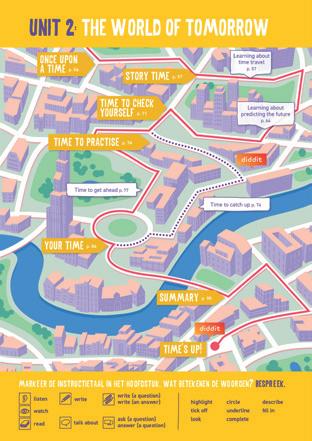
Het leerwerkboek bestaat uit 5 units.
Elke unit begint met een overzicht. Dat is de weg die jij tijdens de unit aflegt om de leerstof te verwerken.

Je start met Once upon a time Daarin maak je kennis met het thema van de unit.

In Story time kom je hier meer over te weten. In dat deel leer je vooral luisteren en lezen. Zo krijg je de nieuwe leerstof aangebracht.
In Time to check yourself controleer je een eerste keer zonder te studeren hoe goed je de leerstof onder de knie hebt. Je geeft zelf aan wat goed gaat en waarop je nog moet oefenen.
In Time to practise oefen je de leerstof in op jouw niveau. Afhankelijk van je resultaat ga je die herhalen (Time to catch up) of verdiepen (Time to get ahead ).
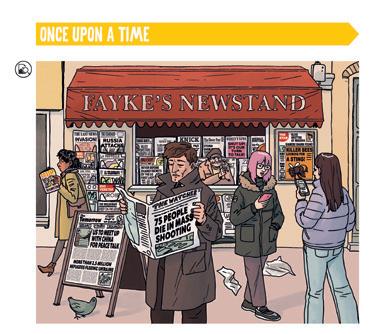
Daarna is het aan jou: Your time! Voor het eerst ga je de nieuwe leerstof gebruiken om zelf te vertellen en te schrijven.

In de Summary vind je een overzicht van de woordenschat, grammatica en veelgebruikte uitdrukkingen.
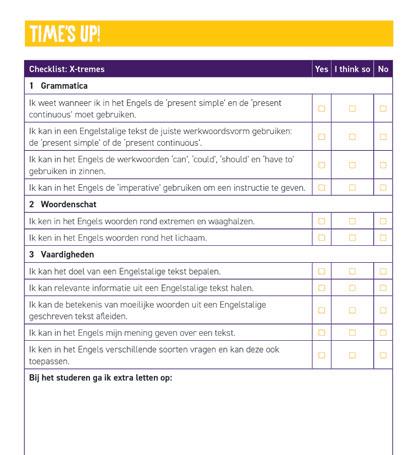
Op diddit vind je de pagina Time’s Up! Daarop kunnen jij en je leerkracht aangeven wat al lukt en waarop je nog moet oefenen. Zo weet jij waarop je extra moet letten bij het studeren.
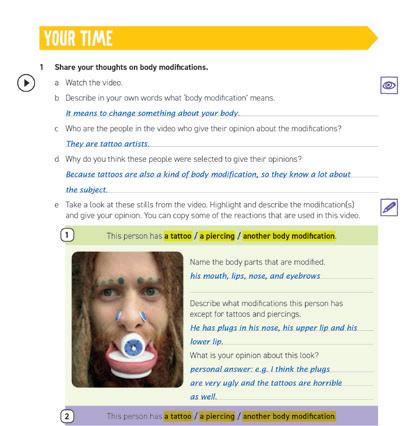
In de loop van elke unit word je ondersteund door een aantal hulpmiddelen.
Bij het begin van elke unit vind je een lijst met woorden die regelmatig terugkeren in de oefeningen van de unit.
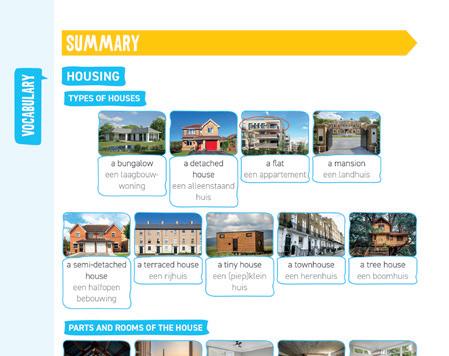
ask a question answer a question circle tick off highlight match complete
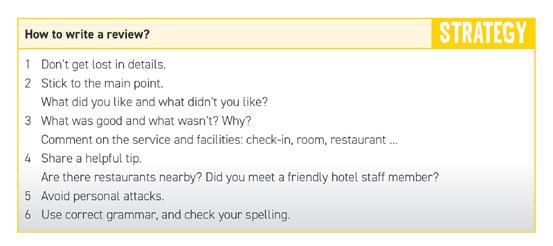
De gele kaders reiken strategieën aan.
Blauwe woorden zijn nuttig en kun je beter onthouden. Rode woorden verwijzen naar een grammaticaregel.
Grammaticale regels staan altijd in een grammaticakader, met een duidelijk voorbeeld erbij.
In de groene kaders vind je ‘useful expressions’ die je helpen bij functioneel schrijven of spreken.
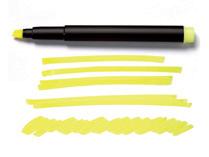
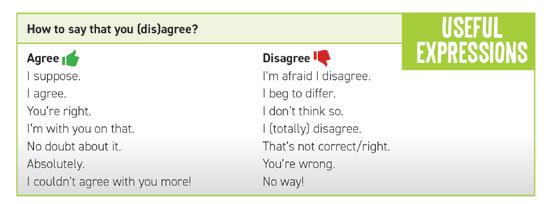
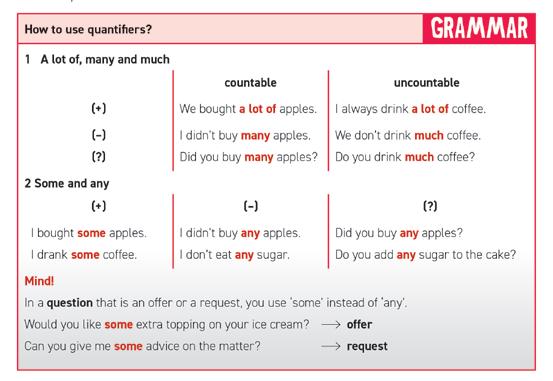
Vaardigheden zijn een belangrijk onderdeel bij het leren van een nieuwe taal. Daarom geven we bij oefeningen aan welke vaardigheid je oefent:
(listening) (watching) (reading) (writing) (speaking) (spoken interaction)
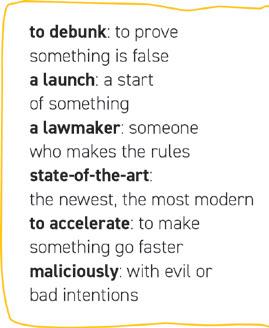
(written interaction)
Tijdens de unit krijg je regelmatig de kans om een check of checklist in te vullen. Daarin geef je voor jezelf en je leerkracht aan wat je al kunt en waarop je nog moet oefenen.
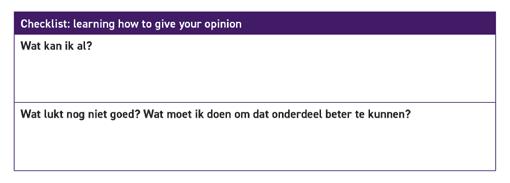
In elke unit duiken makkelijkere en moeilijkere oefeningen op. Je herkent ze aan deze pictogrammen:
makkelijker moeilijker
Wanneer je ze in de Story time of Your time ziet, kun je kiezen welk type oefening je maakt. Zo heb je je eigen leertraject mee in de hand!
Wanneer er moeilijke woorden voorkomen, worden die uitgelegd in de glossary
Dankzij de QR-codes in het boek, bekijk je makkelijk de instructiefilmpjes die je helpen bij het oplossen van de oefeningen.
Als je dit pictogram ziet, betekent het dat je online extra werkbladen met oefeningen vindt.
Dit pictogram betekent dat je online digitale oefeningen op de leerstof vindt.

De volgende pictogrammen helpen je nog een eind op weg:
Het luisterfragment dat hierbij hoort, vind je ook bij het onlinelesmateriaal terug.
Het beeldfragment dat hierbij hoort, vind je ook bij het onlinelesmateriaal terug.
Als je dit pictogram ziet, moet je iets online opzoeken.
Zie je dit pictogram voor een oefening staan? Dan kun je de leerstof terugvinden in de ontdekplaat.

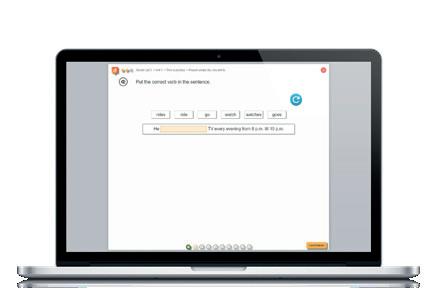
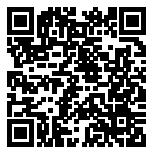

Materiaal
Hier vind je het lesmateriaal en de online-oefeningen. Gebruik de filters bovenaan, de indeling aan de linkerkant of de zoekfunctie om snel je materiaal te vinden.
Lesmateriaal
Hier vind je het extra lesmateriaal bij Buckle Up!, zoals video’s, audio’s, pdf’s en ontdekplaten.
Oefeningen
• De leerstof kun je inoefenen op jouw niveau.
• Je kunt hier vrij oefenen.
Opdrachten
Hier vind je de opdrachten terug die de leerkracht voor jou heeft klaargezet.
Evalueren
Hier kan de leerkracht toetsen voor jou klaarzetten.
Resultaten
Wil je weten hoever je al staat met oefenen, opdrachten en evaluaties? Hier vind je een helder overzicht van je resultaten.
E-book
Het e-book is de digitale versie van het leerwerkboek. Je kunt erin noteren, aantekeningen maken, zelf materiaal toevoegen ...
En waarom de woordenschat niet instuderen met de handige woordtrainerapp van Buckle Up! ?
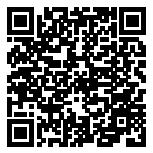
Meer info over diddit vind je op www.vanin.diddit.be/nl/leerling.
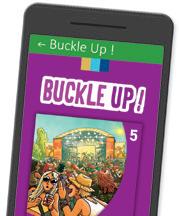
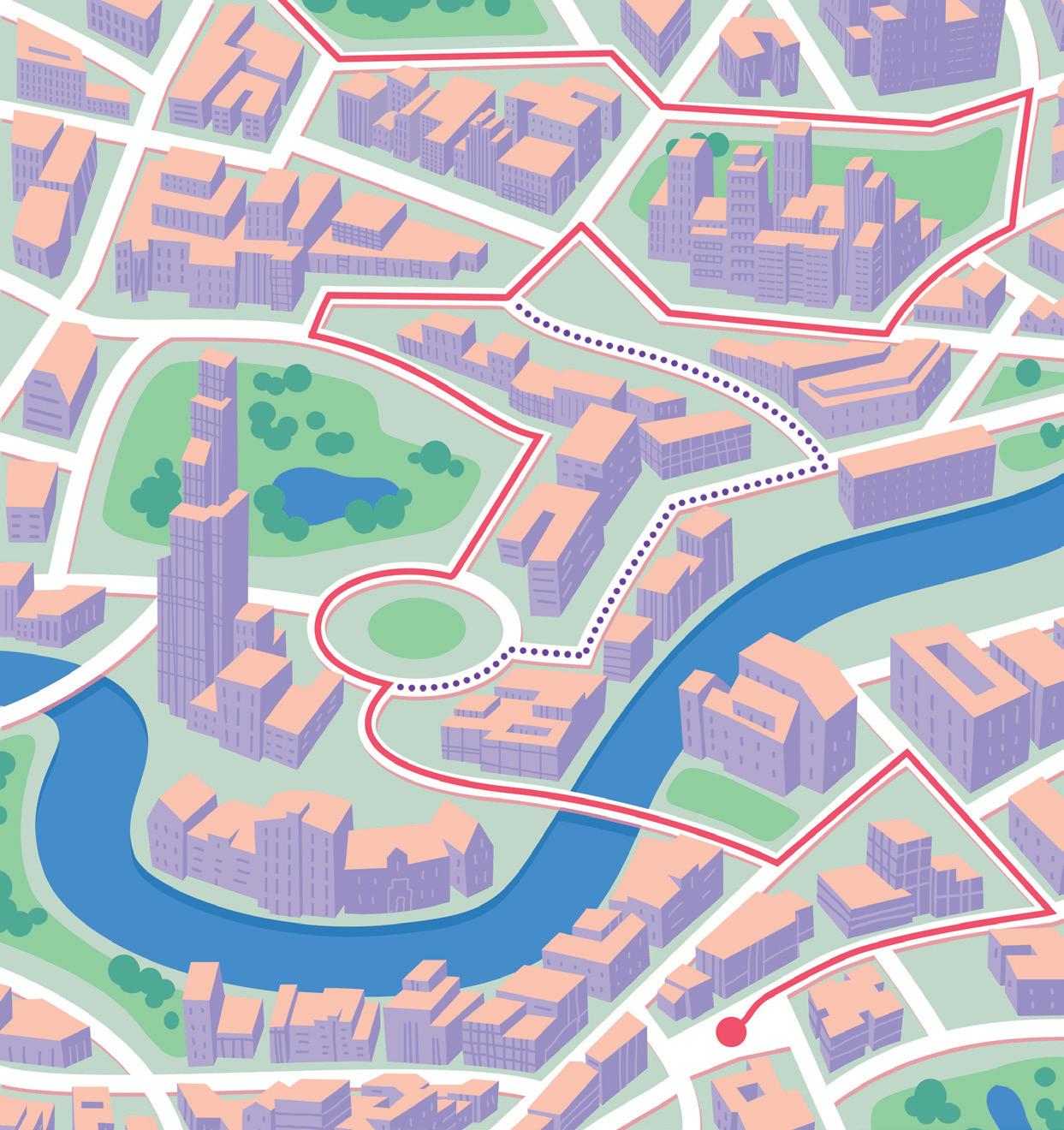
1 What do you see in the picture?
2 Which words that are related to the picture do you already know?
3 Watch the video. What do you want to learn about in this unit?
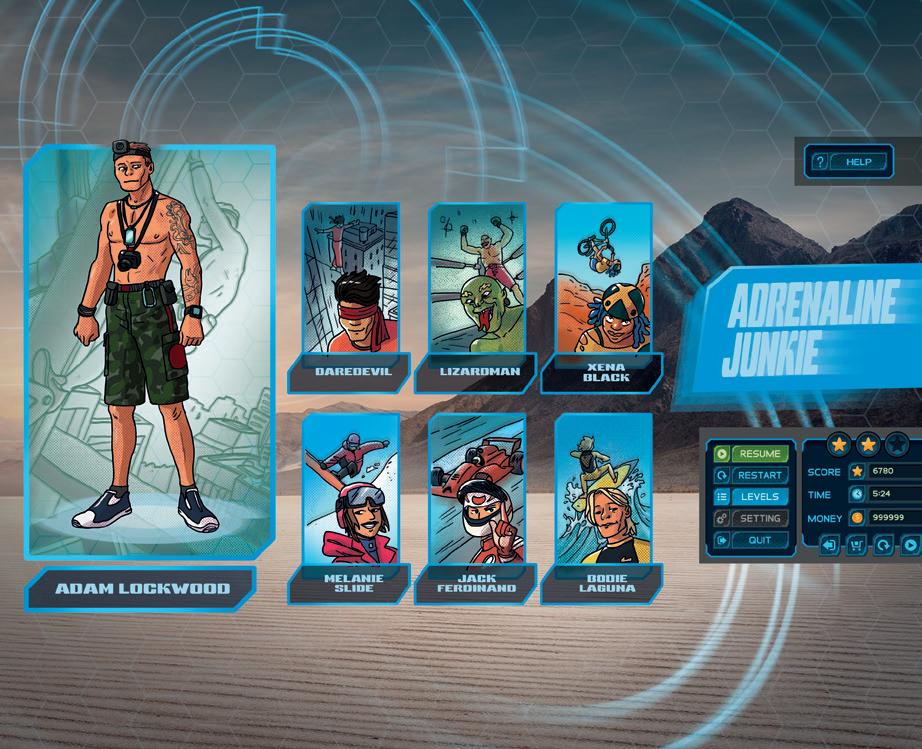
1 Read the newspaper article of The Guardian.
https://www.theguardian.com/world/2022/jun/30/briton-adam-lockwood-poses-workman-climb-crane-dubai
1 5
A British free climber was hanging at 390 metres (1,280ft) above Dubai without safety equipment after acting as a worker to gain access to the city’s tallest crane.

Adam Lockwood, 21, gained entry to a skyscraper, evading construction workers to reach the top, where he climbed the crane to hang from a metal bar with just one hand. Lockwood, from Manchester, said the experience had been “surreal” but also “almost peaceful”, as his “brain is blank” when he performs stunts – though he added he had “a few close calls” with his grip.
“When I first looked at the footage, I was thinking to myself: ‘This is it, this is the most incredible thing I’ve done’,” he said. “It’s something I know I can do and that 99 % of the world can’t and never will do, so I feel obliged to use my ability, and enjoy doing it in the process.”
The stunt was carried out at 5.45 a.m. on the crane on top of the 77-storey skyscraper, Il Primo, directly next to the world’s tallest building, the Burj Khalifa. In his seven-minute YouTube video, mostly filmed using a GoPro, he shows his hands, and splashes his hat with water to cool down in what he says was 45°C heat.
equipment: gear; things you need to gain entry: to force your way into a building or location to evade: to make sure someone doesn’t see you a construction worker: someone who makes buildings as a job a footage: a video, film obliged: when you have to do something
He later said he only realised the crane had been covered in invisible grease after climbing it. “At first I thought it was dust from the desert, but checking my hands it was grease, my feet and hands slipping on everything I touched.”
After being shouted at by a site worker, he pretended to be a construction worker who had forgotten something. He changed stairwells eight times over two hours to evade other workers. The video ends with him going on to the streets with a shocked expression, looking up at the enormous skyscrapers. He said he “slept for the whole day” afterwards
Lockwood has previously performed similar stunts. In April, he dangled from the 80-metre San Siro stadium in Milan, and later climbed the famous glass pyramid at the Louvre in Paris to take a selfie.

Adapted from: The Guardian
a What type of text is this?
similar: almost the same to dangle: to hang from something
a folder an article in a printed magazine an online article
b Describe the main idea of the text in one sentence.
c Why do you think he does this?
d Which word for a very large building is used in the text?
e Where is Adam Lockwood from?
f Why did Adam’s hands and feet slip on everything he touched?
g How did Adam evade the construction workers?
h Who can form the longest sentence? Use as many of these words from the text as you can.
above – after – also – but – to change – city – famous – feet – hands – tallest
i Have a look at these questions concerning the text. Look up the answers online.
1 390 metres is the same as 1,280ft. What does ‘ft’ stand for?
2 How many feet high is the San Siro Stadium in Milan (80 metres)?
3 In which country can you find the San Siro Stadium?
4 In which city can you find the Louvre museum?
j Read these reactions Adam got on YouTube. Do you agree with Trevor and V? Or would you rather side with Miss P? Why (not)?
Trevor
Can’t be arsed learning to do something truly impressive? Do this and show a complete disregard for the people who raised and love you. I’m a former nurse, I have seen the faces and tried to stem the endless tears of bereaved parents of young men who pushed their luck one too many times, heard their guttural howls as they learn the news for the first time, met them still grieving years later. If you love your folks, don’t do this to them. Narcissists of course love only themselves and this is at the heart of this and that’s sad.
Show less
12 Reply
3 replies Miss P
I beg to differ. I think looking for thrills is not the same as risking your life. If you have to be careful and safe all the time, you’ll end up missing out on a lot of exciting things. Reply
Omg that is someone’s son! If I EVER saw a video of my child behaving in such a life threatening way, I don’t care how old he is, he is definitely irresponsible enough to be GROUNDED. That is scary for anyone, especially a parent to watch.
3 Reply
1 Why do you think what Adam does is forbidden?
I think it’s forbidden because …
to side with: to agree with someone can't be arsed: (informal) not to want to make an effort
bereaved: grieving


a guttural howl: an intense crying sound folks: parents
a narcissist: someone who loves themself
a thrill: something that’s exciting
2 Write your opinion about one of the three reactions by Trevor, Miss P and V. Use the box to say whether you agree or disagree with someone.
3 Now talk about this with your neighbour. Say that you agree or disagree with each other and why. Use the box.
How to say that you (dis)agree?
Agree Disagree
I suppose.
I’m afraid I disagree. I agree. I beg to differ. You’re right. I don’t think so I’m with you on that. I (totally) disagree. No doubt about it. That’s not correct/right. Absolutely. You’re wrong. I couldn’t agree with you more! No way!
Check: reading Yes I think soNo
Ik kan vragen beantwoorden over een Engelstalig artikel rond gevaarlijke sporten en waaghalzen.
Ik kan in het Engels mijn mening geven over een onderwerp uit een geschreven tekst.
2 Match the words or expressions from the text of exercise 1 to their correct meaning.
3 Look at the interactive picture and discover the words related to extreme sports. Listen to the pronunciation and check the spelling.
4 Fill in the words about extreme sports in the correct sentences. If it’s a verb, you might have to conjugate it. afterwards – a brain – a building – to check – a desert – grease – shocked – to shout –a stunt
1 I have to go to class in a minute. We can talk some more
2 Oil and are very slippery substances.
3 In the there is a lot of sand.
4 You don’t have to . I’m not deaf!
5 The post office is right next to that giant
6 My mother always told me to use my so I wouldn't get into dangerous situations.
7 I love it when someone performs a . I just hope nobody breaks their neck.
8 At the beginning of each lesson the teacher always if everyone is present.
9 When I saw this video for the first time, I was ; I couldn't believe what I was looking at.
PLACE AND DATE OF BIRTH
Manchester, 7th June 2001
NATIONALITY
British
PROFESSION(S)
YouTuber, stuntman, climber

HEIGHT 5 feet, 8 inches
WEIGHT 85 kg
a What is happening in the clip? And what do you read in Adam's profile? Choose the correct verb form for each sentence.
1 In the clip Adam walks is walking through the San Siro stadium.
2 Adam films is filming himself in this video
3 Adam celebrates is celebrating his birthday on 7th June.
4 He checks is checking his gear each time before he climbs.
5 Adam has is having grey eyes.
6 Adam lives is living in Manchester.
7 In the clip Adam climbs is climbing the stairs.
b Which three sentences are about what is happening in the clip?
c Circle the verb form that is used for the sentences about the clip: the present simple – the present continuous
d Why are the sentences about the clip in this verb form?
e Circle the verb form that is used for the other sentences: the present simple – the present continuous
f Why is that verb form used for those sentences?
6 Do you remember when to use the present simple and the present continuous? Go to the interactive picture and watch the instruction video or scan the QR code to refresh your memory.
7 Complete the dialogue with the correct present tense form of the verb between brackets. Choose between the present simple and the present continuous.
Jack Ferdinand is a real daredevil. This means that he looks for thrills and doesn’t say no to anything. Now he has just bought an old Ferrari race car, but there seems to be something wrong with it. He returns to the car dealer, and tries to show him what is wrong with the car. Dealer So what's wrong with the car?
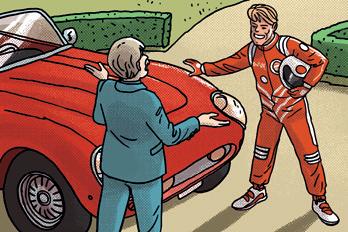
The engine (to sound) fine to me.
Jack You're not serious! Listen carefully, the engine (to make) strange noises.
Dealer That's not true. I
(to know) this model very well and that's the normal sound for this type of engine.
Jack I (not to agree). It should run smoothly, and it doesn't.
Dealer Well, if that's all that (to bother) you, I can ask the mechanic to look at the engine, if you (to want)?
Jack That's not the only problem. If you look underneath the car, you can see that the engine (to lose) oil.
Dealer I'm sorry. I (not to see) any oil on the ground. you (to see) any oil?
Jack Look! Over there! Oil (to drip) onto the floor.
Dealer Mr Ferdinand, I (to understand) that you are upset because the motor is not running smoothly, and I will certainly have that looked at, but there's no oil leak, as far as I can tell.
Jack Surely you don't think that I (to imagine) all this. you (to suggest) that?
Dealer No, I (not to suggest) that. But don't forget, it is an old car, and old cars usually (to burn) some oil.
Jack But not as much as this car. Just look at the colour of the exhaust. It's black. The engine (to burn) a lot of oil.
Dealer I don't think so, Mr Ferdinand. It simply (to mean) that the gasoline mixture is too rich. And we can easily adjust that for you. Is there anything else?
Jack Yes. It (not to look) like you believe me, so I would like to talk to the manager. Maybe he can give me satisfaction.
Dealer I am both the manager and the owner This business (to belong) to me. But trust me, my mechanic will repair anything that needs repairing.
Check: present simple or present continuous
Ik weet wanneer ik in het Engels de ‘present simple’ en de ‘present continuous’ moet gebruiken.
Ik kan in een Engelstalige tekst de juiste werkwoordsvorm gebruiken: de ‘present simple’ of de ‘present continuous’.
Yes I think soNo
8 Fill in the survey as honestly as you can. Circle the letter of your answer.
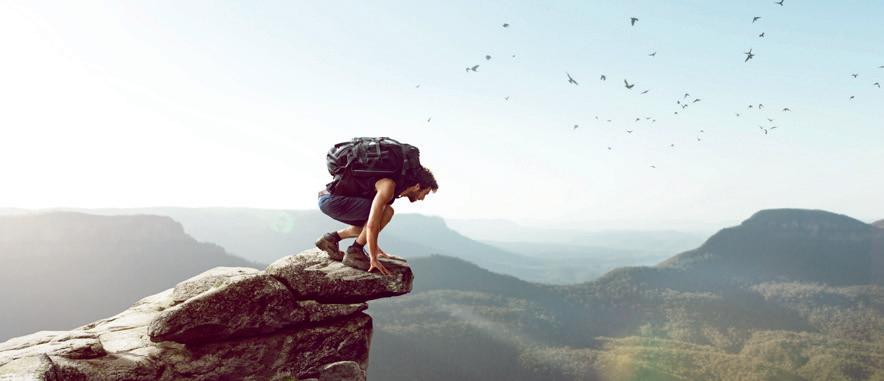
a Count and add the numbers next to your answers. Read the text below your result.
b Do you agree or not? Discuss with your neighbour.
Daredevil isn't really the best word to describe you. You much prefer to live on the safe side, which is absolutely fine! You're an intelligent person and are always aware of what's going on around you, so you are better able to see risk and behave with caution. Some might say that you are not chill, but you are just realistic about the dangers in the world and aren't prepared to play games when it comes to your safety. Even though you prefer to play it safe, you are still a ton of fun to be around, and people love how consistent and reliable you are!
Daredevil is your middle name! You are the brave one out of your group, and the one who's always ready to try something new. You love a challenge and don't let anything scare you. And on the strange occasion that something does actually scare you, you still push through it anyway – you never run away! You do get bored easily, and you need constant challenges to stimulate you and keep you entertained, so make sure you surround yourself with at least some like-minded people who want to grab the world by the horns just as you do.
9 Look at the poster of the series Daredevil and answer the questions.
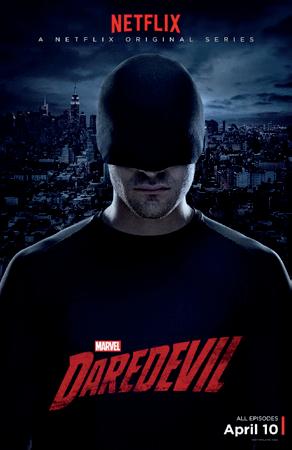
a Have you seen this series already? Do you know what it is about? Discuss in class.
b What is the main purpose of this poster? to give information to give an opinion to give instructions to entertain to activate
c Explain why you chose that purpose.
d Put the sentences in the correct order to read what the series is about. In the second season Murdock continues to balance life as a lawyer and Daredevil, while crossing paths with Frank Castle aka Punisher.
As a young boy Mark was blinded so he has no eyesight, but his other senses are a lot better than normal people.
The series is about Matt Murdock, who is a lawyer by day.
The criminal underworld of Hell’s Kitchen is being led by Wilson Fisk.
When he is an adult he becomes a superhero, called Daredevil, who fights crime on the streets of New York City’s Hell’s Kitchen neighbourhood.
In the third season Murdock has to decide between hiding from the world as a criminal lawyer and embracing his life as a superhero.
e Watch the trailer of the series.
f What is the purpose of the series? to give information to give an opinion to give instructions to entertain to activate
g Why do you think Netflix would want to produce a series with that purpose? Complete the answer. They want to
h Watch the trailer again.
i Why do you think they call the protagonist ‘Daredevil’?


j Be creative: what would your name be as a superhero?


k Would you like to see this series? Explain why (not). Yes, I would because
No, I wouldn’t because
How to give your opinion?
I think Daredevil is a great series.

I feel like there's a lot of action going on.
In my opinion all these people take too many risks.
If you ask me they should listen more to their parents.
The way I see it there can never be enough excitement in life.
Check: reading and watching Yes I think soNo
Ik kan een Engelstalige meerkeuzevragenlijst rond het thema waaghalzen begrijpen.
Ik kan het doel van de maker van een Engelstalige tekst bepalen.
Ik kan in het Engels een chronologische structuur herkennen en toepassen.
Ik kan in het Engels mijn mening geven over een beeldfragment.
10 You will watch a video about extreme sports.
a Answer the questions before you watch the video.
1 What kinds of regular sports do you remember from the previous years? Write them in the thought bubble.
2 What kinds of extreme sports do you already know? Write them in the speech bubbles.
b Watch the first part of the video.
c What is the main purpose of this video? to give information to give an opinion to give instructions to entertain to persuade
d What do you see in the first part of the video?
e Tick off the correct answer.
1 Can you do this with your bike? Yes, I can. No, I can’t.
2 Could you do this if you practised for a month? Yes, I could. No, I couldn’t.
3 Do you have to be flexible to do this kind of tricks? Yes, you do. No, you don’t.
4 Do you like watching this kind of videos? Why (not)? Yes, I do. No, I don’t. Because
f Now turn to your left or right, and discuss your answers with your neighbour. Did you have the same answers to the questions?
g Watch the second part of the video about heights.
h What do you feel when you watch this video?
i Give your opinion.
1 Do you think this is a sport? Why? Yes, I do. No, I don’t. Because
2 Do you agree or disagree with this statement? Why? ‘You have to be older than 18 years to try these stunts.’ I agree. I disagree. Because

3 Do you think this should be forbidden? Why? Yes, I do.
No, I don’t. Because
j Find a classmate who chose the other answer to the last question. Try to convince them why you think this should, or shouldn’t, be forbidden.
11 Look at the interactive picture and watch the video to discover how to use the verbs can, could, should, and have to.
The verbs can, could, should, and have to express a degree in which something is possible or not. You call these verbs modal verbs
TypeModal verbExample
ability can
- She can’t meet us tonight, because she is ill.
- I can go to the party, because I don’t have to work. no abilitycan’t, cannot
To emphasise:
- No, I told you before, I cannot go to the party because I have to work.
(asking) permission can could
- Hey Michael, can I use your pen? - Yes, you can
- You can’t use my pen; it’s mine.
More polite:
- Could you lend me some money, please? - No, I can’t adviceshould, shouldn’t
- You look really sick. I think you should see a doctor.
- You shouldn’t drive a car when you’re drunk. obligationhave to
- You have to take your medication or you’ll be sick. possibilitycan, could Stronger possibility:
- I can beat all my classmates at football; I’m very good at it.
Weaker possibility:
- I could beat them at football if I wasn’t injured.
12 Use the knowledge you gained in this unit and complete the sentences with the right modal verb form for the use in the blue box.
1 ability Adam Lockwood climb towers without equipment.
2 no ability Daredevil see.
3 permission You go to the party if you finish your homework first.
4 permission - you climb tall buildings without permission?
- No, you . The law says so.
©VANIN
5 advice (+) You look tired; I think you get some sleep.
6 advice (–) You smoke, as it can damage your lungs.
7 stronger you do a somersault without practising? possibility No, I
a somersault:
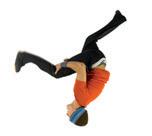
9 obligation When you go bungee jumping, you check your gear first.
10 obligation You bring your lunch for the school trip tomorrow.
11 possibility If she studies really hard, she be president one day.
12 possibility We go to the concert because we scored free tickets.
13 Watch the video and complete the sentences with the correct modal verb.
1 You drive up to a maximum speed of 120 km/hour on Belgian highways.
2 You drive this fast; it’s dangerous!
3 When you go flying through the air like this, you be very careful.
4 If you fell from such a great height, you really hurt yourself.
5 I really wanted to be a professional stuntman, but my father said I
6 Do you be an athlete to be able to perform tricks like these?
7 I remember standing next to a ramp and one of the guys who performed tricks with his scooter asked: ‘ you hold this for me?’ and he pushed the scooter against me.
8 Surfers be in the water before the big waves arrive.
9 I wonder: you do the same tricks with a snowboard as the guy in the clip?
10 You took a lot of surfing tutorials already and you still can't surf. You get a better teacher.
Do you want more practice? On diddit you can find extra practice materials.
Check: modal verbs Yes I think soNo
Ik kan in het Engels de werkwoorden ‘can’, ‘could’, ‘should’ en ‘have to’ gebruiken in zinnen.
Checklist: learning about daredevils
Wat kan ik al?
Wat lukt nog niet goed? Wat moet ik doen om dat onderdeel beter te kunnen?
1 Read the text about the origin of tattoos and piercings.

Ever thought about getting a tattoo on your ankle or shoulder? Or a piercing in your nose or ears? Tattoos and piercings have been enjoying a boom in the last few decades. So much so that they almost seem to be a new idea that suddenly became popular. This couldn’t be farther from the truth. Both tattoos and piercings have existed for decades and decades. How did these come to be? Here is a brief tattoo and piercing history.
Historical texts have suggested that almost all human cultures have practiced tattooing in historic times. However, for the longest time, it was believed that the earliest tattoos were from the Egyptians, dating back to 2000 BC. Later on, a 1991 discovery revealed the Iceman, with tattoos, who was around 5,200 years old. Essentially, this tells us that this art form is centuries old. From the 5th century, for example, ancient Greeks used tattoos to communicate among spies. Later on, the Romans used tattoos to mark criminals and people who were enslaved.
There is also evidence to show that the Inca, Maya, and Aztecs used tattoos in rituals, and the early Britons in ceremonies. The Saxons, Danes, and Norse are known to have tattooed family symbols on their bodies as well. Europeans also used tattoos to show their desire for a Christian burial if they died in battle. These tattoos were imprinted using different methods. One was a sharp point attached to a wooden handle, as discovered at the site of Abydos. In Gurob they also found small bronze instruments that look like flattened wide needles.
a decade: 10 years; also used to talk about ‘a long time’ brief: short to mark: to point out a burial: to put someone underground after someone dies a handle: something you can hold to expand: to make bigger
Just like tattoos, expanded ear piercings or stretched earlobes have been around for centuries. This is especially so for earlobes and the lower lip. Over the years, they found independent evidence of this in very different locations. These have included Asia, the Amazon, North America, Africa, New Zealand, and Polynesia.

The oldest piercing is said to be over 5,000 years old. A mummified body was found with expanded earlobes and pierced ears. The very first ear piercings found among ancient tribes were for magical purposes. The tribes believed that evil spirits and demons would be driven away by metal. So they wore metal earrings to keep them away. On the other hand, sailors would get piercings to improve their eyesight. Their earrings would also pay for their burials if their bodies were to washed up ashore. In other cultures, piercings were done by parents on their children in a ritual indicating puberty.
Some of the oldest piercings were found in Egypt, though there were some restrictions as well. For example, only the pharaoh was allowed a navel piercing. Anyone else found to have one would be executed. At around the same time, Mayans, Aztecs, and Indian Americans would pierce their tongues. This was a religious ritual believed to bring them closer to God.
Fast-forward to today, and tattoos and piercings all over the body have become normal. Luckily, we have more specialized tools to carry out the job today, and yes, a much wider range of jewellery to use as piercings.
Source: shininglight-piercing.com
to indicate: to mean a restriction: something that is forbidden
a Are tattoos and piercings something that has become popular recently? How do you know this?
b Who did tattoos around 2,000 BC?
c What does ‘BC’ stand for?
d What did these people use tattoos for?
1 the Romans:
2 the Saxons, Danes and Norse:
e How old is the oldest piercing ever found?
f Why did certain ancient tribes use piercings?
g Who was the only one allowed to have a navel piercing in ancient Egypt?

h Some words in the text look like Dutch words. What do they mean?
English words
Dutch words
Other languages to imprint (l. 28) to flatten, flat (l. 31)
ancient (l. 16) to execute (l. 50)
i Do you know the words in another language? Write them down and complete the grid.
j After reading the text, combine the words that match.
a way to express your personality
ancient cultures
k Discuss these questions with the class.
1 Do you have any piercings or tattoos?
2 Do you know if any of your teachers have tattoos?
the reason for a tattoo today
upper B the Aztecs, the Egyptians
a belly button
3 Are tattoos and piercings seen as taboo in our society?
2 Complete the text with these words from the text of exercise 1. Adapt the word to the sentence if necessary. Watch out: there are more words than you need. an ankle – a body – to carry out – an ear – an earlobe – human – jewellery – a navel –a nose – a piercing – a shoulder – a tattoo – a tongue
I think it’s crazy that the Aztecs pierced their I wouldn’t mind having a in my , or in my , but only when I’m old enough. I can’t have one before I’m 18 years old, my parents say.
I don’t think I will ever be allowed to get a though. My parents think injecting ink into your skin is dangerous. But if I can get one, I would put it right above my arm, on my , or just above my foot, on my
The rest of my is too painful, I think. When people are covered in tattoos, they don’t seem like actual anymore.
3 Look at the interactive picture and discover the words related to body parts.
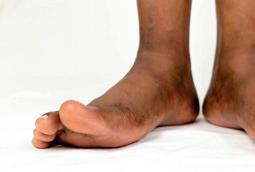
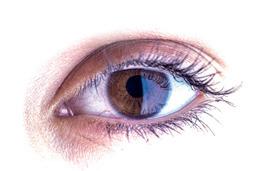




4 Do you know these body parts? Write the word underneath the picture.


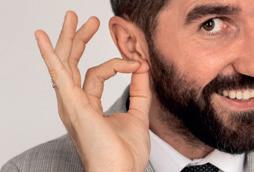
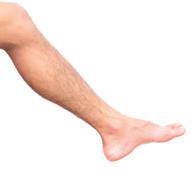








5 Read the rules. Play ‘Simon says’ using the words about body parts and the imperative. Do you remember how to use the imperative? Scan the QR code to refresh your memory.
Rules: Simon says …
1 Choose one person as ‘Simon’
2 Simon gives instructions using:
- the words about body parts;
- the imperative form of the verb.
3 If Simon gives an instruction by saying ‘Simon says …’, the other players must perform the instruction. If Simon leaves out ‘Simon says’ before giving the instruction, anyone who performed the activity is out.
Simon says touch your nose. Sit down.
6 Imagine you want to get a tattoo.
a If you decided to get a tattoo, where would you put it? On which body part?
b Draw your own tattoo design and show it to the rest of the class. Describe the meaning of your design.
Check: vocabulary ‘body parts’ Yes I think soNo
Ik ken in het Engels woorden rond lichaamsdelen.
Check: the imperative Yes I think soNo
Ik kan in het Engels de ‘imperative’ gebruiken om een instructie te geven.
7 You are going to watch a video about plastic surgery.
a Before watching, discuss these questions in class.
1 What is plastic surgery?
2 What reasons do people have to get plastic surgery?
b Watch the video and answer the questions.
1 Which body part did Elisa get plastic surgery on?
2 Why did she get plastic surgery?
3 Where in her body did Elisa get an implant?
4 How does Elisa feel after the surgery?
c Do you understand why Elisa chose to do plastic surgery?
1 Explain.
2 Discuss your answer in class.
8 Look at the following pictures of celebrities.
a Answer the questions.
1 Do you know this celebrity? Who is it?
2 Based on the pictures, what kind of plastic surgery do you think he had done?
He got new teeth. He changed his earlobes. He had a nose job
1 Do you know this celebrity? Who is it?
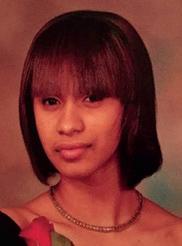
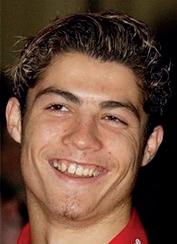
2 Based on the pictures, what kind of plastic surgery do you think he had done?

She had a breast augmentation. She had lip fillers.
She had a nose job

b Search on the internet for three more celebrities who did plastic surgery and fill in the grid.
Who?Male/Female/X?Body part(s)?Extra information?
c Cardi B also gave this reaction about her surgery. Read the excerpt.
‘All I'm going to say is that if you're young, if you're 19, 20, 21, and sometimes you're too skinny, and you result to ass shots, DON'T!’ (…) ‘When it comes to Brazilian Butt Lifts, if you want advice from me, before you get your BBL done you have to make sure your blood levels are all right,’ she added. ‘If a doctor says your blood levels are too low, or you have diabetes or whatever, don't do it.’
d Which two pieces of advice does Cardi B give? Write them down using a modal verb.
1 About ass shots:
2 About a BBL:
e The journalist who wrote the article ended the article with the following statement. Discuss it in class.
A good reminder: Putting off surgery to do more research is way less work than getting surgery and then needing another procedure to have it reversed. Thanks for your honesty, as always, Cardi B!
Check: watching and reading Yes I think soNo
Ik kan vragen beantwoorden bij een Engelstalige gesproken tekst rond lichaamsdelen en plastische chirurgie.
Ik kan in het Engels mijn mening geven over een tekst rond lichaamsdelen en plastische chirurgie.
Checklist: learning about body parts and body modification
Wat kan ik al?
Wat lukt nog niet goed? Wat moet ik doen om dat onderdeel beter te kunnen?
1 Watch the video of Adam Lockwood where he climbs the San Siro stadium. Fill in the missing words about extreme sports.
1 Adam isn’t scared of anything. He’s a real
2 He isn’t afraid of heights at all, he likes to
3 The San Siro is a football stadium so it’s a very tall
4 Adam (to carry out) as many as he can.
5 What Adam does is so dangerous … I think he’s insane in the
6 Climbing buildings can be very dangerous as metal can be (to cover) in
7 All he wants to do by climbing the San Siro stadium is to people. He wants to scare them.
ex. 1 Ik kan in het Engels woorden gebruiken rond gevaarlijke sporten. Yes I think soNo
Time to catch up? ex. 1 Time to get ahead? ex. 5
2 Fill in the present simple or the present continuous. Use the positive, negative or question form.
1 (he, to eat) rice every day?
2 I (to work) at the moment.
3 He (to play) tennis now.
4 They (to eat) at a restaurant every Sunday.
5 They (not to go) to the cinema very often.
6 I always (to fall asleep) around 10 p.m.
7
8
(why, you, to move) so weirdly?
(you, to dance) or what is that supposed to be?
9 Sophie and Julia (not to shop) at the moment, they're having a drink.
10 (when, he, to arrive) in Brussels?
I can't wait to show him around town.
ex. 2 Ik kan in het Engels in een zin de juiste werkwoordsvorm gebruiken: de ‘present simple’ of de ‘present continuous’. Yes I think soNo
Time to catch up? ex. 2 Time to get ahead? ex. 6
3 Use the correct modal verb in these sentences: can, could, should, or have to.
1 When you go to the doctor, you make an appointment first.
2 She speak several languages. She’s multilingual.
3 If you want to lose weight, you stop eating fast food.
4 I borrow your pen, please?
5 If you keep driving like this, you cause an accident.
ex. 3 Ik kan in het Engels de werkwoorden ‘can’, ‘could’, ‘should’ en ‘have to’ gebruiken in zinnen. Yes I think soNo Time to catch up? ex. 3 Time to get ahead? ex. 7
4 Read the conversation between Luke and Sita. Fill in the correct parts of the body.
Luke Hi Sita, are you coming to the party at Achraf’s place tonight?
Sita Yes, of course! You know we have to dress up, right?
Luke I do! I wanted to go as a clown but I think the big red gets very annoying after a while ...
Sita Yes, I can imagine that’s true. First I thought about dressing up as a pirate and putting a parrot on my , but then I realised that wearing a fake on my chin would not be easy when I want to have a drink. I’m sure my would start to itch after a while as well.
Luke That’s true. I might act as if I’m missing one of my on my hand. I’d love to see the look on Achraf’s when I give him a hand.
Sita Haha, that’s an amazing idea. I will ask my mother if she can help me look as if I fell on my arm. I can use a fake bone that sticks out of my , so right between my upper arm and forearm. I can put some fake in my mouth as well.
Luke Sita, you’re a genius. I’m sure we’ll look awesome tonight.
Sita I’ll see you there, Luke!
ex. 4 Ik kan in het Engels woorden gebruiken rond lichaamsdelen. Yes I think soNo Time to catch up? ex. 4 Time to get ahead? ex. 8
Ready? Tick off the exercises you have to do on page 35-42.
time to catch up
1 Can you find the correct word about extreme sports?
a Put the words in the correct sentences.
stunt 1
desert 2 climb 3
shock 5 buildings
When he was younger, he was never afraid of heights. He would climb the highest ...
We got lost in the … with no water or food. We almost died. Children love to … trees.
In the film, the actor had to do a … by crashing his car into a moving truck. This horror film is about nothing really. It just wants to … the people who are watching it.
b Which word fits the definition? Fill in the crossword puzzle and find the hidden word.
ACROSS
1 to count up: to
4 something that is above normal:
6 to hide: to
7 football, basketball, swimming … are:
8 to go up: to
9 to talk very loudly: to DOWN
1 not entirely:
2 oil:
3 someone who is well known:
5 the grey cells in your head: your
8 a town: a
Score ex. 1 < 12
123456789
>/= 12
Well done!
2 Watch the video about the Bull Runs in Pamplona. Read the sentences and fill in the present simple or present continuous (ing-form) of the verb.
1 In the video you can see that the bulls (to run) through the streets of Pamplona.
2 The San Fermin festival in Pamplona (to be) very famous.
3 The festival (to happen) every year in July.
4 You can also see in the video that people (to fall) on the ground.
5 Every morning of the festival you can (to see) adrenaline junkies who are running alongside, or in front of, the bulls.
6 The bulls (to weigh) up to 1,300 pounds or 590 kilograms.
7 The festival (to promise) nine days of partying.
8 My girlfriend and I (to plan) a trip to Pamplona.
9 It (to be) a dream of mine to see the bull run in real life.
10 In his book The Sun also Rises, Ernest Hemmingway (to write) about the bull runs.
Score ex. 2 < 6 >/= 6
Well done!
3 Watch the clip from the film Liar Liar and fill in the right modal verb. Look at the hints in front. Choose between: can, could, should, and have to.
1 obligation Fletcher is a lawyer. He works a lot in court. Everybody in court swear to tell the truth, but Fletcher doesn't care about that.
2 no ability Fletcher's son wishes that his father tell any lies.
3 ability Fletcher only tell the truth from now on.
4 request (polite) The homeless man asks Fletcher: ‘ you spare some change, mister?’
5 possibility Jim Carrey is an amazing actor. He play any role in any film.
6 advice (–) You tell the truth all the time. Sometimes it’s better to tell a little white lie
Score ex. 3 < 4 >/= 4
Well done!
See p. 24
HOW TO?
a white lie: a small lie you tell to avoid hurting anyone’s feelings
4 Look at this man. Fill in the correct body parts.
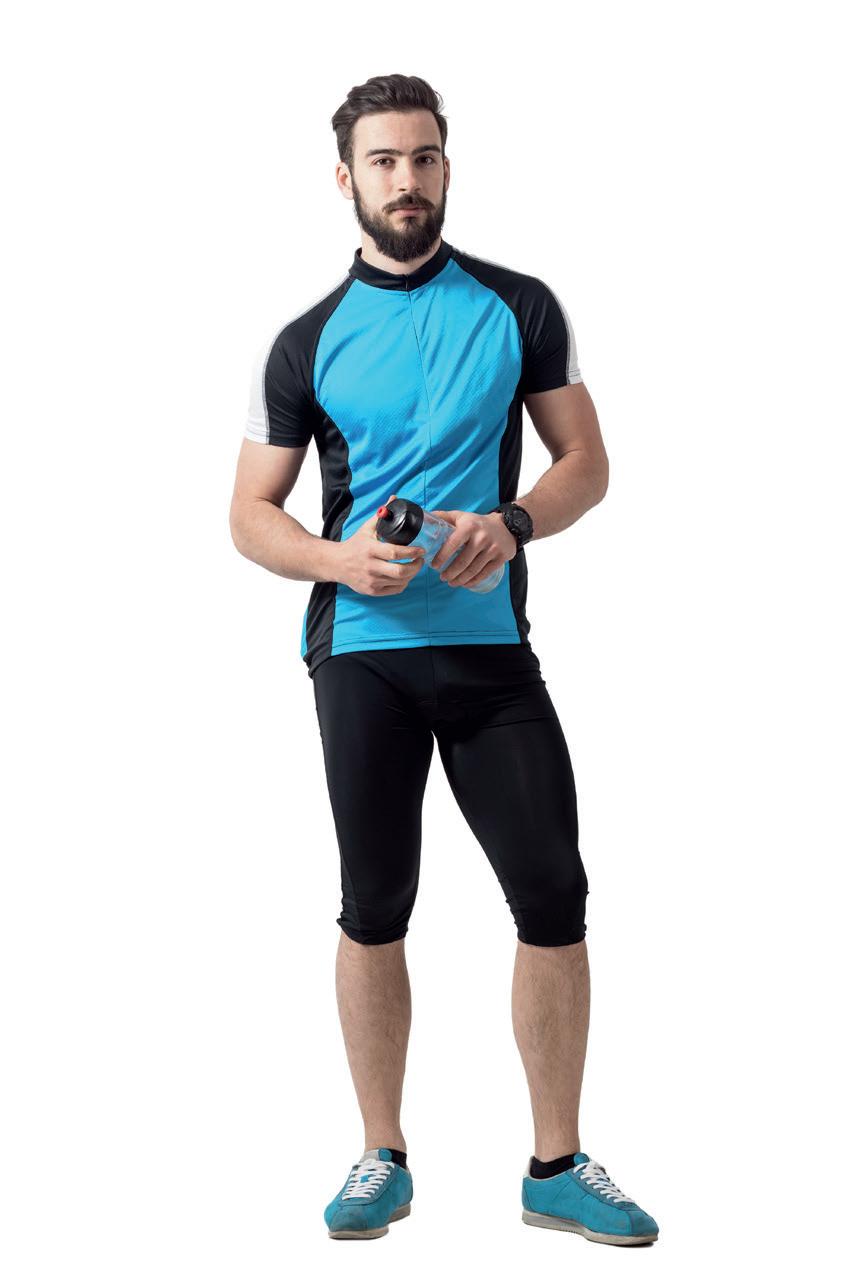
Score ex. 4 < 6
>/= 6
Well done!
5 Would you like to be a stuntman? Read the text and complete the sentences with the missing words. You may have to conjugate or adapt words. to attack – a crash – dangerous – an explosion – to fall – a location – a period – safety –a scene – a stunt – weather
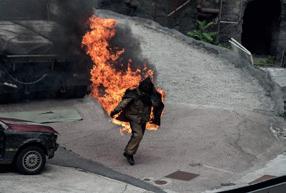
A stuntman (or stuntwoman) often fills in for the star of a film or television show, performing dangerous such as getting into car , fires or fights. The stuntman is rarely filmed up close, and seldom stars in the film or show. They are usually the real movie heroes, taking the gunshots, the punches, or off bridges or the tops of buildings. Some of the early stunt work took place in cowboy and western films, where stuntmen fell off of roofs during big gunfight , or were dragged behind a horse through the streets with their boot caught in a stirrup.
It is not unusual to see a stuntman being by animals, jumping off a bridge, strapped onto an airplane wing, taking a punch, or involved in an or fire. There is a risk in all stunt work, whether it be for television, film or stage work. Sometimes the stunts, while looking extremely dangerous, are rigged with mechanisms. In filmed productions, these mechanisms can be edited out. On the other hand, some stunts are as as they appear.
A stuntman works on wherever the movie or television show is being filmed. You may have to work from 4 a.m. to 11 p.m. and then get up at four again the next morning. A stuntman's work is done in all types of , most likely outside. This line of work can take you to many different places in the world, and can take you away from home for long of time.
Adapted from: careerexplorer.com
a Does this look like the perfect job description for you? Why (not)?
b Take an online career test.
c Do you agree with the job(s) that came out of the test? Why (not)?
d Discuss with your neighbour what your dream job would be and why.
6 Watch the video about the Bull Runs in Pamplona. Then answer the questions.
a Describe the main idea of the video in one sentence.
b Why do you think people want to do this?
c Describe what is happening in the video. Use the correct present tense.
d When does this event happen? Search the internet.
e In which country is Pamplona?
f Write down three facts about the Bull Runs in Pamplona. You may search the internet. Use the correct present tense.
e.g. Every year a lot of tourists visit the event.
e.g. Most participants wear white trousers and a white shirt.
e.g. The Bull Runs start at 8 a.m.
g Search the internet for another dangerous festival. Complete the grid.
What? Where? When?
h Tell a classmate about the festival you found. Make sure you can tick off these boxes:
Check yourself
I described what the festival is and what happens during the festival.
I described when and where the festival is held.
I summed up the rules of the festival. I could answer additional questions about the festival.
7 Pick your comic.
a Look at these three comic drawings. Based on the drawings, which comic would you like to read? Why?
I choose comic because
b Examine the following three panels (boxes) of the comic book you chose. They show the part of the story before the panel in exercise a. Think about what could have happened and fill in the speech bubbles.
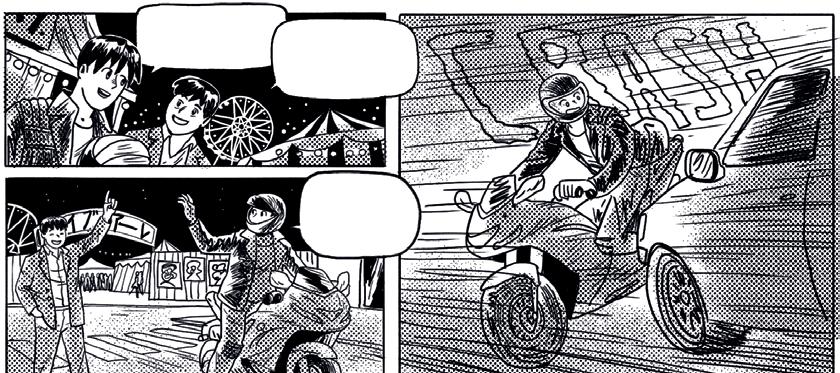
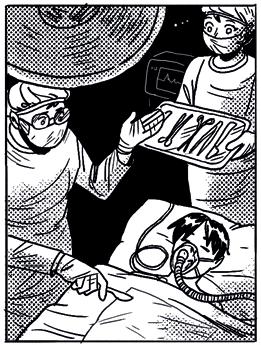
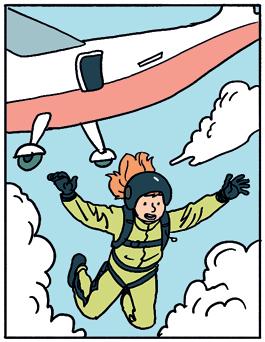
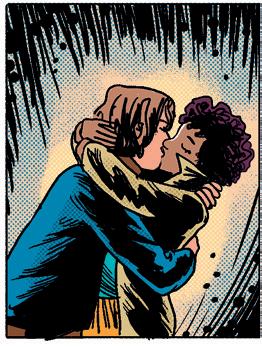
c If you have finished, you may also fill in the text for the other two comics.
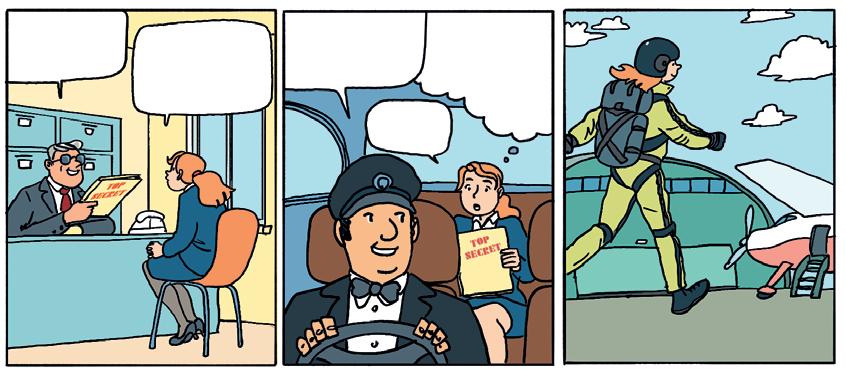
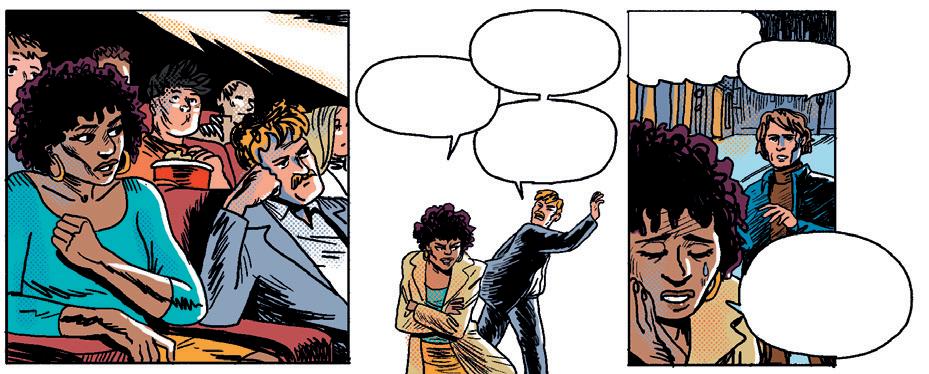
d Based on the drawings from exercise a and b, make up what the entire comic book is about, and write a short content description. Write five sentences in which you use at least three of these verbs: can, could, should, and have to.
e Discuss the comic you chose with your neighbour, and what you think it is about. Do you agree with each other?
8 Search the video for training exercises that look interesting. Don’t watch the entire video!
a Take notes about a couple of interesting exercises.
b Design your own two-minute full body workout without equipment. You need at least five different exercises. You can do some extra research on the internet. Make sure you point out the correct body parts and muscles.
Which exercises will you do?
Which body parts have to be used?
Which muscles will you train?
c Teach the rest of your class how to do this workout as a warm-up.
1 Share your thoughts on body modifications.

a Watch the video.
b Describe in your own words what ‘body modification’ means.
c Who are the people in the video who give their opinion about the modifications?
d Why do you think these people were selected to give their opinions?
e Take a look at these stills from the video. Highlight and describe the modification(s) and give your opinion. You can copy some of the reactions that are used in this video.
Name the body parts that are modified.
Describe what modifications this person has except for tattoos and piercings.
What is your opinion about this look?
Name the body parts that are modified.
Describe what modifications this person has except for tattoos and piercings.
What is your opinion about this look?

Name the body parts that are modified.
Describe what modifications this person has except for tattoos and piercings.
What is your opinion about these modifications?
Name the body parts that are modified.
Describe what modifications this person has except for tattoos and piercings.


What is your opinion about these modifications?
f Now have a discussion with your classmates. Say if you (dis)agree with each other.
2 Interview a classmate about their thoughts on the topic of this unit.
a Answer these short questions first.
1 Who will be your partner?
2 What will you interview your partner about?
extreme sports
tattoos and piercings
plastic surgery
3 What do you really want to know about your partner on this specific subject?
I would like to know the answer to this question:
See p. 14
b Have a look at the different kinds of questions you can ask.
- Do you like motorbikes?
- Do you think you are a daredevil?
- Would you ever have plastic surgery?
yes-no questions
- Yes, I do. / No, I don’t.
- Yes, I would. / No, I wouldn’t.
- How do you feel about being a daredevil?
- What’s your parents’ opinion about tattoos?
- If you would get a tattoo, where on your body would it be?
open questions
- I (dis)like …








- In my opinion …
- My parents think that …
- What would you choose: skydiving or bungee jumping?
- Would you prefer a tattoo on your neck or a tattoo on your shoulder?
questions of choice
- If I have to choose, …
- I would (definitely) choose …
- Why did you choose to have a tattoo on your arm?
- Why are you against plastic surgery?
motivational questions
- I chose to have a tattoo on my arm because …
- I am against plastic surgery because …
c Write down at least five questions for your interview. Make sure to use at least three different kinds of questions that are mentioned in exercise b. Be prepared to ask extra questions, to get a better answer to your main question.
Question 1:
Question 2:
Question 3:
Question 4:
Question 5:
Question 6:
Question 7: Question 8:
d Do the interviews in front of the classroom. Switch with your partner to become the interviewee.
Check yourself: interviewer
I asked at least five questions.
I used at least three different kinds of questions.
Check yourself: interviewee
I understood the questions my classmate asked me.
I was able to answer my classmate’s questions.
I asked extra questions to get a better answer.
I got an answer to the main question that I wrote down.
e Evaluate one or more interviews of your classmates. Use the evaluation sheet that your teacher gave you.
3 Invent your own extreme sport.
a Follow the steps to come up with an idea. Step 1: Go sit in groups of three.
Step 2: Brainstorm for four minutes. Write down all the words and ideas for different types of extreme sports on a piece of paper Step 3: Choose one idea.
b Answer the questions:
- Answer question 1 and 2 together.
- Divide the other six questions, so each of you has to answer two of them. Write down the name of the student who’s answering the question between brackets.
- Look at each other’s answers. If necessary, make some changes to the answers so everything makes sense.
1 What’s the name of your sport?
2 Explain your sport in one sentence.
3 In what way is the sport extreme? ( )
4 How many people can do it together? ( )
5 Where can you play it? (inside, outside, on grass …) ( )
6 What materials do you need? ( )
7 What do you need to wear? ( )
8 What are the (most important) rules? ( ) Use the imperative to write them down.
c Present your sport in front of the class. Make sure you can visualise it by drawing out a plan in Paint, or by acting it out in front of the class.
Checklist: your time
Ik kan in het Engels mijn mening geven over ‘body modifications’ en daarbij gebruik maken van de woordenschat rond lichaamsdelen.
Ik kan in het Engels gericht op zoek gaan naar informatie op het internet.
Ik kan in het Engels verschillende soorten vragen stellen in een interview.
Ik kan in het Engels een interview afnemen van een medeleerling.
Ik kan in het Engels antwoorden op de vragen in een interview.
Ik kan in het Engels een extreme sport presenteren.
Wat kan ik al?
Wat lukt nog niet goed? Wat moet ik doen om dat onderdeel beter te kunnen?
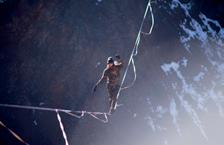
a building een gebouw

to check controleren a city een stad

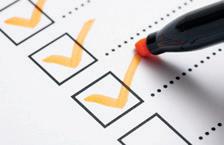
to climb klimmen

to cool down afkoelen

to cover bedekken
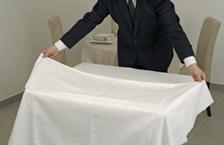
a daredevil een durfal
a desert een woestijn
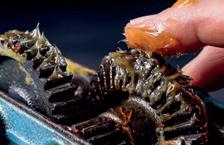

grease vet to shock choqueren
to shout roepen, schreeuwen a sport een sport a stunt een stunt




WordsTranslation My notes to addtoevoegen, nog iets zeggen
afterwardsnadien almostbijna to carry outuitvoeren extremeextreem famousberoemd
an ankle een enkel a back een rug a beard een baard a brain een brein a cheek een kaak, wang




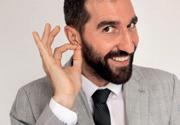


an ear een oor an earlobe een oorlel an elbow een elleboog an eye een oog an eyebrow een wenkbrauw a face een gezicht a(n index) finger een vinger a foot, feet een voet, voeten a hand een hand jewellery juwelen











a knee een knie a leg een been a lip een lip

(an) upper (lip) (een) boven(lip)



(a) lower (lip) (een) onder(lip) a moustache een snor


WordsTranslation My notes
a bodyeen lichaam

humanmenselijk
plastic surgery

plastische chirurgie




Singular
(+)
Long form (–) Short form (–)
2 You play football. I do not speak French. You do not play football.
1 I speak French.
I don’t speak French. You don’t play football.
Plural
3 Joe likes cats. Mum has a car. Pizza tastes good.
1 My dad and I live in York.
2 You both love music.
3 Ed and Ann have children.
Rule
• With I, you, we and they: base form
• With he, she and it: base form + s
He does not like cats. She does not have a car. It does not taste good.
We do not live in York. You do not love music. They do not have children.
• With I, you, we and they: do not + base form
• With he, she and it: does not + base form
He doesn’t like cats. She doesn’t have a car. It doesn’t taste good.
We don’t live in York. You don’t love music. They don’t have children.
• With I, you, we and they: don’t + base form
• With he, she and it: doesn’t + base form
What should I order?
I always order the steak and fries.
Not me! On Friday I usually eat fish.
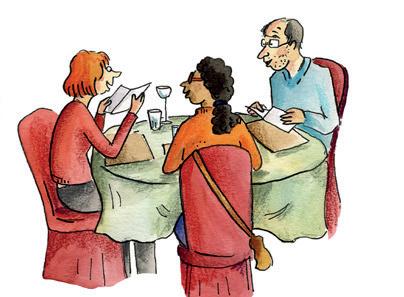
1 Yes-no questions
Question
Do I sleep a lot?
Do you sleep a lot?
Does he sleep a lot?
Do we sleep a lot?
Do you sleep a lot?
Do they sleep a lot?
Short answer
Yes, you do No, you don’t
Yes, I do No, I don’t
Yes, he does No, he doesn’t
Yes, we/you do No, we/you don’t
Yes, we do No, we don’t
Yes, they do No, they don’t
Rule: Do/Does + subject + base form (+ rest of the sentence) + ?
Singular
Plural
With ‘to be’
Why am I here?
How long is the flight to Japan?
Where are my shoes?
(You are here) because you live here. (The flight is) about 15 hours. (They are) in your room.
Rule: WH-word + a form of to be + subject (+ rest of the sentence) + ?
With other verbs
Where do I sleep?
How does she do it all alone?
When do they leave for Japan?
(You sleep) in the tent. Sam helps her a lot. (They leave) on Monday.
Rule: WH-word + do/does + subject + base form (+ rest of the sentence) + ?
Who stays home alone?Sam stays home alone.Sam does
Rule: Who + verb in 3rd person singular (+ rest of the sentence) + ?
1 I am looking in the shop
2 You are paying for the hat.
3 He is buying a hoodie She is walking in the park. It is raining
1 We are talking to the clerk.
2 You are trying on clothes.
3 They are asking for help.
I am not looking in the shop You are not paying for the hat.
He is not buying a hoodie She is not walking in the park. It is not raining
We are not talking to the clerk. You are not trying on clothes. They are not asking for help.
Rule a form of to be + base form + ing a form of to be + not + base form + ing
You can also use the short form of the verb to be. Mind!
to take Mum is taking her time. to shop Olivia is shopping to lie We are lying on the floor. to travel They are travelling to picnic Thomas and Laura are picnicking
1 Yes-no questions using the present continuous Question
Am I asking for help?
Are you looking at skirts?
Short answer
Yes, you are. No, you aren’t.
Yes, I am. No, I’m not.
Is it raining?
Are we leaving soon?
Are you walking around?
Are they trying on clothes?
Yes, it is. No, it isn’t.
Yes, we/you are. No, we/you aren’t.
Yes, we are No, we aren’t
Yes, they are No, they aren’t
Rule: a form of to be + subject + base form + ing (+ rest of the sentence) + ?
2 WH-questions using the present continuous Question Answer
What am I doing? You are dreaming.
Why is she doing that? Because nobody else is doing it.
Who are we meeting? (You are meeting) the new neighbours.
Rule: WH-word + a form of to be + subject + base form + ing (+ rest of the sentence) + ?
3 Asking for the subject using the present continuous Question Answer
Who is doing it? Sam is.
What is going on? The boys are fighting.
Rule: Who/What + is + base form + ing (+ rest of the sentence) + ?
Present simple
Present continuous
©VANIN
You use the present simple for habits, routines, jobs and facts.
You use the present continuous for actions you are doing now. a habitSam always goes to the skatepark. I am reading this text right now
a routine Every morning I eat cereal. a factDario is a boy. a job or a hobby Mr Reed teaches English. Wilson plays chess.
My teacher is teaching grammar at the moment of speaking
Imperative (–) to break to cut to cook
Infinitive Imperative (+)
Break the eggs. Cut the vegetables. Cook the pasta.
Don’t break the eggs. Don’t cut the vegetables. Don’t cook the pasta. Rule: use the base form use don’t + base form
The verbs can, could, should, and have to express a degree in which something is possible or not. You call these verbs modal verbs
verb Example ability can
- I can go to the party, because I don’t have to work. no abilitycan’t, cannot
(asking) permission can could
- She can’t meet us tonight, because she is ill.
To emphasise:
- No, I told you before, I cannot go to the party because I have to work.
- Hey Michael, can I use your pen?
- You can’t use my pen, it’s mine.
More polite:
- Yes, you can
- Could you lend me some money, please?
- You look really sick. I think you should see a doctor.
- No, I can’t adviceshould, shouldn't
- You shouldn’t drive a car when you’re drunk. obligationhave to
Stronger possibility:
- You have to take your medication or you’ll be sick. possibilitycan, could
- I can beat all my classmates at football; I’m very good at it.
Weaker possibility:
- I could beat them at football if I’m not injured.

I suppose. I agree.
I'm afraid I disagree.
I beg to differ.
You're right.
I'm with you on that.

No doubt about it.
Absolutely. I couldn't agree with you more!
I think Daredevil is a great series.



I don't think so.
I (totally) disagree.
That's not correct/right.
You're wrong. No way!
I feel like there's a lot of action going on.
In my opinion all these people take too many risks.
If you ask me they should listen more to their parents.
The way I see it there can never be enough excitement in life.

1 What do you see in the picture?
2 Which words that are related to the picture do you already know?
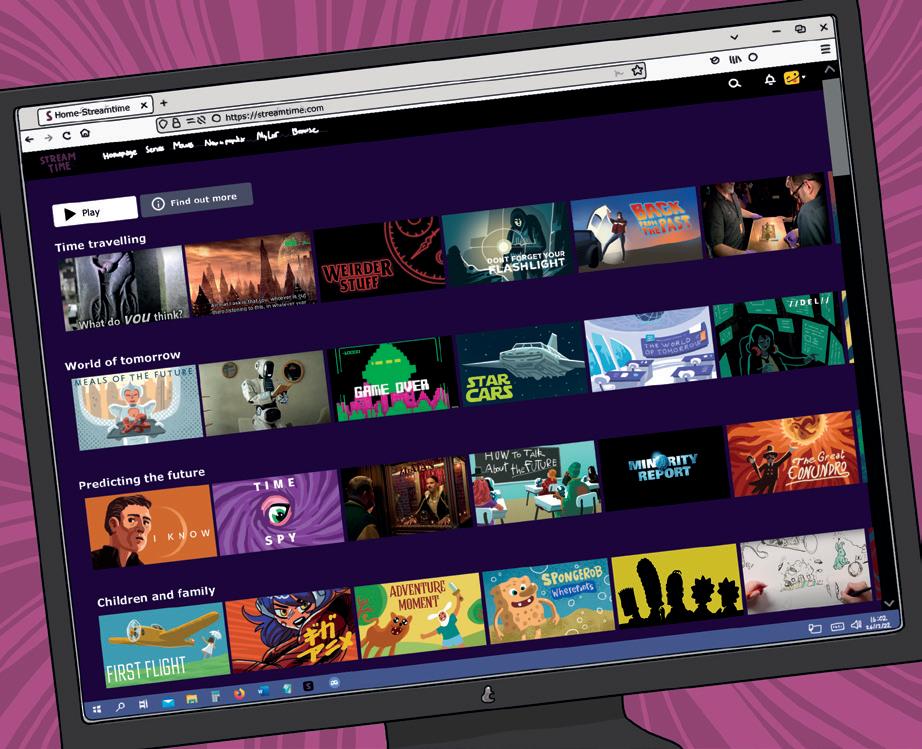
3 Watch the video. What do you want to learn about in this unit?
1 You are going to listen to an audio clip.
a Before listening, look at the title of the clip under exercise c. Describe the main idea of the audio clip in one sentence.
b Listen to the audio without reading along.
1 Tick off the purpose(s) of this audio clip. to give information: to give an opinion: to give instructions: to entertain: to persuade: to activate:
2 Why do you think that’s a purpose of the clip? Write your motivation next to the purpose.
c Listen to the audio clip again and follow along with the tape script. While reading along, highlight the words that you don’t understand.
1
We at Apex TV were recently sent an email containing this audio file.
5 10
“Hello Apex TV, my name is Daryl Dean and what I'm about to say is going to be very hard to believe for a lot of people. All that I ask is that you, whoever’s out there listening to this, and whatever year you happen to be in, keep an open mind
My natural year is the year 2033. In 2028 time travel is released to the public, and humans have the ability to travel into both the future and the past. I'm going to be in the year 2018 very briefly, and while I'm here, I wanted to send you this in an effort to tell the general public what the future holds.
I'm 27 years old, and was born in 2006. I still remember when time travel was released to the public: it was huge! It was around the same time when the existence of aliens was also revealed I want to walk you through some of the things that are going to happen.
the existence: the presence to reveal: to show
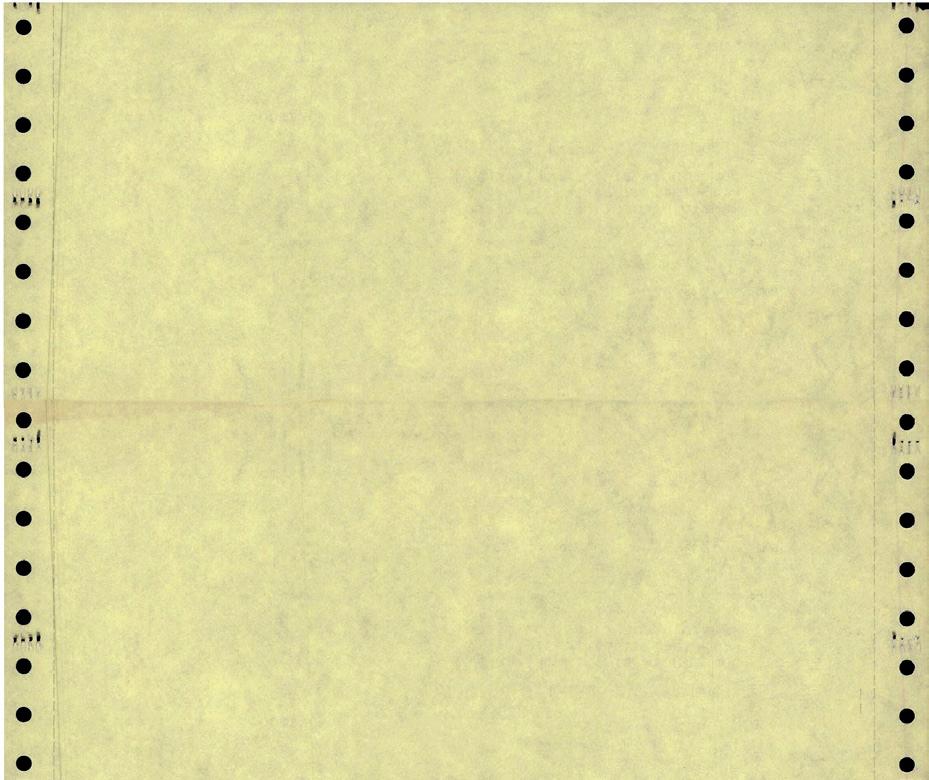
When I was 15 years old, in the year 2021, there's going to be a chip released that allows your brain to become, on average, six times more powerful than it normally is. It's because this chip allows your brain to access the internet, and there is free Wi-Fi in the future that covers the entire planet The brain chip goes into your forehead. There's another chip that goes in your right hand, and this is the one that lets you pay for things. There is no cash in the future. Everything is paid for digitally. I actually have both of these chips. Now, when I travel back in time, like how I came back to the year 2018, I can't really use my brain chip because there is no global internet. The chip really is amazing though, because, basically, it basically gives you superhuman abilities.
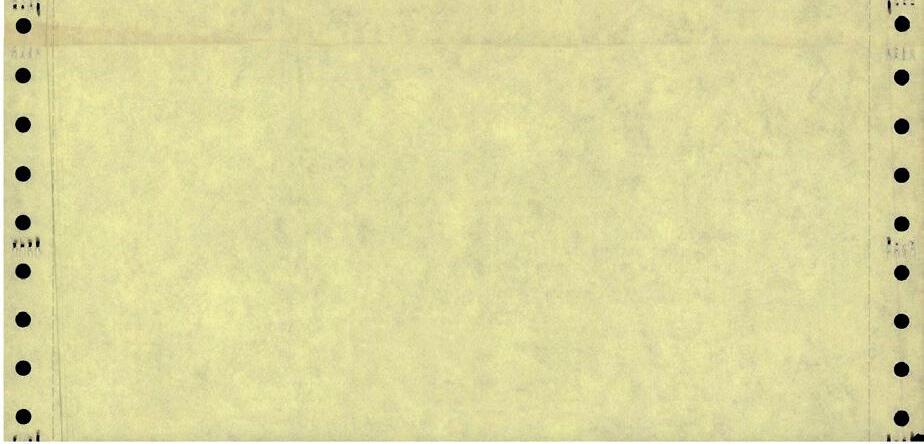

There's a lot of cool things in the future. One of my personal favourite pieces of technology are the contact lenses that not only give you better vision, but they also let you record everything you see. Now I know many people in this time may think that losing privacy is bad, but it's actually a very good thing because there's no crime in the future. It's really safe. I'm not saying that there's no problems in the future, though. Global warming is a huge problem. And the melting of sea ice in the Arctic has caused sea levels to rise tremendously, and many major cities are under water in the future.
In the year 2022 the government of the United States announces that all food will be provided for free to its citizens. World hunger is not completely ended however, because overpopulation is a big issue. The population of Earth is nearly nine billion in the year 2033. It may be weird to think but India is actually the most populated country in the future.
In the year 2025 our base is open on the moon, and people can actually visit it for a fee. In the year 2026 there are robotic hands released that look exactly like human hands. Almost all diseases are cured as well, because we can 3D print organs and other body parts, which lets people just replace parts of their body if they aren’t working.
The period of the year 2025 to 2030 is absolutely crazy! So much happens! People in the year 2018 probably can’t even imagine it! That's a big misconception in your time. Most people think that people are going to go and explore the whole universe, but actually, as humans advance, everything is going to get smaller, not bigger, and eventually we will start uploading our brains to computers and start simulating the realities. But, that's later in the 2060s.
When time travel is released to the public in the year 2028, I highly recommend going to around the year 3000, just for a trip. Time vacations are very common in the future. Even though I'm technically breaking protocol by telling you everything I can about the future, it won't cause a paradox, and I believe that by telling you, whoever's out there watching this, you can help make our future better.”
a citizen: a member of a particular country or city to advance: to move forward, to improve protocol: the rules a paradox: something that goes against the rules (of nature)
d Write the words from the tapescript that you highlighted in the grid.
1 Discuss these words with your classmates. Write what you think the word means in the second column.
2 Use a(n online) dictionary to look up the words. Write the correct meaning in the third column.
Words I don’t knowWhat I think it meansWhat it really means
e What words related to time travel and (super)human things did you hear in the clip? Write down three.
f What is going to be different in the future according to Daryl Dean? Write two good changes and two bad changes in the grid.
g Discuss in class: what do you think about contact lenses that record everything? What are the (dis)advantages?
h Look up some more videos by Apex TV. Do you think this is a reliable source? Why (not)? Discuss it with a partner and present your findings to the class.
2 Look at the interactive picture and discover the words related to time travel and (super)human things. Listen to the pronunciation and check the spelling.
3 Fill in a correct word about time travel and (super)human things.
1 Tomorrow, next week and the year 2066 are all times in the
2 In the year 3000, do you think robots will do the jobs of ?

3 Almost every home has a : we use them for work, school and sometimes for gaming.
4 Because of , humankind may not exist for much longer.
5 My father doesn’t in life on other He doesn’t think exist. I think he should , because we can’t really know for sure.
Check: vocabulary ‘time travel and (super)human things’ Yes I think soNo
Ik ken in het Engels woorden rond tijdreizen en (boven)menselijke dingen.
4 Reread these sentences from the text in exercise 1.
l. 16: Your brain can become, on average, six times more powerful than it normally is.
l. 26: There's a lot of cool things in the future.
l. 31: Global warming is a huge problem.
l. 38: India is actually the most populated country in the future.
l. 45: The period of the year 2025 to 2030 is absolutely crazy!
l. 48: As humans advance, everything is going to get smaller, not bigger
l. 59: You can help make our future better
a Circle the correct answer.
1 The words in red are: verbs – adjectives – nouns
2 They give information about: a verb – an adjective – a noun
b In the sentences above, highlight the word(s) that the red word(s) are giving information about.
How to describe things?
To describe things you use adjectives
An adjective gives information about a noun
e.g. Global warming is a huge problem
e.g. Overpopulation is a big issue
The problem is huge
The issue is big
c Circle the red words in the sentences underneath exercise 4 that use the comparative form.
d Underline the red words in the sentences that use the superlative form.
1 How to compare two things?
To compare two things you use the comparative of an adjective
General rule: adjective + er (+ than)
e.g. small Buildings will be smaller (than they are now).
You don’t have to write ‘than’ if you don’t write the whole comparison.
Other rules:
e.g. big
In the future, buildings will be bigger. adjective with 1 syllable that ends in a vowel and a consonant: double the consonant + er
e.g. easy Paying for something will be easier (than it is now). adjective that ends in a consonant + y: –y + ier
e.g. interesting The future is going to be more interesting adjective with more than 2 syllables: more + adjective
2 How to say something is the most of something?
To say that something is the most of something you use the superlative of an adjective
General rule: the + adjective + est
e.g. smart Are humans the smartest beings in the universe?
Other rules:
e.g. big Jupiter is the biggest planet in our solar system.
e.g. happy Disneyland is the happiest place on Earth.
e.g. intelligent Einstein was one of the most intelligent people.
5 Complete the statements with a correct adjective. Use your own words or a word from the box.
amazing – big – clean – dangerous – fast – fun – smart – …
1 In the future, all cars will be very .
2 Global warming is a(n) problem.
3 Do you think robots are ?
4 We have to keep our planet
5 It’s going to be a(n) school year.
6 Complete the sentences to compare the two pictures. Use the comparative form of the words from the box below. You can only use each word one time.
amazing – big – few – many – strange – ugly
1 In the future, there are buildings in the present. There aren’t so many buildings now.
2 The buildings in the future are . Our buildings look small.
3 The shapes of the buildings are in the future. Our buildings look normal.
4 Future cities are our cities are now.

5 There are trees in future cities. There is hardly any green.
6 I think cities in the future are present cities. But that’s my personal taste.

You use ‘than’ when you compare two things, but ‘then’ for the order in which something happens.
7 Put the adjectives in their superlative forms.
1
In 2019 the people of Spain were people in the world. We have ideas for the future. But some ideas may also be What is humans have ever travelled?
People have ideas of what the future may look like.
is yet to come!
Do you want more practice? On diddit you can find extra practice materials.
Comparing two things: Your idea is better than mine. Indicating an order: I had my idea first, then you came up with yours. Check:
Checklist: learning about time travel

Wat kan ik al?
Wat lukt nog niet goed? Wat moet ik doen om dat onderdeel beter te kunnen?
1 Watch the clip.
a Describe the main idea of the clip in one sentence.
b How does the illustrator describe the meaning of the word ‘future’?
c Kids have a lot of imagination. Write down two ideas that are impossible.
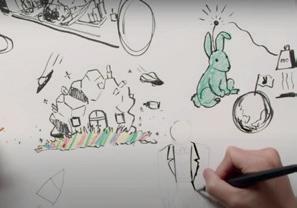
d Watch the clip again and highlight the correct word to complete the sentences.
1 We’re going to draw the future / past
2 I’ll be the leader / president
3 How do you think children / people will talk in the future?
4 Boys will be wearing tuxedos / costumes
5 Do you think people will travel on unicorns / dinosaurs?
e In the previous exercise, the verb forms in red talk about: the past the present the future
2 Do you remember when to use the future simple and the going-to future?
a Highlight the correct answers.
b Write an example sentence for each rule. You can reuse sentences from exercise 1d.
1 You use the going-to future / future simple to make a prediction based on what you see.
e.g. Watch out for the fire! You're going to burn yourself.
2 You use the going-to future / future simple to make predictions.
3 You use the going-to future / future simple to talk about future plans.
4 You use the going-to future / future simple to talk about decisions made at the moment, like requests, offers and promises.
c Go to the interactive picture and watch the instruction video about when to use the future simple and the going-to future, or scan the QR code to refresh your memory.
3 Put the verb between brackets in the going-to future or the future simple tense.
1 In the year 2050, robots (to teach) at school.
2 After secondary school I (to go) to college.
3 If the surgery goes well, he (to survive).
4 What do you think (to happen) in the year 3000?
5 you (to stay) home this weekend?
6 we ever (to live) on Mars?
4 Use the verbs between brackets to finish the sentences with a negative form of the going-to future or the future simple.
1 Please tell me the secret! I promise I (to tell) anyone.
2 Don’t add fuel to the fire! It (to help).
3 Children (to go) to school in the year 3045.
4 If we don't start taking care of our planet, it (to survive).
5 I (to stay) with my grandmother next weekend because she will be busy.
6 You can’t come to Jane’s house tonight because she (to like) it.
5 Watch the clip.
a Highlight the questions that James Cordon asks.
1 Who will be my next guest on the show?
2 Will I ever be named People Magazine’s sexiest man alive?
3 Am I going to be named People Magazine’s sexiest man alive?
4 Am I going to win a Grammy?
5 Will I ever win a Grammy?
6 How will I learn to be happy?
7 Will I ever be happy?
b Which tense is used in this clip?
c Why is this tense used?
d Do you think James Cordon was happy with the predictions? Why (not)?
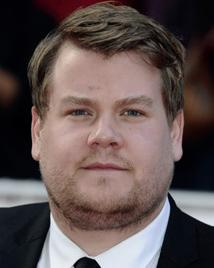
6 Look at the conversation between Nathan and the fortune teller. Use the words between brackets to complete the dialogue. I am Madam Samanthos and I
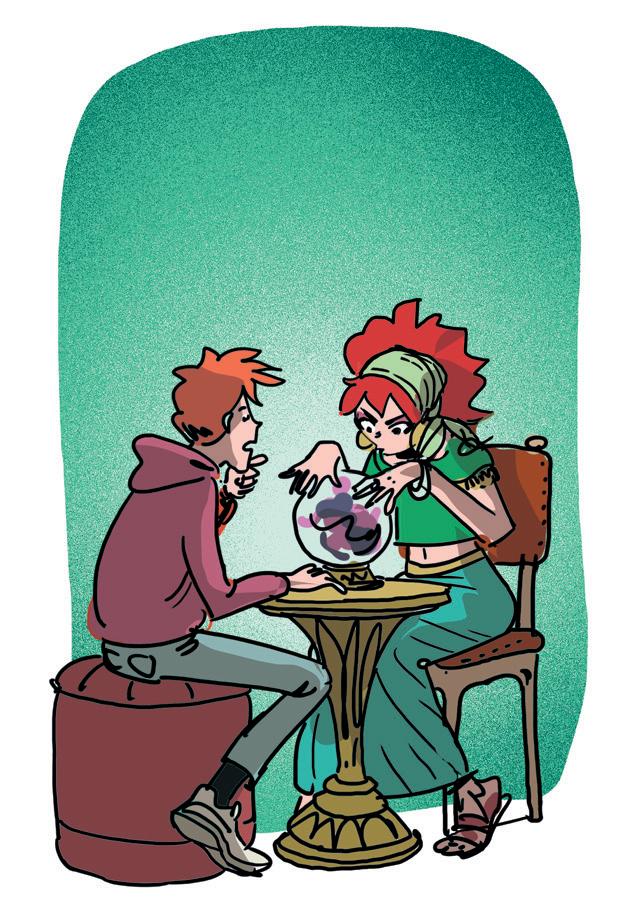
(to read) your future. (you, to tell) me the truth about everything?
First of all, (I, to live) a long life?
Well, I know that I (to be) a musician. But (I, to win) any awards?
What? How is that possible?
I (not to go) to music camp next month for nothing!
Ask me anything. And Madam Samanthos promises she (to do) her best.
You (to be) older than 100 and younger than 110. Next question!
Let’s just say that some people (not to love) your music.
Noooooo! How ever (I, to learn) to write good music?
Are you sure you (to go) to camp? My crystal ball says that they will cancel your camp.
Exactly!
Yes I think soNo Ik kan in het Engels de toekomstige tijden gebruiken in een zin.
Check: going-to future and future simple
7 Do you think there are people who know what will happen in the future?
a Read the words before you read the text. Tick off the words you already know.
Words from the text
Words I understand before reading
Words I understand after reading a coincidence to disappoint to predict a viewer
b Who wrote this text?
c Look at the first picture. Who do you think this text is about?
d Read the title. Where do you think you could find this text? in a book in a magazine in a newspaper on a website
e Read the text.
1 5 10
Are the writers time travellers, or are they related to Nostradamus? The Simpsons, the animated comedy, aired its 33rd Season in 2022, and never disappoints viewers with its eerie predictions that come true years later.
The Simpsons family is made up of several characters, but the main characters are Homer, Marge, Lisa, Bart, and Maggie. Each episode is filled with the Simpsons family interacting with other residents of Springfield, including guest stars that appeared in some episodes on The Simpsons. But what viewers find most interesting is how some events were predicted by the The Simpsons' writers at least five years before they happened. Could it be that The Simpsons really predicts world events, or is the world just following the The Simpsons’ script?
to air: to show on radio or television eerie: scary a resident: someone who lives in a certain place
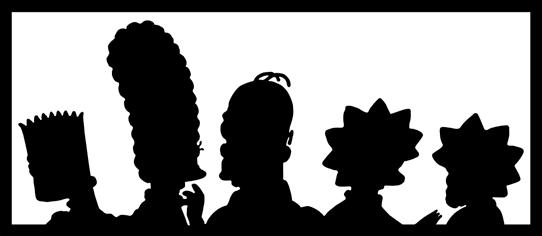

One of The Simpsons' Superbowl episodes included a prediction of a musical artist's performance. In the 2012 episode "Lisa Goes Gaga", Lady Gaga visits Springfield and performs her songs while flying over an audience, and at one point, plays the piano during her concert. In 2017, Gaga performed her greatest hits at the Superbowl including "Poker Face”, and "Bad Romance". During her performance, Gaga was lifted above the audience. Later in the show, she also played "Million Reasons", on the piano.
The episode "Bart to the Future" aired in 2000, where Bart Simpson saw his, and his sister's, future. The leader of the country was Lisa Simpson. Lisa mentioned that the United States had to fix the economy after former Donald Trump's presidency. Not only was Trump elected president in 2016, but one scene from the show looked as if it was almost a copy of real life. In the same episode, a crowd of people watched as Donald Trump descended an escalator. In reality, President Trump also descended the escalator with First Lady Melania Trump while a group of supporters watched in the background.

In 1995, in the episode "Lisa's Wedding", Lisa went to a fortune teller that predicted Lisa's future in 2010, when she would marry her college sweetheart. Excited to share the news, she called her mom. The phone that Lisa used included a screen that showed Marge's face in real-time
Skype was invented in 2003, but it was only used on computers. In 2010, Apple announced that it developed "FaceTime" for Apple users, the app allowed users to not only talk but see the person that they were talking to through the phone's camera.

In 1993, The Simpsons first aired the episode "Marge in Chains". The episode focused on Marge being arrested for shoplifting. The rest of Springfield caught the “Osaka Flu” after a shipment of products arrived in Springfield. The Osaka Flu caused a pandemic just like the COVID-19 pandemic. They also didn't have a treatment immediately available, and the doctor in the episode told patients to get some bed rest, just like how the scientists were still testing out their vaccine to prevent the COVID-19 virus.
These are just a few examples of how The Simpsons’ predictions came true. So, do the writers have predictive powers? Or are all of these events just coincidences? Maybe the show makes things happen in the real world. Whatever the case, viewers can’t help but wonder: What will happen next in Springfield? How bad will it be for our world?
to elect: to choose by voting to shoplift: to steal from a shop
f Describe the main idea of this article in one sentence.
g True or false? Correct the false statements.
1 The Simpsons aired their 32nd season in 2022.
2 Lady Gaga played the piano at the 2017 Superbowl.
3 In the show Bart Simpson becomes president of the USA.
4 The Simpsons predicted the name COVID-19.
h Some words in the text look like Dutch words. What do they mean?
English words
Dutch words
Other languages
an episode (l. 6)
an economy (l. 28)
a pandemic (l. 42)
a vaccine (l. 50)
i Do you know the words in another language? Write them down and complete the grid.
j What do you think this sentence from the text means?
‘Could it be that The Simpsons really predicts world events, or is the world just following the The Simpsons’ script?’ (l. 11)
k Do you think the writers of The Simpsons can predict the future? Explain your answer.
l Search the internet for other predictions made by The Simpsons. Choose one.
1 Write down a few keywords about the prediction in the The Simpsons cloud.

2 Tell your classmate(s) what The Simpsons predicted.
Check: reading Yes I think soNo
Ik kan de hoofdgedachte van een Engelstalige tekst bepalen.
Ik kan informatie uit een Engelstalige tekst halen.
Ik kan de betekenis van woorden uit een Engelstalige tekst afleiden.
8 Look at the interactive picture and discover the words related to predictions. Listen to the pronunciation and check the spelling.
9 Find a word from the new vocabulary about predictions that means:
1 someone who says they can predict the future: a
2 to make something (work) better: to
3 the true world that we live in: our
4 someone who looks for proof of how and why things are as they are: a
5 when different things happen in the same way and it seems strange: a
Check: vocabulary ‘predictions’ Yes I think soNo
Ik ken in het Engels woorden rond voorspellingen.
Checklist: learning about predicting the future
Wat kan ik al? Wat lukt nog niet goed? Wat moet ik doen om dat onderdeel beter te kunnen?
1 Which word from the vocabulary about time travel and (super)human things fits the definition? You can use the crossword puzzle to help.
ACROSS
2 to feel that something is true: to 4 the people that live in a place: the 5 a being that is not from Earth: an DOWN



1 more than is normal for a human being:
3 sight, the ability to see:
4 Mars, Jupiter, Venus, Earth … :

ex. 1 Ik kan in het Engels woorden gebruiken rond tijdreizen en (boven)menselijke dingen.
Time to catch up? ex. 1
Time to get ahead? ex. 6
Yes I think soNo
2 Look at the picture. Fill in a correct adjective, comparative or superlative to make each statement correct. Use the words from the box.
comfortable – curvy – dark – short – tall
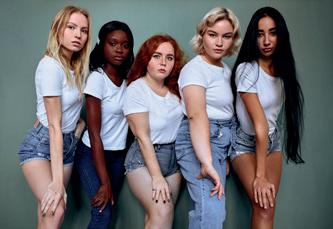
is
2 Adrienne is person in the row.
3 Sandra is She is than Joan.
5
and Sandra are wearing clothes.
ex. 2 Ik kan in het Engels zelfstandige naamwoorden beschrijven en vergelijken.
Time to catch up? ex. 2
Time to get ahead? ex. 7
Yes I think soNo
3 Look at the pictures. What’s next? Complete the sentences with a verb from the box. Use

ex. 3
to destroy – to fall – to fly – not to hurt – not to pass – to travel
Ik kan in het Engels zinnen maken in de ‘going-to future’ en de ‘future simple’.





Time to catch up? ex. 3
Time to get ahead? ex. 8
Yes I think soNo
4 Write a question about the parts in bold.
1
2
Yes, they will find a cure for cancer in the year 2056.
When James comes to visit, he will stay at our house
3
4
5
Prince William is going to be the next King of England.

No, I'm not going to work in the restaurant this summer.
There will be world peace when we learn to love each other
ex. 4 Ik kan in het Engels vragen stellen over de toekomst. Yes I think soNo
Time to catch up? ex. 4 Time to get ahead? ex. 9
5 Look at the words from the vocabulary about predictions and follow the instructions.
a Draw a line between the person (job) and what they do in their job (2x).
b Circle the two words that mean (kind of) the same thing.
to fix a fortune teller reality
to predict to invent
real life to disappoint a coincidence a scientist
c Choose one of the other words and make a sentence with it so the meaning is clear.
ex. 5 Ik kan in het Engels woorden gebruiken rond voorspellingen. Yes I think soNo
Time to catch up? ex. 5 Time to get ahead? ex. 10
Ready? Tick off the exercises you have to do on page 74-85.
1 Match the words about time travel and (super)human things to their correct description.
2 Complete the grid with the correct adjectives, comparatives or superlatives. See p. 61
3 Read the sentences in the future tense.
a Highlight the verb forms.
b Make the positive sentences negative.
c Make the negative sentences positive.
1 Robots will rule the world.
2 I am not going to be a doctor in the future.
3 Planet Earth will be dark and cold.
4 People will not know how to travel through time.
5 Humans aren’t going to live on Mars.

6 Children are going to get smarter and smarter.
Score ex. 3 < 9 >
Well done!
4 Put the words in the correct order to make a question.
1 going to – who – drive – home – us – is
2 we – have – teachers – why – will – robot
3 crime – still – exist – in the future – will
4 are – move – going to – when – your parents – to Italy
5 still – love – tomorrow – you – will – me
6 president of the USA – will – be – who
Score ex. 4 < 4 >/= 4
Well done!
5 Fill in the gaps with the correct forms of the words about predictions. Choose from: to disappoint – to fix – a fortune teller – real life – scientists – a vision
1 Every child has a of what their future will be like.
2 I want to see so they can tell me about my future.
3 Romance in films is nothing like it is in 4 are working hard to find a cure for cancer.

5 We have made a mess of the world, but if we work together we can it.

6 Mary wants to leave home, but she doesn’t want to her parents.
Score ex. 5 < 4
Jennifer is bad ass. She always has been. Since she was a little girl, she has always known that she wanted to (1) the (2). And so she did. By the time Jen was 24, she had three degrees in science, physics and astrology, so it wasn’t long before she had the support of the (3) They believed that she would find the answers to all the problems in the world: (4), (5), and even (6)
But her greatest goal today is to prove that there is intelligent life on other (7)
She actually saw an (8) when she was a little girl. She was sound asleep one summer night, when she was awoken by a bright light shining in her eyes. She was so terrified that she started screaming at the top of her lungs. That must have scared it off, because it disappeared. Who knows what it wanted to do to her? Maybe it wanted to plant a (9) in her (10). She remembers telling her parents, telling teachers, friends, anyone who would listen. And although everyone found her story very entertaining, no one seemed to (11) her. This upsets her to this day, but it is the exact motivation she needs to succeed in her plan to prove the existence of aliens. She knows that the government has the (12) to time travel. All she has to do is get her hands on that (12), travel back in time to the night she met the (8), take a picture and come back. Piece of cake, right?
7 Read the riddles.
a Fill in the comparative or superlative form of the adjectives between brackets.
b Try to solve the riddle.
I’m (small) a bus.
I’m (big) a go-kart.
I’m used all over the world, but in different colours. If I’m yellow, then I’m used in New York.
I’m one of (famous) means of transport. People often use me when they arrive, at the end of a journey. You always have to pay to use me. I can serve for (long) or (short) distances. If the distance is (short), you pay (little) if the distance is (great).
What am I?
I’m (bright) a lamp.
I’m (hot) an oven.
I’m (far) away from you a plane.
What am I?
I’m large as a castle yet (light) air. A hundred men and their horses cannot move me.
What am I?
What belongs to you, but other people use it (a lot) you?
What is (useful) when it is broken?
1 a taxi; 2 the sun; 3 the castle’s shadow; 4 your name; 5 an egg
8 Watch the trailer from the film Minority Report.

a Answer the questions about the trailer.
1 What type of film do you think this is? Tick off the correct answer(s).
an action film a romantic film
a comedy a science fiction film
2 Why do you think ‘everybody runs’?
3 How do you think the future can be seen before the crime is committed?
4 Why do think they scan the eyes?
5 The three people in the pool are called ‘precog mutants’. What do you think they are used for?
b Read the strategy box about how to read a text.
How to read a text?
Before reading:
• Ask yourself what you think the text will be about.
• Read the (sub)title(s) of the text, look at the pictures, the introduction …
• What do you already know about the subject?
While reading:
• Find a place where you can read peacefully without distraction.
• Practise slow reading:
- Take your time to understand the text.
- Try to get into the atmosphere of the story.
- Re-read a part of the text if it wasn’t clear to you; maybe it will become clear when you read it again.
• If you don’t understand a sentence:
- Check if you can derive the meaning from the context.
e.g. The future looks very promising. There is still hope for us.
→ 'Promising’ is a positive word because you know that ‘hope’ is something good.
- Take the time to look up difficult words or to translate the sentence.
Tip: you don’t have to understand every single word to understand the main idea of the text.
• When you finish a paragraph or a page, ask yourself if you understand what you have read so far.
After reading:
Ask yourself the following questions:
• What did I read?
• Do I understand the main idea of the text?
• Can I retell the text in my own words?
• What did I think of the text? Did I enjoy reading it? Why (not)?
Other tips:
• Read the text again. Like watching films, you always get more out of a text the second time around.
• Try working with a classmate and see if you can help each other with the text’s more difficult parts.
c Read the excerpts from the short story ‘The Minority Report’ by Philip K. Dick. - Try to apply the strategies you have just learnt. - Answer the questions about each paragraph.

1
©VANIN
The first thought Anderton had when he saw the young man was: I'm getting bald. Bald and fat and old. But he didn't say it aloud. Instead, he pushed back his chair, got to his feet, and came resolutely around the side of his desk, his right hand extended. Smiling with forced friendliness, he shook hands with the young man. "Witwer?" he asked, managing to make this question sound gracious. "That's right," the young man said. "But the name's Ed to you, of course. That is, if you share my dislike for needless formality." The look on his blond, overly-confident face showed that he considered the matter. It would be Ed and John: everything would be agreeably cooperative right from the start. needless: onnodig
1 What is the main idea of this paragraph? Tick off the correct answer. John and Ed are old friends meeting up after a long time. John Anderton comes to Ed Witwer’s office to meet him. Ed Witwer comes to John Anderton’s office to meet him.
"Did you have much trouble finding the building?" Anderton asked carefully, ignoring the too-friendly proposal. Good God, he had to hold on to something Fear touched him and he began to sweat. Witwer was moving around the office as if he already owned it–as if he were measuring it for size. Couldn't he wait a couple of days?
"No trouble," Witwer answered cheerfully, his hands in his pockets. Eagerly, he examined the voluminous files that lined the wall.
"I'm not coming into your agency blind, you understand. I have quite a few ideas of my own about the way Precrime is run."
Shakily, Anderton lit his pipe. "How is it run? I should like to know."
"Not badly," Witwer said. "In fact, quite well."
Anderton regarded him steadily. "Is that your private opinion? Or is it just cant?"
Witwer met his gaze guilelessly. "Private and public. The Senate's pleased with your work. In fact, they're enthusiastic." He added, "As enthusiastic as very old men can be."
Anderton winced, but outwardly he remained impassive. It cost him an effort, though. He wondered what Witwer really thought. What was actually going on in that close-cropped skull? The young man's eyes were blue, bright and disturbingly clever. Witwer was nobody's fool. And obviously he had a great deal of ambition.
cant: onzin
a gaze: een (lange) blik guilelessly: onschuldig
2 Make a prediction as to why Anderton thinks: ‘Couldn’t he wait a couple of days?’ (l. 4-5) What do you think will happen in a couple of days?
3 Find words in the text that mean:
- thick, fat:
- a shaved head:
1 5 10
"As I understand it," Anderton said cautiously, "you're going to be my assistant until I retire”.
"That's my understanding, too," the other replied, without an instant's hesitation "Which may be this year, or next year–or ten years from now." The pipe in Anderton's hand trembled. "I'm under no compulsion to retire. I founded Precrime and I can stay on here as long as I want. It's purely my decision."
Witwer nodded, his expression still guileless. "Of course." With an effort, Anderton cooled down a trifle. "I merely wanted to get things straight."
"From the start," Witwer agreed. "You're the boss. What you say goes." With every evidence of sincerity, he asked: "Would you care to show me the organization? I'd like to familiarize myself with the general routine as soon as possible."
4 Was your prediction correct? Highlight the part of the text that answers question 2.
5 Find a word in the text that means ‘a little bit’:
1
As they walked along the busy, yellow-lit hallway of offices, Anderton said: "You're acquainted with the theory of precrime, of course. I presume we can take that for granted."
5 10 15
"I have the information publicly available," Witwer replied. "With the aid of your *precog mutants, you've boldly and successfully destroyed the post-crime punitive system of jails and fines. As we all realize, punishment was never much of a deterrent, and could scarcely have afforded comfort to a victim already dead." They had come to the descent lift. As it carried them swiftly downward, Anderton said: "You've probably grasped the basic legalistic drawback to precrime methodology. We're taking in individuals who have broken no law."
"But they surely will," Witwer affirmed with conviction "Happily they don't–because we get them first, before they can commit an act of violence. So the commission of the crime itself is absolute metaphysics. We claim they're guilty. They, on the other hand, eternally claim they're innocent. And, in a sense, they are innocent."
a hesitation: een aarzeling sincerity: oprechtheid to presume: veronderstellen an aid: een hulp a fine: een boete a deterrent: een afschrikmiddel scarcely: amper swiftly: vlug, snel to grasp: snappen, begrijpen a drawback: een nadeel a conviction: een overtuiging
*precog mutants: aliens that can see future events before they happen
6 What problem are they trying to fix by using the precog mutants?
7 Explain what ‘precrime’ is. Complete the sentences.
The precogs see … Precrime takes in the …
8 In the text they speak about a drawback or a disadvantage. What is the disadvantage to this system?
d Give an opinion.
1 Do you think this would be a good way to end crime? Give a reason why it would be, and a reason why it wouldn’t be.
Yes, because …
No, because …
2 Do you think this system could really be used in the future? Why (not)?
3 Would you like to read this short story? Why (not)?
9 What will the world be like in the year 2050?
a What are some things you think will change in the future? Write words on the touchscreen below.
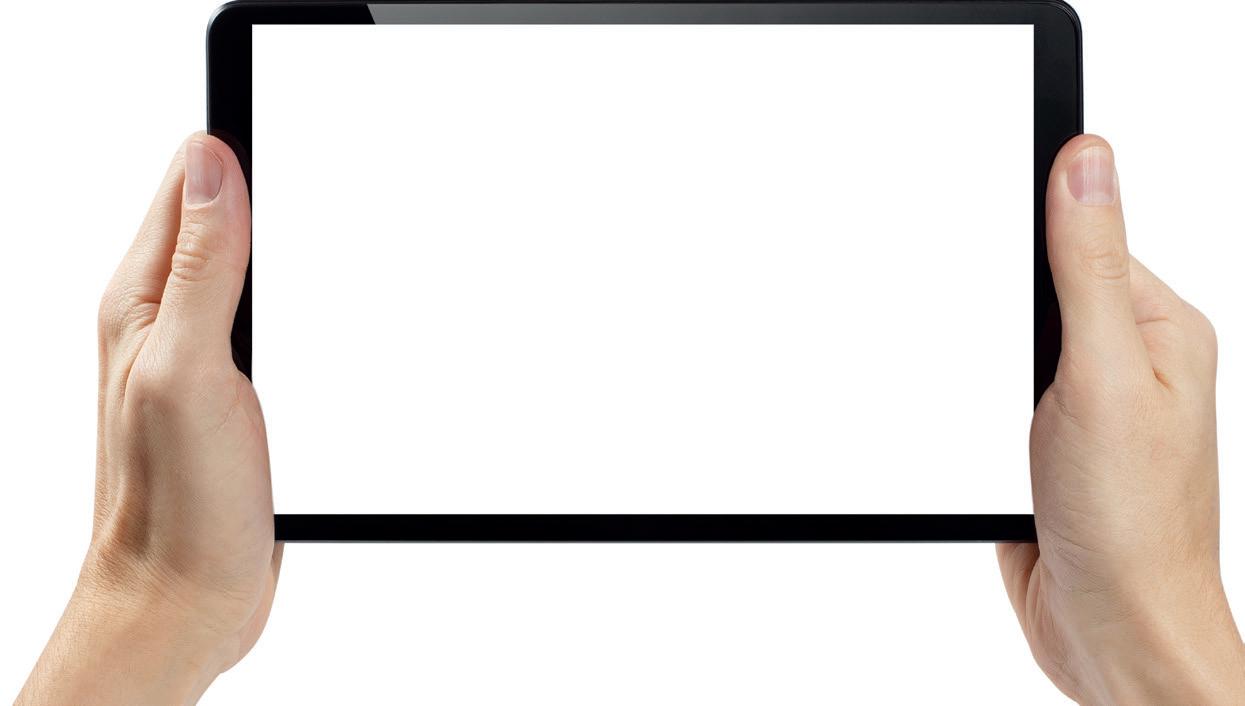
b Watch the clip.
c What is the purpose of this clip? Tick off the correct answer(s). to give information to give an opinion to give instructions to entertain
d Who made this clip?
e Why did they make this clip according to you?
f Answer the questions about the clip
1 Name two advantages of self-driving cars. 1 2
2 What is one of the biggest problems in the world we live in?
3 When will humans most likely be able to be a tourist in space?
4 What could be a disadvantage of artificial intelligence? Write in English or in Dutch.
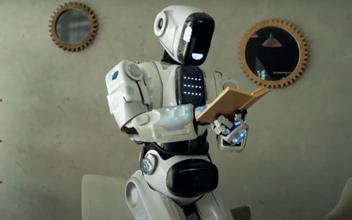
g What do you think the word ‘levitation’ means?
h Give an example of what you think 'an apocalyptic nightmare' could be.
i Which new technology do you think will be the most useful? Why?
j Would you like to be a student in the year 2050? Why (not)?
10 Look at the words below.
a For each word, write two other words that have something to do with them. They can be related in sound, meaning, subject, etc.
b Write a short story of a maximum of ten sentences about the future. Use all the words you wrote down. Have fun with it!
c Read your story to a classmate.
d Ask your classmate questions about their story. Use the going-to future twice and also use the future simple twice.
1 You get to go back in time to the year 1901. You have five minutes to tell the people of the past about the future (the world you live in).
- Give them advice about how to make sure the bad things don’t happen.
- Reassure them that a lot of good things will happen. You may look up information to help you.
a First, answer the questions.
1 What is the year today?
2 According to you, which important events happened between 1901 and now? Think of history, culture, health, education, politics, etc.

Name two good things and two bad things. Good
3 What has changed in technology? Name three things.
4 Choose one of the bad events. Think of a creative (non-violent) way the people of 1901 can prevent that event from happening.
b Next, write a short text about what has changed. Mention the two good and the two bad things you wrote down, as well as what has changed in technology.
e.g. Since 1901 a lot has changed. First of all …
c Finally, prepare your speech:
- Use the text you wrote to prepare a speech to the people of 1901.
- Use future tenses as for them, you are from the future.
- Use the checklist to make sure your speech has a good, strong structure.
Introduce yourself. Say why you are giving your speech. Start each point you want to make with a strong statement.
e.g. If all plants die, so will we. Defend or prove each statement using facts and examples.
e.g. We need plants for the air we breathe. End with a strong conclusion. You can leave the audience with a challenge, a question or a certain feeling. Thank the audience for their attention.
d Deliver your speech to the class as if they were the people of 1901.
2 Watch the clip from the boy band Busted. This is what they think the year 3000 will look like.
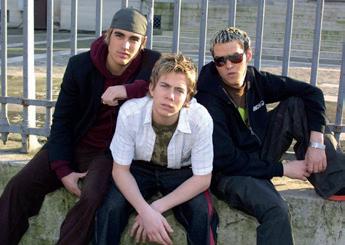
a Do you think their idea of the future is realistic? Discuss why (not).
b Work in pairs. Use the mind map to make notes of what you think the world will look like in the year 3000.
climate
education
nature
government
c Highlight the changes that you are pretty sure about. Circle the things that may possibly happen.
technology
media
d Use a programme of your choice to make an interesting presentation about what the year 3000 will look like.
e Present your ideas to the class.
- Use the strategy sheet on how to present something.
- Make sure you and your partner take turns speaking.
- Your presentation shouldn’t be longer than five minutes.
a What do you think a time capsule is? Explain in English or in Dutch.
See p. 96
b Watch the clip about a time capsule from 1914. Describe what they found in that time capsule.
c Follow the steps to make a time capsule with your class.
Step 1: Discuss and decide in group:
- What is typical for this period?
- Which objects should definitely go in the time capsule?
- What can you use for a capsule? (Take sustainability into account.)
- When should the capsule be opened?
- Where can you safely ‘hide’ the capsule?
- Discuss whether or not you should hide it during some kind of ceremony.
- What should the capsule say on the outside?
Step 2: Write an anonymous letter to put in the time capsule.
Dear people of the year ...
Write things about the present day that you think people of the future should know. What you write should be as objective as possible, as the people who open the time capsule probably won’t know you personally. Maybe there is something that you left behind for future students to see. Or maybe you just want to tell them about your (least) favourite teacher.
Kind regards a student from the year 20..
Step 3: Gather the items that the class has decided on, and put them in the time capsule. Extra: Decorate the time capsule.
Checklist: your time
Ik kan in het Engels woorden gebruiken om de toekomst te beschrijven.
Ik kan in het Engels dingen met elkaar vergelijken.
Ik kan in het Engels de ‘future simple’ en de ‘going-to future’ gebruiken om de toekomst te beschrijven.
Ik kan in het Engels een korte presentatie geven over de toekomst.
Ik kan in het Engels een brief schrijven voor mensen in de toekomst.
Wat kan ik al?
Wat lukt nog niet goed? Wat moet ik doen om dat onderdeel beter te kunnen?
a computer een computer
a (micro)chip
to invent uitvinden
a robot/robotic een robot/robotisch
een (micro)chip
a brain de hersenen
to fix herstellen
a scientist een wetenschapper digitally digitaal
the technology de technologie
(the) population (de) bevolking
global warming opwarming van de aarde
hunger honger
a disease een ziekte
to cure genezen
(the) public (het) volk/openbaar
a human een mens
the future de toekomst
a coincidence een toeval
a government een regering
a crime een misdaad
©VANIN
to disappoint teleurstellen
to predict voorspellen
to keep an open mind een open geest houden
an ability een vermogen, het kunnen
TOMORROW
to believe geloven
(super)human (boven)menselijk an alien een buitenaards wezen
to explore onderzoeken, ontdekken
the universe het universum real life in het echte leven
a/the moon een/de maan a planet een planeet
to happen gebeuren
to record opnemen
to replace vervangen
(a) reality (een) realiteit, werkelijkheid
real-time in de huidige tijd
(to) time travel tijdreizen
to travel back in time terugreizen in de tijd
a/the vision een visioen/ het gezichtsvermogen
a prediction een voorspelling
to visit bezoeken the past het verleden
to remember onthouden, zich herinneren
to come true uitkomen, werkelijkheid worden
On diddit you can find a study sheet with the vocabulary of the unit.
1 How to describe things?
To describe nouns you use adjectives
Global warming is a huge problem
The problem is huge
Overpopulation is a big issue
2 How to compare things?
The comparative General rule: adjective + er (+ than)
The issue is big
smallBuildings will be smaller (than they are now).
Other rules:
Adjective with 1 syllable that ends in a vowel and a consonant big
In the future, buildings will be bigger (than they are now).
Rule: adjective + double the consonant + er (+ than)
Adjective that ends in a consonant + y
easy Paying for something will be easier (than it is now).
Rule: adjective – y + ier (+ than)
Adjective with more than 2 syllables
interestingThe future is going to be more interesting (than the present).
Rule: more + adjective (+ than)
Mind!
• You don’t have to write ‘than’ if you don’t write the whole comparison. e.g. In the future, buildings will be bigger.
• You use ‘than’ when you compare things, but ‘then’ for the order in which something happens.
The superlative General rule: the + adjective + est
smartAre humans the smartest beings in the universe?
Other rules:
big Jupiter is the biggest planet in our solar system. happyDisneyland is the happiest place on Earth. intelligentEinstein was one of the most intelligent people.
Irregulars Adjective Comparative Superlative good better the best bad worse the worst far farther/further the farthest/furthest much, many, a lot of more the most little less the least
Future simple (will) Going to Decisions made at the moment
e.g. It’s raining! I will take an umbrella.
Predictions
Plans made beforehand
e.g. I am going to take an umbrella with me tonight, just to be sure.
Predictions based on what you can see
e.g. It’s so cold! I think it will snow today.e.g. Look at those clouds! It is going to rain.
Requests
e.g. Will you marry me?
Offers
e.g. I will help you, if you want.
Promises
e.g. I will clean up tomorrow, I promise.
1 2 I You am going to play are going to buy a song. food. I You am not going to play are not going to buy a song. food.
Singular
3 He She It
is going to sing is going to do is going to be homework. perfect.
He She It
is not going to sing is not going to do is not going to be homework. perfect.
Plural
1 2 3
We You They
are going to work are going to read are going to dance
all day. a book. all night.
We You They
are not going to work are not going to read are not going to dance
all day. a book. all night.
You can also use the short form of to be.
Rule a form of to be + going to + main verb (+ rest of the sentence) a form of to be + not + going to + main verb (+ rest of the sentence)
Questions using the going-to future
Question (Short) answer
1 Yes-no questions
Am I going to read a book? Yes, you are.No, you aren’t.
Rule a form of to be + subject + going to + main verb (+ rest of the sentence) + ?
2 WH-questions
Where are you going to buy food?(I am going to buy it) at the supermarket.
Rule WH-word + a form of to be + subject + going to + main verb (+ rest of the sentence) + ?
3 Asking for the subject
What is going to be perfect? The party (is going to be perfect).
Rule Who/What + a form of to be + going to + main verb (+ rest of the sentence) + ?
positive form of ‘going to’The negative form of ‘going to’
1 2 I You will play will buy a song. food. I You will not play will not buy a song. food.
Singular
3He She It
Plural
1 2 3
We You They
will sing will do will be homework. perfect.
will work will read will dance
all day. a book. all night.
You can also use the short form: I’ll be right there.
He She It
We You They
will not sing will not do will not be homework. perfect.
will not work will not read will not dance
all day. a book. all night.
You can also use the short form: I won’t tell anyone.
Rule will + main verb (+ rest of the sentence) will + not + main verb (+ rest of the sentence)
Question (Short) answer
1 Yes-no questions
Will you finish that drink? Yes, I will. No, I won’t.
Rule Will + subject + main verb (+ rest of the sentence) + ?
2 WH-questions
How will they clean up the mess?(They will clean it up) by dividing the tasks.
Rule WH-word + will + subject + main verb (+ rest of the sentence) + ?
3 Asking for the subject
Who will dance all night? Sam will.
Rule Who/What + will + main verb (+ rest of the sentence) + ?
• Answer the following questions:
- What do you have to do?
- What is the subject of the presentation?
- Who is your audience? What do they want to know?
- What is the purpose of the presentation?
• Write down what you know about the subject:
- Use what you have learnt.
- Use sources (websites, books) to find the missing information.
• Look for pictures or other images to support your information.
• Practise what you want to say.
• Speak up, stand up straight and be enthusiastic.
• Look at your audience.
• Don’t be afraid of their questions.
• What went well?
• What can you do better in the future?

1 What do you see in the picture?
2 Which words that are related to the picture do you already know?
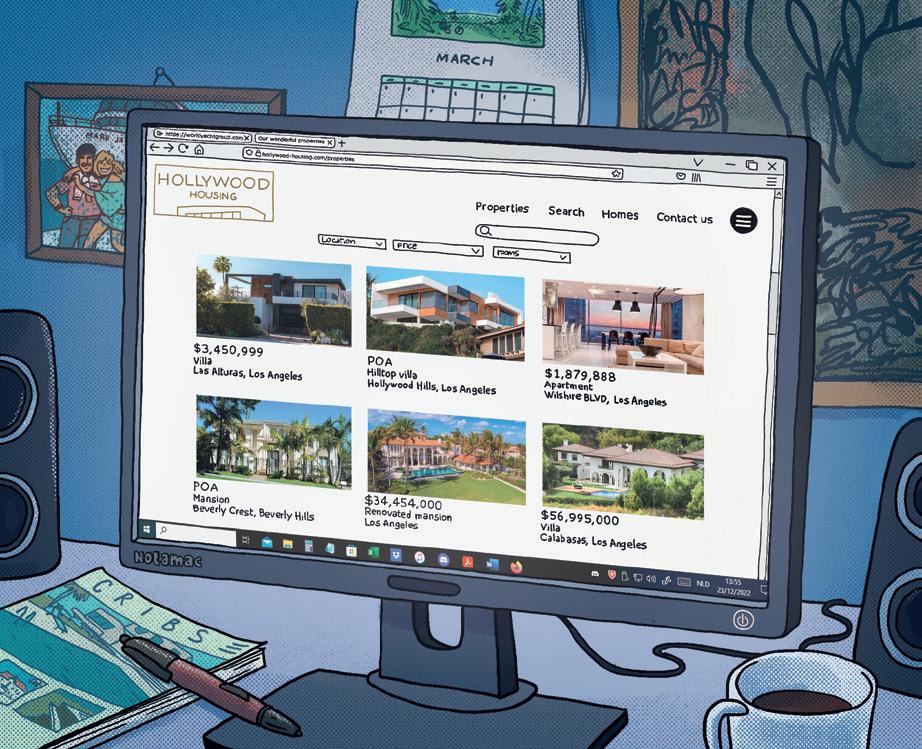
3 Watch the video. What do you want to learn about in this unit?
1 Read the newspaper article of the Los Angeles Times.
https://www.latimes.com/business/real-estate/story/2019-12-12/hollywood-hills-stunner-selling-sunset-sells-record-35-5-million

 BY JACK
BY JACK
One of the biggest homes in Hollywood Hills has sold for one of the largest sums in the neighborhood’s history: a whopping $35.5 million.
The deal is the priciest Hollywood Hills has seen since 2012, when Malaysian businessman Jho Low paid $38.98 million for a house in the Bird Streets.
stunner: something that is very attractive
The Hillside mansion is even bigger than Low’s first mansion: 20,000 square feet on a half-acre lot. The seller, real estate developer Jeff Thomas, first brought it to market for $43.9 million in August. He got plenty of publicity for the home, as it was featured on the Netflix show “Selling Sunset”.
The ultra-modern home, consisting of three stories, has luxury flourishing inside and out. To discover the exterior of the house, you go through automated walls of glass to go outside, where a 163-foot pool flows into a waterfall that falls down to an atrium garden
The interior screams luxury: living spaces with custom lighting fixtures and a sleek design palette of glass, tile, wood, marble and stone. There’s a massive indoor-outdoor living room, as well as a formal dining room, a chef’s kitchen and a spacious office
Other facilities include a wine cellar, movie theater, wet bar, glass elevator, car showroom and wellness spa complete with wet and dry saunas, hot and cold plunge pools and a massage room. Up top, you have an overview of the beautiful city light views from a rooftop deck with a firepit.
Elsewhere there are five bedrooms and nine bathrooms. The master bedroom is 2,800 square feet and has a wraparound terrace, outdoor hot tub and an oval-shaped bathtub that’s sunken into the bathroom floor. The custom-made wardrobe was imported from Italy.
Patios surround the outdoor pool, where a 15-foot flat screen television rises from the ground. Thomas spent around $2 million touching up the property, a process that included burying power lines and repaving the street, according to CNBC.
Adapted from: latimes.com
a What is the purpose of this newspaper article?
b Describe the main idea of the article in one sentence.
c Some words in the text look like Dutch words. What do they mean?
English words
Dutch words
an atrium: a large, high, open space in a tall building sleek: attractive a wet bar: a small bar in a house with equipment for making alcoholic drinks, usually with a sink
Other languages
publicity (l. 12)
the exterior (l. 15)
the interior (l. 18)
a terrace (l. 27)
to import (l. 28)
d Do you know the words in another language? Write them down and complete the grid.
e Match the words or expressions to their correct meaning.
whopping (l. 6) 1
a story (l. 14) 2
to touch up (l. 32) 3
very large A
to cover a path or road with a material B
a level, a floor C
to (re)pave (l. 33) 4
to renovate D
1234
f The text is written in American English. What are these words in British English? Use an online dictionary if necessary.

American English

a neighborhood (l. 6)
real estate (l. 11)
a story (l. 14)
a movie (l. 21)
a movie theater (l. 21)
an elevator (l. 21)
A storey is used to refer to the different levels in a house

A floor is used to refer to the different levels in a flat
British English
g Why is this house ultra-modern? Mention at least three items in your answer.
h Look at the design and floor plan of the chef’s kitchen and the laundry room
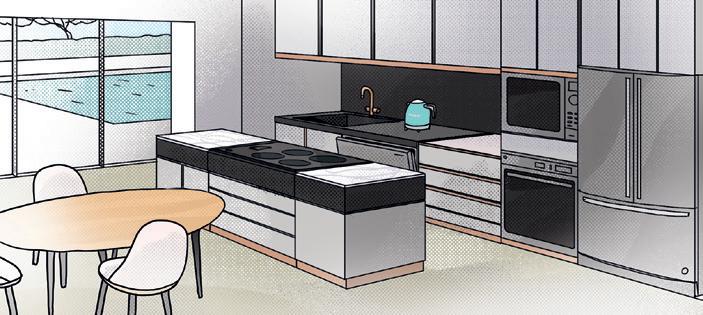
Name the numbered appliances.
i Write down at least one thing you would change about the design of the rooms from exercise h. What would you do differently? Think of materials, appliances, style …
2 Look at the interactive picture and discover the words related to housing and household appliances. Listen to the pronunciation and check the spelling.
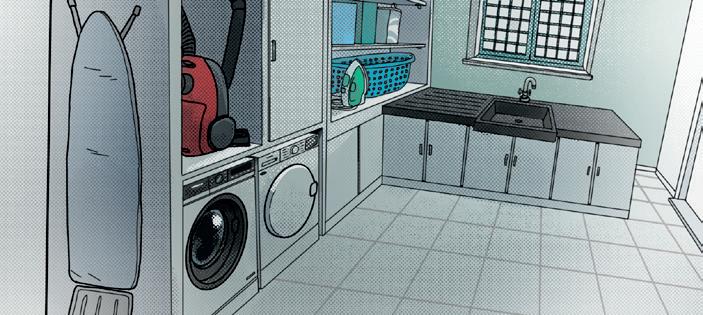
3 Which word from the vocabulary about housing fits the definition? You can use the crossword puzzle to help.

ACROSS
3 a container to store food at a very cold temperature: a
5 a machine to dry your clothes: a
6 a place where people sit outside: a
8 a piece of furniture people put clothes in: a DOWN
1 one of the levels in a building: the
2 a room where someone has a desk and works: an
4 a building or a piece of land: a 7 a basement: a

4 Look at these pictures of houses. Write down the correct house type underneath each picture. Choose from the box. a bungalow – a detached house – a flat – a mansion – a semi-detached house –a terraced house – a tiny house – a townhouse – a tree house







5 What are the following items made of? Name the correct material.
This worktop is made of

This wall is built with

My father designed and created a tree house completely made of
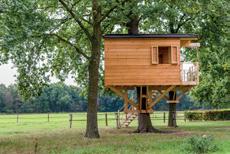
castle walls are made of

Instead of a plastic shower curtain, we decided to have a wall in our shower.
Do you want more practice? On diddit you can find extra practice materials.
Check: vocabulary ‘housing and appliances’

Ik ken in het Engels woorden rond huizen, materialen en toestellen.
6 Watch the clip of the film Home Alone.
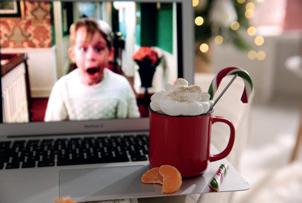
a Tick off the items you see in the video clip.
Christmas lights
milk
cheese snow
a microwave
Santa Claus
a teddy bear
weapon
Yes I think soNo
b Which words from exercise a are countable (C)? And which ones are uncountable (U)? Write the correct letter in front of the words.
c First, read the summary of the film. Then, take a look at the grammar grid.
d Complete the text with the correct quantifiers
1 5 10 15
It’s Christmas time. The McCallister family is preparing for a holiday in Paris, France. The youngest in the family, Kevin, doesn’t get along with family members. After a fight with his older brother, Buzz, he is sent to his room. Kevin always gets into trouble, and he has been sent to his room times before. The following day, while the rest of the family is rushing to make it to the airport on time, they completely forget about Kevin, who then has the house all to himself. Being home alone is fun for Kevin. He orders pizza and doesn’t have to share it with of his cousins. It’s a blast! He jumps on the beds, rides his sled in the house, and he even eats ice cream for dinner – only that makes him sick, so he doesn’t eat ice cream after that. Then, Kevin discovers that two burglars want to rob his house. There are valuable items in the house, so Kevin acts quickly by wiring his own house with booby traps to stop the burglars. There isn’t hope for the burglars.
Kevin has tricks up his sleeve and nothing to lose!
Adapted from: imdb.com
1 A lot of, many and much countable uncountable
(+) We bought a lot of apples.I always drink a lot of coffee.
(–) (?)
I didn’t buy many apples. Did you buy many apples? We don’t drink much coffee. Do you drink much coffee?
2 Some and any (+) (–) (?)
I bought some apples. I drank some coffee. I didn’t buy any apples. I don’t eat any sugar.
Mind!
Did you buy any apples? Do you add any sugar to the cake?
In a question that is an offer or a request, you use ‘some’ instead of ‘any’. Would you like some extra topping on your ice cream? offer Can you give me some advice on the matter? request
7 Look at the items found in Kevin’s kitchen and read the sentences. Are the underlined words countable (C) or uncountable (U)? Write the correct letter between brackets.
Kevin’s parents just bought a new coffee maker ( ). As you can see, there’s a pot of coffee ( ) on it filled with coffee ( ).

Kevin ate a lot of toasts with ham ( ) and cheese ( ). Afterwards, he ate an extra sandwich ( ) with a slice of cheese ( ) and some mayonnaise ( ).
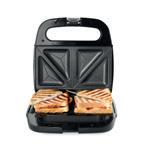
Kevin’s mother adores freshly made juice. She has a juicer ( ) in which she puts some fruit like oranges ( ) and apples ( ). She always pours the fruit juice ( ) into a fancy glass ( ).
Kevin’s sisters often use the mixer ( ) to make the pancake batter.


Kevin’s brother uses the blender ( ) to make shakes.

When you order drinks, you often say: ‘two coffees’ or ‘four orange juices’. What you really mean is: ‘two cups of coffee’ and ‘four glasses of orange juice’. By referring to the amounts, you use countable words.

8 Look at the rooms in Kevin’s house. Complete the sentences with the correct quantifier. Use: some, any, a lot of, much or many.
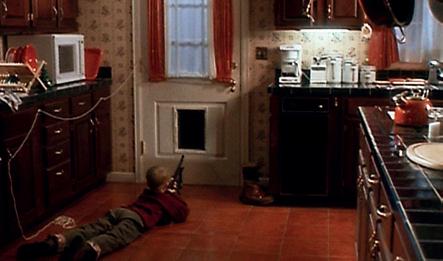
Kevin’s kitchen looks pretty clean. I cannot see dirty dishes. Besides a microwave, a dishwasher and a coffee maker, I don’t see appliances.
There are people in the room. It’s very crowded, so there isn’t space to move around. On the worktop you can see plates. pots and pans are hanging from the ceiling.
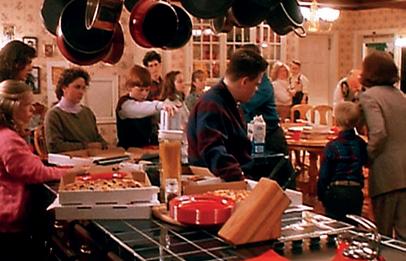
In Kevin’s bedroom there are toys on the floor. There aren’t empty bottles of soda. On his bedside table there’s an empty cup. He had hot chocolate. Do you see items you have in your bedroom?
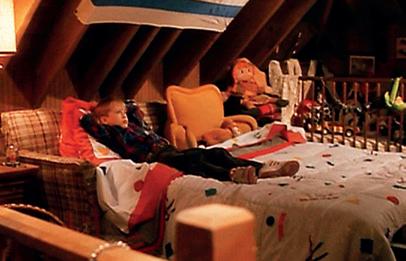
Do you want more practice? On diddit you can find extra practice materials.
Check: quantifiers Yes I think soNo Ik kan ‘a lot of’, ‘much’, ‘many’, ‘some’ en ‘any’ gebruiken om in het Engels een hoeveelheid aan te geven.
9 You are going to read a text.
a First, have a look at the title and the pictures. What do you think this text is about?
b Read the text.
c While reading, complete the glossaries: look in the text for the word that is described.
d If you encounter other difficult words, write them down in the glossary as well.
1
Have you ever wanted to drop out of mainstream society and live differently? Have you dreamed of not having to work, taking it easy, and meeting great people while enjoying the fruits of the Earth? There are alternative lifestyles everywhere, just waiting for those who want in. Here’s a guide to five of the best.
Hindu ashrams are known for offering a calm life combined with healthy, active community work. You often don’t need any money to be a part of it, as long as you can help with tasks and get along well with others. If you have a small donation to give, your contribution will help lower community costs and help you to get a place for yourself in the community.
Buddhist temples offer a similar lifestyle, as do some Sufi retreats. Life can be nice at spiritual communes where you work in the garden and kitchen and have countless conversations with others.

: something that you give or do in order to help something be successful : almost the same :
The Rainbow Family consists of hippie tribes with their roots in the 1960s and 70s. Many people of all ages have kept up the ideal hippie lifestyle by travelling from place to place, and living outside of mainstream society. Some of these tribes have permanent camps, or are based in certain towns, while others are purely nomadic.
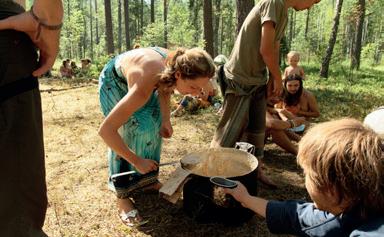
One quickly learns how to camp, live outdoors, go a while without a shower, and be in the moment. There are lots of adventures from listening to old stories, to singing great songs by the fire, to escaping bad weather and storms with minimal gear and shelter.
If cleanliness is your thing, you may tire of this very outdoor lifestyle. But it you love the great outdoors and can imagine yourself dancing naked around a large campfire with 100 drums beating around you, then this may be a great way to live for a while.
: to travel from place to place; you don’t live in one place for long : to start to feel tired :
Ready to work? Organic farms across the world are often in need of physical labour, particularly during the growing and harvest seasons. If you have some farming, or gardening skills, you’ll have a better shot at getting a position on a farm. If the farm is big enough, they may be happy to take on anyone willing to work hard, for long hours, and to learn quickly.
In my experience, living on a farm is not so different from your typical routine. Getting up early is the norm, as is the physical labour. But you learn the important skill of growing food naturally. You participate in a healthy activity that builds strength and stamina, and typically, eat very healthily. You’ll meet great people as well. The farm circuit is full of intelligent, caring folks who like to work, have strong bodies, and smile broadly as they greet the day.
: without using (artificial) chemicals
: the time when crops are gathered from the fields

: physical or mental strength that lets you continue doing something for a long time without getting tired
:
Co-ops are groups of people who share shelter, health care, etc. There may be several in your local area. Cooperative housing provides a community feel. Co-ops share tasks such as cleaning and shopping. They often rotate meal duties, so you might have one night of the week to cook with a partner. Meals are often eaten together, although co-op members typically have more different individual schedules and activities compared to those living in a commune. Members are always free to do their own thing.
Co-ops are a great way to lower costs and live with a sense of community. Some co-ops focus on a purpose as well, such as to recycle, or a charitable cause, which can make life more invigorating.

: to take turns in doing something for a particular period of time
: making you feel healthy, and giving you a lot of energy
:
Of course there’s always the big move. Foreign destinations can offer cheap living with a very different lifestyle to what you’re used to.
Malaysia, Indonesia, Berlin, Central America, and spots in Mexico and South America are popular.
In some countries you’ll find an active expat community. That way you can be around those with a similar background and language to yourself. In other countries, you may need to blend in more with local culture.

The idea here is to stretch your money as far as it will go while truly enjoying life. Want to live near a tropical beach? Own your own ranch? If you can afford a plane ticket and can take some savings with you, you might be able to live several years in a wonderfully different culture.
These five ways of living offer many options to experience life outside the mainstream. Always know that you have options for how you live. If you don't want to follow the rules of your society, you can always choose a life that helps you be happy, have less stress, and that fits with what you value and enjoy. Get out there and have an adventure!
: a group of people who live in a foreign country
: to be able to buy something
: the money you have saved in a bank :
e What is the topic of the text?
f What is the purpose of this text? Tick off the correct answer(s). to give information to give an opinion to give instructions to entertain
g Write the following subtitles above the correct paragraph.
Ashrams, temples & communes
Co-ops
Foreign countries
Organic farms
The Rainbow Family
h Can you derive the meaning of the following words from the context? Explain in Dutch. Explain in English. If necessary, use an online dictionary.
1 mainstream (l. 1):
2 permanent (l. 23):
3 a shelter (l. 28):
4 foreign (l. 65):
i Where should you stay if …
1 you want to have a community feeling and save costs?
2 you don’t mind going without a shower for days.
3 you want to work on your physical skills.
4 love travelling to different places.
j True or false? Correct the false statements. True False
1 You have to donate money if you want to stay in an ashram.
2 The Rainbow Family are nomads.
3 If you don’t mind living outdoors, without any luxuries, The Rainbow Family is a way of living for you.
4 When you work on a farm, you can choose when you get up.
5 If you still want to do your own thing but don’t want to feel alone, you should consider co-ops.
6 If you move to another country, you will no longer hang out with people with a similar background and language.

k Discuss in class why people would choose for an alternative lifestyle.
l If you had to choose one of these alternative lifestyles, which one would it be and why?
Discuss with your partner why you choose that one.
Check: reading Yes I think soNo
Ik kan het onderwerp en het doel van een Engelstalige geschreven tekst bepalen.
Ik kan relevante informatie uit een Engelstalige geschreven tekst halen.
Ik kan de betekenis van moeilijke woorden uit een Engelstalige geschreven tekst afleiden.
10 You are going to watch a video about a specific type of house.
a What types of houses do you know? Discuss in class.
b Watch the first part of the video. Answer the questions.
1 What is Oakey?
2 Did Ben and Michaela always want to buy this type of house? Explain.
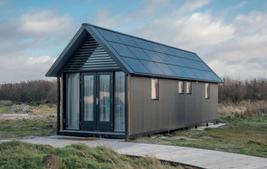
3 Do Ben and Michaela always live on the same spot? Explain.
4 Why did they decide to buy Oakey?
c Watch the second part of the video. Answer the questions.
1 How do Ben and Michaela try to live a zero waste life? Give two examples. 1 2
2 What could you do to make less impact on the environment? Discuss in class.
d Watch the third part of the video. Answer the questions.
1 Describe the main idea of the video in one sentence.
2 True or false? Correct the false statements. True False
1 The curtains are made out of 35 mm films.
2 Michaela and Ben often cook together.
3 What’s a reading nook? Tick off the correct picture(s).

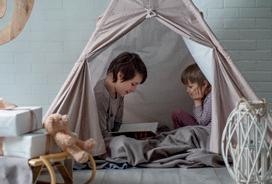

4 'The nook is quite multifunctional.' Explain.
5 Ben is a herbalist. What does that mean?
- First, tick off the definition that you think is correct.
- Then, look up the meaning of the word online and highlight the correct definition. somebody who uses a lot of herbs to cook with somebody who studies herbs somebody who grows, sells or uses herbs, especially to treat illnesses
6 What is kept in the storage loft?
7 Would you live in a tiny house? Discuss in class.
Check: watching Yes I think soNo
Ik kan de hoofdgedachte uit een Engelstalige gesproken tekst halen.
Ik kan relevante informatie uit een Engelstalige gesproken tekst halen.
Checklist: learning about housing
Wat kan ik al?
Wat lukt nog niet goed? Wat moet ik doen om dat onderdeel beter te kunnen?
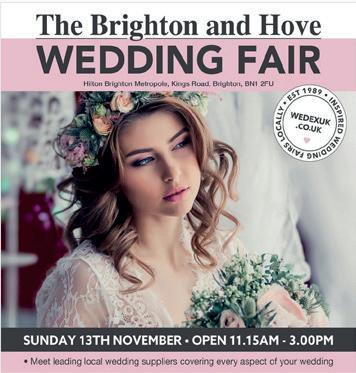
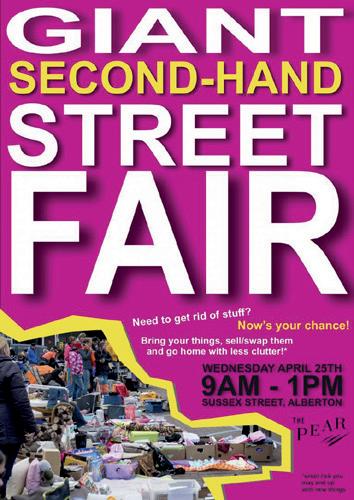

a What is the main purpose of these texts? Tick of the correct answer. to give information to give an opinion to give instructions to entertain to persuade to activate
b Do you think they can also have an extra purpose? Discuss in class.

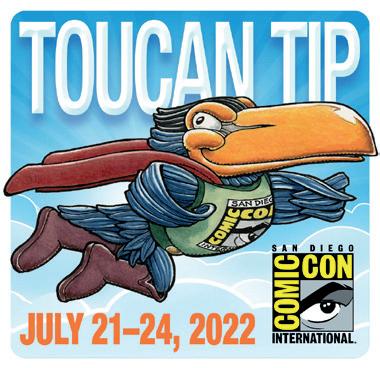
c Look at the following text types. Match them to their correct definition.
a large printed notice, picture, or photograph, used to advertise something or as a decoration
a small sheet of paper, advertising something
a thin book, giving information or advertising something
a (folded) piece of paper, advertising something or giving information on a particular subject
d Which text forms do you recognise in the texts on the previous page? Tick off. Write the numbers of the texts behind each possible type of text.
a leaflet text(s)
a poster text(s)
e Which text(s) might help you out if you …
a flyer text(s)
a brochure text(s)
1 want to get information about DIY items? text(s):
2 are getting married? text(s):
3 are redecorating your house? text(s):
4 want to sell your great-grandmother's clock? text(s):
5 like to dress up as your favourite superhero? text(s):
6 want to buy new clothes, but don’t want to spend too much money on them? text(s):
f What do you think makes a good flyer?
Ik kan relevante informatie terugvinden in een Engelstalige tekst.
2 Look again at the texts of exercise 1.
a Circle how many brands the ‘Home & Living Exhibition’ will show.
The number you circled is a cardinal / an ordinal number.
b Circle in a different colour the day the second-hand fair will take place.
The number you circled is a cardinal / an ordinal number.
You use cardinal numbers to count objects and express a quantity.
e.g. Four and fifteen equals nineteen
e.g. The sale will go on for three days.
You use ordinal numbers to put things in order and to say the date.
e.g. The fair is the second largest book fair in the world.
e.g. Today is 30th November.
3 Complete the grid with cardinal and ordinal numbers. Decimal
Check: cardinal and ordinal numbers Yes I think soNo
Ik weet wanneer ik in het Engels hoofd- en rangtelwoorden moet gebruiken.
Ik ken in het Engels de hoofd- en rangtelwoorden tot 100.
4 Watch the video of a report about an event.
a Answer the questions.
1 Where was this video recorded?
2 What type of event is this?
3 Why do people go to this event?
b Lee talks about the newest trend in kitchen appliances.
1 What is that trend?
2 What is the main advantage of that trend?
c Lee talks about GE appliances. What are those? Look up on the internet.
d What do people want more of after the pandemic?
e What is becoming the most important feature in American houses?
Why do you think that is becoming the most important feature?
f Discuss the following questions in class.
1 Would you visit such a fair if you were building or renovating a house? Why (not)?
2 Which features that you saw in the video would you want in your house?
Check: watching Yes I think soNo
Ik kan relevante informatie uit een Engelstalige gesproken tekst halen.
Checklist: learning about events and fairs
Wat kan ik al?
Wat lukt nog niet goed? Wat moet ik doen om dat onderdeel beter te kunnen?
1 Complete the sentences with the missing household appliances.
1 I’m craving some tea. Where can I find the to boil some water?
2 You should keep ice cream in the , otherwise it may melt.
3 - Hmmm, it smells delicious in here! What are you cooking?
- There is spaghetti sauce boiling on the
4 During summertime, I always dry my clothes outside.
In the winter, I use my
5 We need to call the plumber. There’s no water coming out of the
ex. 1 Ik kan in het Engels woorden rond huishoudelijke toestellen gebruiken. Yes I think soNo
Time to catch up? ex. 1 Time to get ahead? ex. 6
2 Write the correct word concerning housing in front of each definition.
1 : a system that makes the air in a room cooler and drier
2 : a house that is on ground level
3 : a large container in which you sit to wash yourself
4 : a flat hard area near a house, where people sit outside
5 : a house that is joined to another house on one side
6 : a flat outdoor area next to a building or on a roof, where you can sit outside to eat, relax …
ex. 2
Ik kan in het Engels woorden rond huizen gebruiken. Yes I think soNo
Time to catch up? ex. 2 Time to get ahead? ex. 7
3 Which material would you use …
1 to build a house?
2 for a bathroom tile?

3 for a worktop?
4 for a shower screen?
ex. 3 Ik kan in het Engels woorden rond materialen gebruiken. Yes I think soNo
Time to catch up? ex. 3 Time to get ahead? ex. 8
4 Complete the dialogue with: some, any, much, many or a lot of.
Jolene Hi! I’m really interested in the flat you are selling at 5 Brayford Square, London.

May I ask you questions?
Estate agent Yes, of course! What would you like to know?
Jolene It’s not that clear to me how bedrooms and bathrooms the flat has.
Estate agent Well, there are two bedrooms, and a multifunctional room that can be converted into a bedroom if you like. There are two ensuite bathrooms.
Jolene Is there storage where I can put my Christmas tree, boxes with decoration, skis and other belongings?
Estate agent Yes, there’s space to put all your things because next to the parking lot there’s a large storage room.
Jolene Is there an outdoor space?
Estate agent Yes, there’s quite a huge balcony with a jacuzzi on it, an outdoor kitchen and a patio.
Jolene I don’t need of those things. I would prefer to have a green roof instead. How are you asking for the flat?
Estate agent It’s on the market for £1,150,000.
Jolene Hm, that’s money. I’m not sure if I can spend so money on a flat. I’ll think about it. If you have other properties that would work out better for me, please, contact me.
Estate agent I will do. Thank you!
ex. 4 Ik kan in het Engels de woorden ‘some’, ‘any’, ‘much’, ‘many’ en ‘a lot of’ gebruiken om een hoeveelheid aan te duiden. Yes I think soNo
Time to catch up? ex. 4 Time to get ahead? ex. 9
5 Read the extract from the book The Curious Incident of The Dog in the Night-Time.
19
1 5 10
Chapters in books are usually given the cardinal numbers 1, 2, 3, 4, 5, 6 and so on. But I have decided to give my chapters prime numbers 2, 3, 5, 7, 11, 13 and so on because I like prime numbers. This is how you work out what prime numbers are. First, you write down all the positive whole numbers in the world.
Then, you take away all the numbers that are multiples of 2. Then you take away all the numbers that are multiples of 3. Then you take away all the numbers that are multiples of 4 and 5 and 6 and 7 and so on. The numbers that are left are the prime numbers.
The rule for working out prime numbers is really simple, but no one has ever worked out a simple formula for telling you whether a very big number is a prime number or what the next one will be. If a number is really, really big, it can take a computer years to work out whether it is a prime number. Prime numbers are useful for writing codes and in America they are classed as Military Material and if you find one over 100 digits long you have to tell the CIA and they buy it off you for $10,000. But it would not be a very good way of making a living.
Prime numbers are what is left when you have taken all the patterns away. I think prime numbers are like life. They are very logical but you could never work out the rules, even if you spent all your time thinking about them.
Source: The Curious Incident of the Dog in the Night-Time, Mark Haddon
a What is a prime number? Explain in Dutch.
b Why does the author like prime numbers?
c Complete the grid for the following numbers from the text.
d Choose two prime numbers from the text to complete the last two rows of the grid.
short formlong form short formlong form
ex. 5 Ik kan in het Engels de hoofd- en rangtelwoorden tot 100 schrijven. Yes I think soNo
Time to catch up? ex. 5 Time to get ahead? ex. 10
Ready? Tick off the exercises you have to do on page 122-132.
1 Look at the pictures. Write down the name of the household appliances.
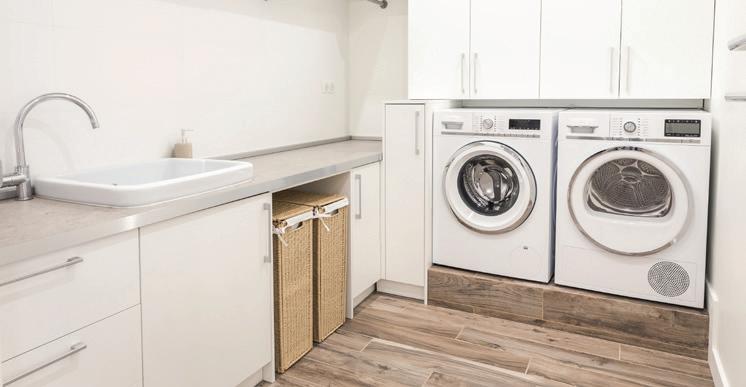

2 Write down the correct word concerning housing underneath each picture. Choose from the box.

a bungalow – a dining room – a garden – a lift – a living room – an office – a patio –a semi-detached house – a (swimming) pool – a terrace – a tree house – a wardrobe











Well done!
3 Which materials are used to build the following items?
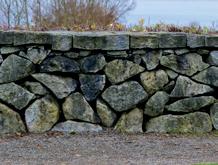



Score ex. 3 < 3
4 Complete the sentences with the correct quantifiers.
Well done!
a Highlight the countable nouns in yellow and the uncountable nouns in green.
b Complete the sentences with: some, any, much, many or a lot of.
1 How candy did you buy?
2 There are people on earth.
3 Have you listened to of his new songs?
4 Would you like tea?
5 My brother didn’t play FIFA games when he was younger.

6 I don't have family members who live in Belgium.
7 I haven’t seen of his films yet.
8 She would like to buy new appliances.
Score ex. 4 < 12
5 Read the text.
a Highlight:
- the cardinal numbers in yellow.
- the ordinal numbers in green.
1 5 10
Well done!
Queen Elizabeth was the longest reigning Queen in British history. She had been on the throne for 70 years. She and her husband, Philip, had 4 children. After she died, Charles, the oldest, became king. He was once married to Princess Diana, but they got a divorce. So he married Camilla, his 2nd wife. Prince William, Charles’s son, has 3 children. Louis is the 3rd child of William and Kate. William is the 1st in line to the throne. His son, George, is the 2nd in line.

The Queen was blessed with a big family. In total she had 8 grandchildren and 12 great-grandchildren. Sienna is the name of the 12th great-grandchild. That’s a big royal family tree.
The Queen adored dogs, more specifically corgis. She owned more than 30 corgis from her accession to her death. During her 70 year-reign, the Queen had 15 Prime Ministers. Liz Truss was the 15th, but after a short period she was replaced by Rishi Sunak.

an accession: een troonsbestijging
b Complete the grid with the cardinal numbers from the text.
c Complete the grid with the ordinal numbers from the text.
6 Watch the video about future household appliances.
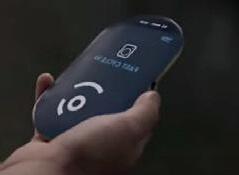
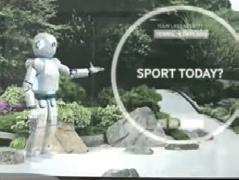
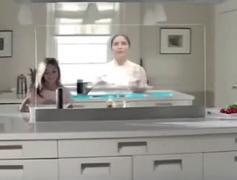
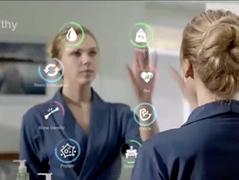
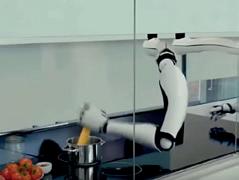

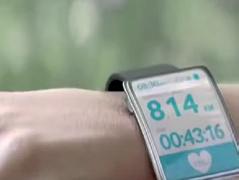


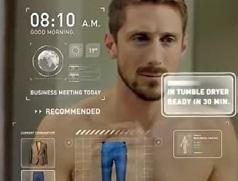
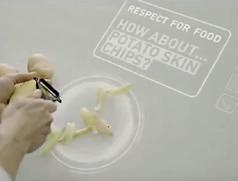
a Which of these household appliances would you want in your house? Choose three and make some notes on why you chose them.
b Are there similar household appliances that we already use today? Which ones? How do we use them? Make notes.
c Choose two of the appliances you saw in the video. What are their advantages and disadvantages?
d Discuss your answers with your neighbour.
e Report your findings to the class.
7 Write down a synonym or definition for the underlined words.
1 Every year my mother stores the Christmas tree and decorations in the attic.
2 My father adores wine. He even has a wine cellar in our house.
3 We have a great family picture upstairs, in the hallway.
4 Did you see the ‘No trespassing’-sign on that property?

5 I always drink a coffee in the morning, on my balcony.
6 How many floors does your block of flats have?
8 Watch the clip.
a What is the main purpose of this video?
b Answer the questions.
1 Cara calls her house an adult playhouse. Why?
2 What is the brand of wall paper in the main seating room?
Fendi
Gucci
Prada
Versace
3 Which material is used for the kitchen worktops?
4 What is a pantry? What do you use it for?
5 When was the house built?
6 Why is Cara such a fan of her architect?

7 What is special about the pool room?
8 Where did Cara get her inspiration for decorating her house?
c How would you describe the style of the house?
d Would you want to live in such a house? Why (not)?
e Give your opinion about the house:
- What do you (dis)like?
- What would you do differently? Make some suggestions.
I think the house looks nice.
I believe the wooden floors make the room look great.
In my opinion, the pink walls are a bad idea.
I feel like the architect really did a good job.
I would say the kitchen is a nice size.
If you ask me, she has wonderful taste.

The way I see it, the house is way too big.
You should use a different colour on the walls.
You could sell the house next year.
Why don’t you install an ensuite bathroom?
What about buying a new bed?
I suggest you redo the kitchen.
Let’s try replacing the sofa.
f Discuss exercise d and e with your neighbour. Together, report your opinion to the class.

We have discussed our opinion about the house. We have discussed what we would keep the same. We have discussed which changes we would make.
9 Read the text and answer the questions.
Buying a house is a big step. That’s why it’s important to do your research first. Never buy a house without getting enough information. That’s how you avoid buying the wrong property, or buying a pig in a poke.
When you see your dream house, make sure to get enough information:
- Visit the house more than once. Take an expert with you.
- Obtain advice from craftsmen, experts, architects, notaries …
- What is the state of the house?
For example: ask the current owner about the electricity standards. Is the house energy-efficient? Is the property located in a flood-sensitive area …?
The owner can prove all of this by means of obligatory certificates when selling a house.

Obligatory certificates
- Electrical compliance certificate
- Soil certificate
- Asbestos certificate
- Energy performance certificate (EPC)
Besides the asking price for the house, you should remember there will be extra costs, such as taxes.
- When buying a new build in Belgium, you need to pay VAT (this is 21 % of the asking price).
- When you buy an older house, you need to pay a registration fee (3 %). You also need to pay notary costs. When buying a house, a plot, or a flat, you need to consult the notary.
In order to finance your house, you probably need to borrow money from a bank, so you need to obtain a mortgage. There are different banks that offer mortgages. You can find a lot of simulators online that will identify the most attractive rates.
a flood-sensitive area: een overstromingsgebied VAT: value added tax (BTW) a mortgage: een lening conditions precedent: opschortende voorwaarden to execute the deed: de akte 'verlijden' (voorlezen en tekenen)
When the buyer and seller come to an agreement, they can agree a sale. The agreement is a sort of proof for the buyer and seller that they have sealed the deal. It will serve as the basis for the notarial deed. If you are not sure yet if you can get a mortgage, choose a sales agreement with conditions precedent. This means you can get out of the sale without having extra costs or paying a fee if you are unable to obtain the funds you need.
Once the sale is agreed, the property will officially be yours after up to four months at the most. Then, the notary will execute the deed.
a What is the purpose of this text? to give information to give an opinion to give instructions to entertain to persuade
b Who is this text meant for?
c In the text they use the idiom ‘to buy a pig in a poke’ (l. 4). A similar saying exists in Dutch. Which one?
d Why should someone take an expert with them before buying a house?
e Mary and John want to buy a house in Belgium, in the Turnhout area. Keep the following facts in mind:
Together, Mary and John earn £3,500 each month (= € )
They have £25,500 in their savings account (= € )
They spend £1,750 each month on food, bills, car, etc. (= € )
They want to have a mortgage for 25 years. Keep the registration fee of 3 % in mind. The house has to have at least two bedrooms, a garden and a garage.
1 Complete the grey box above with the amounts in euro. Use an online converter.
2 It's best not to spend more than one third of your monthly income on a mortgage. How much money can Mary and John spend each month on a mortgage?
3 Go to an online mortgage simulator to discover how much money they can borrow. Mary and John can borrow: €
4 Go to Immoweb's website, and search for properties in the Turnhout area. Select a house for Mary and John. Follow the steps.
Step 1: Look online for the Turnhout postal code.

Step 2: Use the search field on the website to look for a house in their price range. You can also use extra filters.
Step 3: Select a house
f Discuss with a fellow student which house you would choose for Mary and John. Explain why. Keep the (dis)advantages of the house in mind.
10 Read the text on the pictures. Think about the meaning of the sentences.
These are examples of idioms.
a Read the idioms on the left that are often used in sales and marketing.

b Match them to their correct definition.
to provide what is expected
to trick someone, to be deceptive
I want that car, but it costs an arm and a leg
I am not sold on the idea yet.

I had my doubts about the trainee, but she delivered the goods
to be very expensive
to be convinced of something
being prepared for the market place
She was sold a bill of goods. They promised her a necklace with diamonds, but they were fake.
1 What does your dream house look like?
a Go to the YouTube channel ‘Architectural Digest’ and search for your dream house in their ‘Open Door’-series.
b Why is it your dream house? What do you find appealing about the rooms, the appliances and the features? Complete the grid.
The house I pick is the house of:
Rooms that appeal to you?
Why?
Appliances and features the house offers that you like?
Why?
Extra things that are appealing to you?
Conclusion:
Why this house?
How to say that you (dis)like something?
Weak
Like Dislike
I like modern houses. I don't like doing the laundry. I enjoy taking a bath. I am not mad about that carpet.
I love Christmas decorations. I hate vacuuming.
Strong
I adore my bed. I detest cooking!
I am mad about my new sofa!
c Exchange ideas with your neighbour about your dream house. Do you agree or disagree with each other?
Agree Disagree
I suppose.
I’m afraid I disagree. I agree. I beg to differ. You’re right.
I don’t think so I’m with you on that. I (totally) disagree. No doubt about it. That’s not correct/right. Absolutely. You’re wrong. I couldn’t agree with you more! No way!
d Report to a fellow student or to the class why your neighbour has chosen that particular house.
I mentioned which house my classmate has chosen.
I mentioned what my classmate likes about the house: rooms appliances and gadgets extras
I mentioned why my classmate has chosen this house.
2 Would you like to live in a van?
a Watch the video.
b Describe the main idea of the video in one sentence.
c Why did she make this video?
d After watching this video, do you think she likes living in a van?
e What do you think living in a van would be like? Write down some positive and negative aspects of living in a van, according to you.
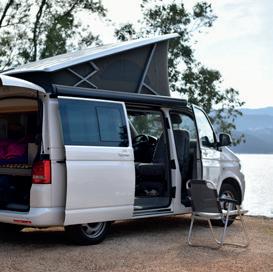
Negative aspects
f Compare your (dis)advantages with those of your neighbour. If needed, adjust your own list.
g Present your findings in front of the class. Don't forget your conclusion: would you like to live in a van or not?
3 You want to buy (or sell) a van. Look at the following three ads.
Make: Volkswagen Miles: 93,205 miles

Price: £21,000
a Work in pairs. Choose one of the ads. - One of you is the seller and one of you is the buyer. - The teacher will give each of you a card with extra information.
b Act out the conversation.
c Switch roles.
76,450 miles
Price: £30,500
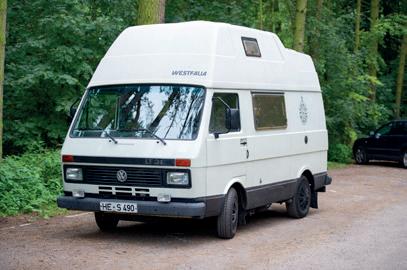
32,450 miles
Price: £47,000
4 Design your own flyer.
a Choose one of the events from page 114:
b Complete the mind map.
What?
Where?
Event:
When? Extra information?
c Design your own flyer. Use the checklist.
Check yourself
I chose the correct size.
I planned my content: I know what I'm selling and who my audience is.
I wrote a strong headline (catchy phrase).
I used language that sells.
I picked a powerful image.
I made it look professional.
I made sure essential information is mentioned.
I used a spelling checker.
d Show your flyer in class.
5 Report about an event.
©VANIN
new design trends comparison with products of last year overview of stores to buy the latest products conclusion of the event
b Report about the event you created a flyer for.
Use:
- the information you gained when designing the flyer;
- the techniques you saw in the video;
- the information from the checklist below.
I mentioned the name, place and date of the event.
In my report I used information from people who were present at the event.
I briefly mentioned my own experiences with the event. My report is built logically:
- I started with general information;
- next, I went more into detail;
- finally, I ended with a conclusion.
c Record your report, and send it to your teacher.
6 Swapping houses: write an email to swap houses with someone you don’t know.
a Go to the website: lovehomeswap.com.
- Type in your home country, and choose a country you want to go to.
- Complete the questions you are asked.
- Choose one of the houses that are suggested for you.
b The owner of the house you picked wants to swap houses with you for three weeks during the summer.
- Read their email on the following page and write a reply.
- Use the information about the house from the website.
- Send the email you wrote to your teacher.
to: house_swapper_123@hmail.com
Thank you for your interest in our house. We would love to visit Belgium, so we are considering swapping houses with you. However, we have some more questions.
We would like to swap for three weeks during the summer period. My wife and I would prefer the last three weeks of August. Could you let me know if that works for you?
We were also wondering if you could give us some additional information:
• How many people will be staying with you?
• Do you have any extra needs we should consider? (baby crib, pets …)
• Are you familiar with the region where you will be staying? Feel free to let us know if there are specific things you would like to do on holiday (sports, nature, culture, hobbies …). We will provide you with some additional information about the area.
• We have a car available for you if you want to rent one. Please let us know in your reply. Also, do you offer any means of transport yourself? We couldn’t find anything on the site.
Finally, we would like to ask you for a favour. We have a couple of pets (a cat and a goldfish). Would you be willing to feed them while you stay here?
If you have any questions for us, please do not hesitate to contact me. We look forward to your reply, and will make the necessary arrangements.
Kind regards
John K.1 Choose a fitting subject
• Keep it short and clear (2 or 3 words).
e.g. summer house swapping
2 Start your email with a greeting.
• In an email to someone you don’t know personally, you use:

- Dear Mr/Ms/Mrs + last name (if you know their name)
- Dear Sir/Madam (if you don’t know their name)
3 Write a short introduction
• Explain why you are sending the email.
e.g. I am writing this email concerning …
• If you reply to an email, thank them for the email they’ve sent you.
e.g. Thank you for your email. I’m looking forward to …

4 In the body of your email you write what you want to say with all the details.
• What do you want to say?
• Which question(s) should be answered or asked?
• Mind!
- Use paragraphs that are not too long.
- Mind your spelling and grammar.
5 Add a conclusion
• Check if the person you send the email to agrees with your plan.
e.g. Does this suit you?
6 End your email with a closing
• In an email to someone you don’t know personally, you use: Kind regards.
• You can also use:
- Yours sincerely (after dear Mr/Ms/Mrs + last name)
- Yours faithfully (after dear Sir/Madam)
7 Don’t forget to put your name under the email.
8 Important: reread your email before you send it.
Checklist: your time Yes I think soNo
Ik kan in het Engels woordenschat rond huizen, materialen en toestellen gebruiken om mijn (droom)huis te beschrijven.
Ik kan in het Engels in een gesprek aangeven wat ik (niet) leuk vind, en waarmee ik (niet) akkoord ga.
Ik kan in het Engels de voor- en nadelen van iets opsommen na het bekijken van een beeldfragment.
Ik kan in het Engels mijn bevindingen over een filmpje in eigen woorden vertellen aan mijn medestudenten.
Ik kan in het Engels een eenvoudig verkoopgesprek houden aan de hand van voorbeeldzinnen.
Ik kan in het Engels een flyer ontwerpen.
Ik kan in het Engels een e-mail beantwoorden.
Wat kan ik al?
Wat lukt nog niet goed? Wat moet ik doen om dat onderdeel beter te kunnen?
























HOUSEHOLD APPLIANCES, FURNITURE AND FEATURES


air conditioning airco
a (bath)tub een bad
a coffee maker een koffiezetapparaat

a cooker een kookplaat
a dishwasher een vaatwasmachine

a flat screen television een flatscreentelevisie

a freezer een diepvries a fridge/ a refrigerator een koelkast


an iron een strijkijzer
an ironing board een strijkplank

a kettle een waterkoker lighting verlichting


a microwave (oven) een microgolfoven

a sink een gootsteen a tap een kraan



a toaster een broodrooster

a (tumble) dryer een droogkast




a vacuum cleaner een stofzuiger
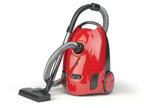

a washing machine een wasmachine
a wardrobe een kleerkast

Words Translation My notes
(a) property vastgoed, een eigendom
a square metre/foot een vierkante meter/voet
HOUSING MATERIALS one hundred and forty-one




1 A lot of, many and much
Countable
Uncountable
(+) We bought a lot of apples. I always drink a lot of coffee.
(–) (?) I didn’t buy many apples. Did you buy many apples?
I bought some apples. I drank some coffee. I didn’t buy any apples. I don’t eat any sugar.
We don’t drink much coffee. Do you drink much coffee?
Did you buy any apples? Do you add any sugar to the cake?
Mind!
In a question that is an offer or a request, you use ‘some’ instead of ‘any’.
Would you like some extra topping on your ice cream? offer Can you give me some advice on the matter? request
You use cardinal numbers to count objects and express a quantity.
e.g. Four and fifteen equals nineteen
e.g. The sale will go on for three days.
4 four
15 fifteen + th
27 twenty-seven
Mind! 1
You use ordinal numbers to put things in order and to say the date.
e.g. The fair is the second largest book fair in the world.
e.g. Today is 30th November.
4th fourth
15th fifteenth
27th twenty-seventh

I like modern houses.
Dislike

I don't like doing the laundry.
I enjoy taking a bath.
I love Christmas decorations.
I adore my bed.
I am mad about my new sofa!
I am not mad about that carpet.
I hate vacuuming.
I detest cooking!
• Who are you writing this email to?
- Informal email: friends or family
- Formal email: teacher, school, boss or someone you don’t know
• What do you want to write?
- What should be in your email?
- Which questions do you need to ask/answer?
• Choose a fitting subject Keep it short and clear (2 or 3 words).
• Start your email with a greeting
In an email to someone you don’t know personally, you use:
- Dear Mr/Ms/Mrs + last name (if you know their name)
- Dear Sir/Madam (if you don’t know their name)
• Write a short introduction
- Explain why you are sending the email.
- If you reply to an email, thank them for the email they’ve sent you.
• In the body of your email you write what you want to say with all the details.
- What do you want to say?
- Which question(s) should be answered or asked? Mind!
- Use paragraphs that are not too long.
- Mind your spelling and grammar.
• Add a conclusion
Check if the person you send the email to agrees with your plan.
e.g. Does this suit for you?
e.g. If you have any questions, please do not hesitate to contact me.
• End your email with a closing
- In an email to someone you don’t know personally, you use: Kind regards.
- You can also use:
Yours sincerely (after dear Mr/Ms/Mrs + last name) Yours faithfully (after dear Sir/Madam)
• Don’t forget to put your name under the email.
• Important: reread your email before you send it.
• Check if the email address is correct.
• Check whether you have filled in the subject of the email.
• Check (if needed) whether you attached the correct document(s).

1 What do you see in the picture?
2 Which words that are related to the picture do you already know?
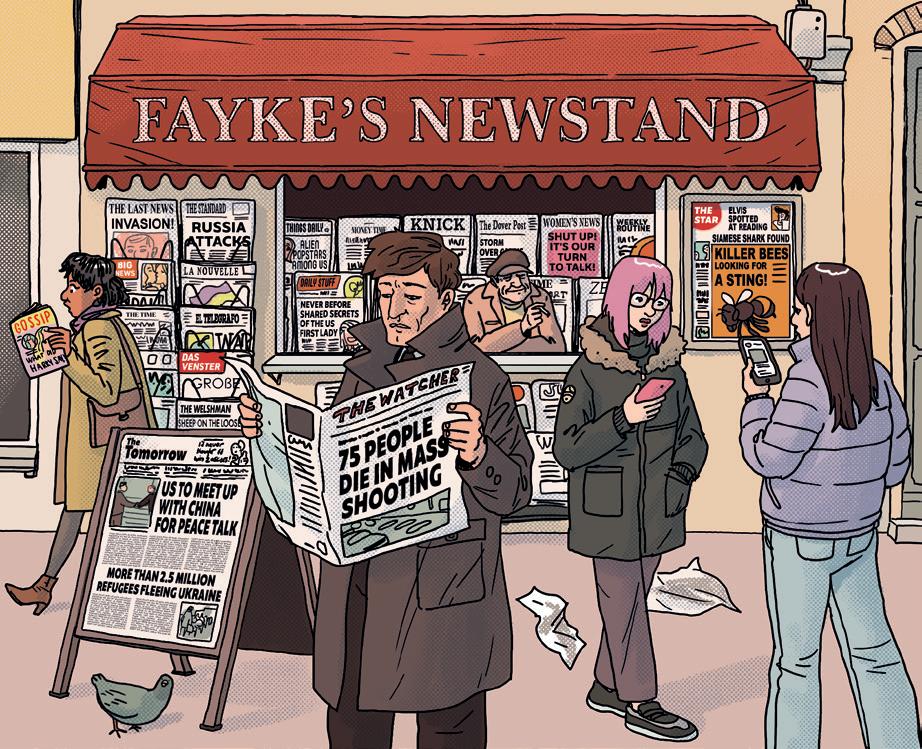
3 Listen to the song. What do you want to learn about in this unit?
1 In today’s world we get our information from many different places.
a Which types of media do you know?
b Where do you get your information about what’s happening in the world?
c Do you think that you can trust all the information you hear or read? Discuss why (not).

2 Read the title of the text on the next page.
a What is the topic of the text?
b What type of text is this?
an article
a blog post an excerpt from a book
a short story
c What do you think ‘bots’ are?
d Read the text and answer the questions.
Fake news spreads much faster than real news. A recent study says real people –not bots – are to blame
Researchers at the Massachusetts Institute of Technology (MIT) say fake news are stories that can be debunked by six major fact-checking services. It can spread 10 times faster than real news stories. The researchers studied rumours spread on Twitter and other social media between the launch of Twitter in 2006 and 2017. Some U.S. lawmakers and other critics have blamed automated bots for the spread of fake news. However, the MIT researchers filtered out tweets spread by bots for their study.
The researchers found that false news not only spreads faster than true stories, but it also had a much wider reach The top 1 percent of so called ‘news’ tweets reached between 1,000 and 100,000 people, while true information rarely reached more than 1,000 people.
The research team divided news into different categories: politics, business, natural disasters, etc. In all categories, false news spread farther and faster than true news. False political news spread the fastest, however.
The team studied more than 4.5 million tweets. The researchers used two state-of-the-art bot detection services to filter out tweets spread by bots.
The team found that bots do accelerate the spread of fake news, but they also accelerate the spread of true news at about the same speed.
“Bots cannot explain this massive difference between how fast and far false news spreads compared to the truth,” a professor at MIT said. “Human beings are responsible for that.”

The researchers didn’t investigate whether people spreading false news were doing it maliciously, or because they believed it was true. They found that people spreading fake news generally had fewer followers and tweeted less often than those sharing true news stories. So false news spread faster and farther even though it was spread by less experienced Twitter users.
to debunk: to prove something is false a launch: a start of something a lawmaker: someone who makes the rules state-of-the-art: the newest, the most modern to accelerate: to make something go faster maliciously: with evil or bad intentions
“People who spread fake news may do so because it’s fun and because they may gain followers by sharing new information”, the professor said “New and exciting information is more valuable than information you already know.”
e Describe in one sentence what the text is about.
f Highlight the sentence in the text that explains why bots are not to blame for the spread of fake news.
g Which type of false news spreads the fastest?
h Why does fake news travel so much faster than true news?
i What do they mean when they say fake news is more ‘valuable’? Discuss.
j Discuss in class. Do you think it is easy to know which news is fake news and which news is real news? Explain your answer.
k Can you think of events about which a lot of fake news was spread?
l What words related to news and media did you read in the text? Write down three.
3 Look at the interactive picture and discover the words related to reality, news and media. Listen to the pronunciation and check the spelling.
4 Fill in the correct word related to reality, news and media.
1 Facebook, Twitter, Instagram and Snapchat are all types of
2 When what you say is not a lie, you are telling the .
3 Something that you can prove with research and studies is a
4 Something people say about someone, without knowing if it is true, is a .
5 News that cannot be proved, but sounds exciting is usually news.
6 Hurricanes, tsunamis, and floods are
7 are what they call a Twitter post.
Check: vocabulary ‘reality, news and media’
Ik ken in het Engels woorden rond nieuws en media.
Yes I think soNo
5 Read the following sentences from the text from exercise 2.
l. 9 The researchers studied rumours spread on Twitter.
l. 14 The MIT researchers filtered out tweets spread by bots for their study.
l. 17 The researchers found that false news not only spreads faster than true stories, but it also had a much wider reach.
l. 43 The researchers didn’t investigate whether people spreading false news were doing it maliciously, or because they believed it was true.
a Highlight the correct answer.
1 The words in red are nouns / verbs / adjectives
2 They are written in the present simple / past simple tense.
b Use the words printed in red to complete the table.
6 Do you remember how to use the past simple? Go to the interactive picture and watch the instruction videos or scan the QR codes to refresh your memory.
7 Put the infinitives from the box in the past simple tense. They can be positive or negative.
1 to study The scientist the COVID-19 virus to find a cure.
2 to take Elon Musk control over Twitter in 2022.
3 to live Prince Harry and his family in the UK to move before they to the USA.
4 not The Ukraine to go to war, to plan but they had to defend their country.
8 Ask a yes-no question using the past simple for each sentence.
Yes, the president had a lot of followers on Twitter.
Yes, gas became very expensive during the war in the Ukraine.
No, the Queen of England didn’t die in 2021; she died in 2022.
Yes, I thought Santa Claus was real when I was a child.
9 Watch the video from The New York Times about deepfakes by Claire Wardle, an expert in online manipulation.
a Do you know what deepfakes are and what they are used for? Discuss with your class.
b Watch the video.
c What is the purpose of this video? Tick off the correct answer(s). to give information to persuade to activate
to give an opinion to entertain
d How do you think deepfakes can be used in bad ways?
e Do you think deepfakes can be used to do good things? Why (not)? Discuss in class.
f True or false? Correct the false statements. True False
1 Artificial intelligence is used to make deepfakes.
2 Deepfakes cannot cause any damage.
3 Deepfakes are getting more expensive to make.
g In the video the following thing is mentioned. What do they mean by this? Discuss in class.
‘What really keeps me awake at night is less the technology. It's how we as a society respond to the idea that we can't trust what we see, or what we hear.
You can see where this road leads. As public trust in institutions like the media, education and elections dwindles, democracy itself becomes unsustainable The way that we respond to this serious issue is critical.’
a society: a community to dwindle: to become less unsustainable: cannot be kept alive or working
h Why is the hype around deepfake more dangerous than the technology itself?
i Look up deepfakes online.
1 Try to find an example of a deepfake. What is its main purpose? to entertain to persuade to scare to help
2 Share your findings with the class.
Ik kan het doel van een Engelstalige gesproken tekst bepalen.
Ik kan de hoofdgedachte van een Engelstalige gesproken tekst bepalen.
10 Use the given words to make a correct WH-question to the following statements that were made in the video from the NYT about deepfakes.
1 What – Obama – Trump – to call – ?
Question:
Answer: He (supposedly) called him a dipshit.
2 How – Nancy Pelosi – to appear – to be – ?
Question:
Answer: She appeared to be drunk.
3 How – the use of deepfakes – to start – ?
Question:
Answer: It started as a basic face-swapping technology.
11 Read this reaction to the video from the NYT about deepfakes. Put the verbs between brackets in the past simple tense.
Deepfakes. Wow! (who, to know) that we (can) be fooled so easily. They even (to get) President Obama to call President Trump a dipshit! Before watching this I (not to know) this (to be) possible. To be honest, I (to believe) everything I (to see) and (to hear) online.
After watching this clip about deepfakes, I (to research) some things that (to appear) online. Do you want to know what I (to find) out? There are people who actually doubt everything!
To some degree, I can understand them. Technology has made it so easy to make things seem different than they are. Poor Nancy Pelosi! They (to slow) her video down and now people think she (to be) drunk!
So there are people who think that if we can impersonate anyone using AI, how do we know our favourite actors actually (to play) in the films we watch, or if COVID-19 (to be) real. Some even ask themselves: man really (to walk) on the moon in 1969? Elvis Presley really (to die)? Maybe he just (to disappear) because he (to hate) all the publicity! Those people are wondering: (when, we, to become) puppets in this crazy media circus?

Please, everyone just remain calm. We (actually, not to turn) into puppets. Thankfully humans (to be) all born with a brain. That’s the good news. No one ever (to say) that you have to believe or doubt everything. Use your common sense. It can be smart to be sceptical about things we watch, read or hear online. It never (to hurt) anyone to do a little research. Don’t let things like deepfakes scare you into thinking no one can be trusted. Just know that you have to stay alert. Keep your eyes and ears open. If something sounds too crazy, too good or even too bad to be true, it just might be.
Do you want more practice? On diddit you can find extra practice materials.
Check: past simple Yes I think soNo
Ik kan de ‘past simple’ gebruiken in mededelende, ontkennende en vragende zinnen.
Ik kan ja-neevragen stellen in de ‘past simple’.
Ik kan vraagwoordvragen stellen in de ‘past simple’.
12 Watch the video.
a What is the topic of the video?
b What is the main purpose of this video? to give information to entertain to persuade to activate
c What type of newspapers are the tabloids discussed in the video? Tick off the correct answer(s). newspapers that are meant to tell the truth newspapers that are meant to entertain us newspapers full of facts
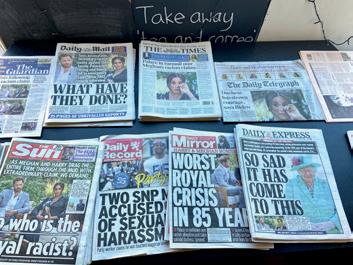
sensational newspapers newspapers full of gossip
d Which characterising words do they mention in the video when they talk about each convention of tabloids?
sensational headlines provocative images short pieces biased language humour voice and tone
large entertaining shocking exclamation marks irony
a convention: a typical characteristic biased: not objective
Sarcasm is a form of humour in which you say one thing, but actually mean the opposite. e.g. When you just had a very boring maths class, you could say: ‘Wow, that was interesting.’
Irony is a form of humour in which the situation is the opposite of how it is expected to be. e.g. A man doesn’t eat sea food because he’s afraid of getting food poisoning, but then gets food poisoning from a vegetarian lasagne.
Sarcasm is often used to insult someone or talk down to them. Irony is meant just to be funny. It’s been said that irony is a form of humour typical for the British, while in America they would rather use sarcasm. The British sometimes say the Americans don’t understand irony.
e Look at the front pages of these newspapers.



1 Tick off the ones that you think are tabloids.

2 Write in a few words why you think this.

f Are the sentence types typical for broadsheet newspapers, tabloids or both? Tick off the correct answer(s).
1 Statements provide information and are written in the present tense. They usually end with a full stop e.g. The Queen is dead.
2 Questions end with a question mark e.g. Where did we go wrong?
3 Imperative sentences give a command, a warning, an instruction … and end with a full stop or an exclamation mark e.g. Wake up before you miss the bus.
4 Exclamations express strong emotion and always end with an exclamation mark e.g. Busted!
g Choose one headline from the newspapers in exercise e. Rewrite this headline as:
1 a statement:
2 a question:
3 an imperative:
4 an exclamation:
Check: broadsheet newspapers and tabloids
Ik kan de verschillen benoemen tussen Engelstalige kwaliteitskranten en roddelkranten.
Ik kan in het Engels verschillende soorten zinnen herkennen.
Checklist: learning about reality, news and media
1 Read the excerpt from the book Ready Player One by Ernest Cline and answer the questions.
I’d attended school in the real world up until the sixth grade. It hadn’t been a very pleasant experience. I was a painfully shy, awkward kid, with low self-esteem and almost no social skills — a side effect of spending most of my childhood inside the OASIS. Online, I didn’t have a problem talking to people or making friends. But in the real world, interacting with other people — especially kids my own age — made me a nervous wreck. I never knew how to act or what to say, and when I did work up the courage to speak, I always seemed to say the wrong thing. My appearance was part of the problem. I was overweight, and had been for as long as I could remember. My bankrupt diet of government subsidised sugar-and-starch-laden food was a contributing factor, but I was also an OASIS addict, so the only exercise I usually got back then was running away from bullies before and after school. To make matters worse, my limited wardrobe consisted entirely of ill-fitting clothes from thrift stores and donation bins — the social equivalent of having a bull’s eye painted on my forehead. Even so, I tried my best to fit in. Year after year, my eyes would scan the lunchroom like a T-1000, searching for a clique that might accept me. But even the other outcasts wanted nothing to do with me. I was too weird, even for the weirdos. And girls? Talking to girls was out of the question. To me, they were like some exotic alien species, both beautiful and terrifying. Whenever I got near one of them, I invariably broke out in a cold sweat and lost the ability to speak in complete sentences.
For me, school had been a Darwinian exercise. A daily gauntlet of ridicule, abuse, and isolation. By the time I entered 6th grade, I was beginning to wonder if I’d be able to maintain my sanity until graduation, still six long years away.
Then, one glorious day, our principal announced that any student with a passing grade-point average could apply for a transfer to the new OASIS public school system. The real public school system, the one run by the government, had been an underfunded, overcrowded train wreck for decades. And now the conditions at many schools had gotten so terrible that every kid with half a brain was being encouraged to stay at home and attend school online. I nearly broke my neck sprinting to the school office to submit my application. It was accepted, and I transferred to OASIS Public School #1873 the following semester.
a government: the people who run a country to subsidise: to give money to a project starch: carbohydrates in food e.g. potatoes a T-1000: a robot from the film Terminator invariably: always a gauntlet: an attack ridicule: an act of making fun of someone underfunded: not enough money is given to keep things up to date prior to: before to be spawned: to be born
Prior to my transfer, my OASIS avatar had never left Incipio, the planet at the center of Sector One where new avatars were spawned at the time of their creation There wasn’t much to do on Incipio except chat with other noobs or shop in one of the giant virtual malls that covered the planet.
If you wanted to go somewhere more interesting, you had to pay a teleportation fare to get there, and that cost money, something I didn’t have. So my avatar was stranded on Incipio. That is, until my new school emailed me a teleportation voucher to cover the cost of my avatar’s transport to Ludus, the planet where all of the OASIS public schools were located. There were hundreds of school campuses here on Ludus, spread out evenly across the planet’s surface. The schools were all identical, because the same construction code was copied and pasted into a different location whenever a new school was needed. And since the buildings were just pieces of software, their design wasn’t limited by monetary constraints, or even by the laws of physics. So every school was a grand palace of learning, with polished marble hallways, cathedral-like classrooms, zero-g gymnasiums, and virtual libraries containing every (school board–approved) book ever written.
a constraint: something that holds you back, a limit zero-g: no gravity to keep you on the ground
a What genre do you think this book is? Tick off your answer(s).
(sci-fi)
b Discuss these questions in class:
1 Do you think this story takes place in the past, the present or the future? Explain your answer.
2 How old do you think the main character is?
3 What do you think the OASIS is?
c Do you think this character is wealthy, or rather poor? Explain your answer.
d True or false? Use a sentence from the text to prove your answer. True False
1 The main character was very popular in real life school.
2 There is only one planet in the OASIS.
3 Going to interesting places in the OASIS costs a lot of money.
e Did you find this excerpt difficult to read? Why (not)?
f Is this a book you would like to read? Explain why (not).

g What do you think will happen in the rest of the story? Discuss.
Check: reading Yes I think soNo
Ik kan vragen beantwoorden bij een Engelstalige literaire tekst.
Ik kan mijn mening geven over een Engelstalige literaire tekst.
Ik kan het vervolg van een Engelstalige literaire tekst voorspellen.
2 Look at the interactive picture and discover the words related to virtual reality.


3 Look at the pictures and fill in a correct word from the vocabulary related to virtual reality.
4 Complete the sentences with a correct word from the vocabulary.
1 The place where we live, and what we experience physically, is called the r
2 VR in video games stands for v reality.
3 People don’t write letters anymore; they usually just send an e .

4 All the extra games and apps you add to your computer is called s

5 When someone can disappear, and show up somewhere else, it is called t

5 Read the statements below.
a Highlight the way things were for the main character before his transfer.
b Underline the way things were after the transfer.
1 He used to attend school in the real world until he went to school in the OASIS.
2 He used to be shy, but online he didn’t have a problem talking to people.
3 His avatar didn’t use to leave Incipio.
c Write down the verb forms that you see in the highlighted parts.
6 Listen to the song Used to by Daughtry.

a Highlight the statements that you hear in the song.
1 We used to have this figured out.
2 We used to have this under control.
3 You used to love to be with me.
4 We never thought, we used to know
5 You used to talk to me like I was the only one around.
6 They used to say we were crazy.
7 I used to follow you.
8 No one ever used to care
9 We used to breathe without a doubt.
10 Can we get this back to how it used to be?
b What do you think it means when you use the term ‘used to’? Tick off the correct answer. We still do this.
This is the way it is, and it will always be like this. In the past it was like that, but it is not like this today. In the future it will be like this.
7 Look at the grammar box and discover how to use the form ‘used to’.
You use ‘used to’ to say that something was true in the past, but is no longer true in the present.
1 Positive form
When I was a child, I used to play with Lego. (But, I don’t play with them now.)
Rule: used to + base form
2 Negative form
When my parents were young, they didn’t use to have internet. (But, they do have internet now.)

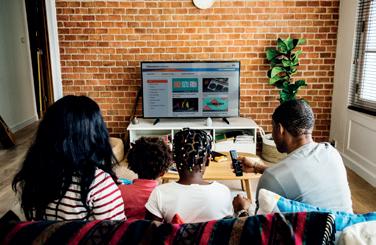
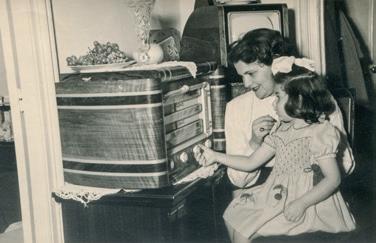
Rule: didn’t use to + base form
3 Questions
Did you use to play sports? No, I didn’t Yes, I did Rule: Did + subject + use to + base form (+ rest of the sentence) + ?
Where did he use to live? He used to live in London.
Rule: WH-word + did + subject + use to + base form (+ rest of the sentence) + ?
8 Look at the pictures. Use the form ‘used to’ to say what happened in the past but doesn’t anymore.

My grandmother the dishes by hand.
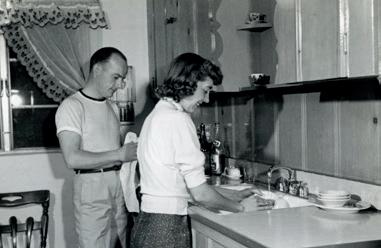
Most people have a dishwasher.

They mobile phones.
Almost everyone has a mobile phone.

9 Ask a correct question to the underlined parts of the answers. Use the form ‘used to’.
1

No, I never played with dolls. 2
I used to go to school in London. 3
I used to have a crush on Brad Pitt. 4
I used to fight with my brother because he was annoying.
Check: used to Yes I think soNo
Ik kan in het Engels de vorm ‘used to’ gebruiken in mededelende zinnen.
Ik kan in het Engels de vorm ‘used to’ gebruiken in ontkennende zinnen.
Ik kan in het Engels de vorm ‘used to’ gebruiken in vragende zinnen.
10 The book Ready Player One was made into a film in 2018. Watch the clip.
a What do you think the purpose of this clip is?
b Who was the OASIS created by?
c Did the world in the trailer resemble the world you imagined while you read the excerpt? Discuss.
d Why do they call his generation ‘the missing millions’?
e Match the sentence parts on the left to the sentence parts on the right to make correct sentences. means complete control over the future.
f What are ‘the stacks’? Describe in English or in Dutch.
g What do the players have to do in the contest?
h Do you think the contest is dangerous? Explain your answer.
11 Look at the interactive picture and discover more words related to virtual reality.
12 Write a word from the vocabulary that fits the description.
1 a game between players or teams where only one can win
2 when you have this, you make all the decisions
3 creative ideas that come from your brain
4 a border to what is possible
5 a group of people born in the same time period
Check: vocabulary ‘virtual reality’
Ik ken in het Engels woorden rond virtuele realiteit.
Ik kan vragen beantwoorden bij een Engelstalige gesproken tekst over het thema ‘virtuele realiteit’.
Checklist: learning about virtual reality
Wat kan ik al?
Yes I think soNo
Wat lukt nog niet goed? Wat moet ik doen om dat onderdeel beter te kunnen?
1 Write down words from the vocabulary about reality, news and media that … a fit the description.

1 something said about people that isn’t true:
2 to say someone is guilty of something:
3 information about what is happening in the present time:
4 a hurricane, a tsunami, an earthquake ... : b are the opposite.
1 false:
2 real:
3 the lies:
4 something that can’t be proven:
5 not worth anything:
6 to keep something to yourself: ex. 1 Ik kan in het Engels woorden rond realiteit, nieuws en media gebruiken. Yes I think soNo
Time to catch up? ex. 1 Time to get ahead? ex. 6
2 Fill in the correct form of the past simple to complete the article about the first serial killer: Jack the Ripper. 1
In 1888, a series of brutal slayings in the Whitechapel district of East London (1 to be) widely reported. The newspapers of the time (2 to describe) accounts of the eleven murders, typically involving prostitutes, in graphic detail. Many (3 to try) to profit from the high profile case by spreading fake news. But (4 what, they, to do) to people who spread fake news in those days?
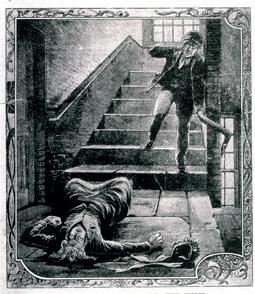
Police (5 to arrest) two young men, full of drink, and (6 to charge) them with spreading fake news. The pair (7 to be) in Wright’s Lane in Kensington with their bundles of newspapers, and people (8 hear) them shout “Arrest of Jack the Ripper Tonight” at the top of their voices. William Macdonald and George Write, news vendors, were taken before the court but later discharged.
a slaying: a terrible murder a bundle: a pack, a bunch to discharge: to release
James Kendrick, another news vendor, (9 to be) also charged with crying out false news about Jack the Ripper. After slow Sunday sales, he (10 to begin) calling that there (11 to be) a “Horrible Discovery of a Missing Woman at Charing Cross”. Later, he (12 to cry) out that police (13 to discover) four women. The Ripper (14 to slash) them at Charing Cross. One customer, who (15 to buy) one of his papers, didn’t find any articles saying this inside and he (16 to take) the matter to the police. The judge asked him: “(17 Why, you, to lie)?” All the vendor (18 to say) was that he just (19 to want) to sell newspapers. The judge (20 not to show) pity for the news vendor. He was sentenced to 14 days in jail. (21 The judge, to do) the right thing?

pity: sympathy for someone’s misfortune

ex. 2 Ik kan werkwoorden vervoegen in de ‘past simple’. Yes I think soNo Time to catch up?
3 Look at the headlines.

a Circle ‘N’ if you think the headline is from a(n online) newspaper, and ‘T’ if you think it’s a tabloid.
b Write a short reason why you think this behind the letter you circled.
ex. 3 Ik kan de verschillen tussen nieuws- en roddelkranten in Engelse bronnen herkennen. Yes I think soNo
Time to catch up? ex. 3 Time to get ahead? ex. 8
4 Complete the sentences with the correct form of ‘used to’. They can be positive or negative.
1 People (to write) letters instead of sending emails.
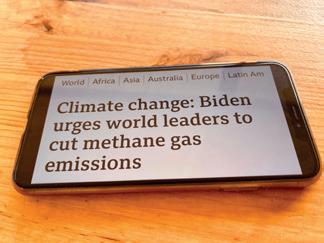
2 Girls and boys (to go) to the same schools.
3 Did people (to spend) as much money as they do now?
4 I don’t understand why the British and the Irish (to hate) each other.
5 When our parents were young, it (to snow) more often than it does now.
6 No other form of media except the radio and the newspaper (to exist).

7 Dad didn’t (to be) bald. He (to have) hair.
ex. 4 Ik kan ‘used to’ gebruiken in mededelende, ontkennende en vragende zinnen. Yes I think soNo
Time to catch up? ex. 4 Time to get ahead? ex. 9
5 Complete the text. Choose words from the box. You may use the words more than once. an avatar – to imagine – to interact – online – software – to teleport – a universe – virtual –a world
Metaverse is a shared, 3D space that brings people together from all over the globe. The metaverse is the ultimate experience – an ever-evolving, incredible that allows you to explore, create and
in ways that are simply impossible anywhere else.
a place where you can build your perfect world – a place that’s unique and tailored to your exact specifications. being able to transform into any , to incredible locations for adventures, or take part in exciting events. The metaverse is a living, breathing ecosystem that’s open to exploration and collaboration like never before.
Players can explore vast open , engage in exhilarating battles, and customize characters to their heart’s content. With metaverse technology, anything you can can become a reality. Whether you’re looking for a social network, an immersive gaming environment, or an entire world to explore, metaverse has something for everyone!
Basically there is this futuristic view of the internet in which people communicate with each other and agents through in a 3D environment called the metaverse. This term was used to describe an advanced version of the internet where humans could exist as programmable identities.
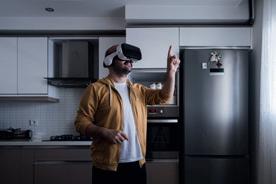
Adapted from: comearth.world
ex. 5 Ik kan een Engelstalige tekst aanvullen met woorden rond virtuele realiteit.
Time to catch up? ex. 5
Time to get ahead? ex. 10
Yes I think soNo
Ready? Tick off the exercises you have to do on page 168-175.
time to catch up
1 Put the letters in the correct order to make the word about reality, news and media that you see in the picture.


Score ex. 1 < 6 >/= 6
Well done!
2 Put the verbs in the box in the correct form of the past simple.
1 to spread People rumours about Princess Diana.
2 to lie Why about so many things?
3 not to believe The judge a word

4 to say the criminal
5 to post The President a lot on Twitter.

6 to write Which journalist about Greta Thunberg?

7 not to understand They why JFK was killed.
8 to cause the tabloids the royal family a lot of problems?
Score ex. 2 < 6 >/= 6
Well done!
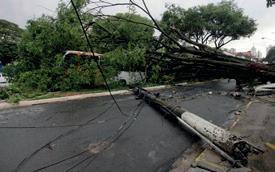
4 What did these people use to do?

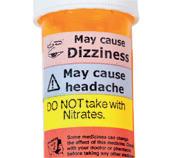
a Complete the sentence for each picture. Use the positive form of ‘used to’.
See p. 161
to type to dance to fix to keep 2 4

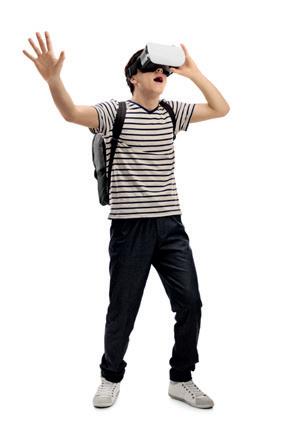
Josh and David bikes. Grandfather bees.

b Write sentence 3 and 4 in the negative form of ‘used to’.
Score ex. 4 < 4
>/= 4
Well done!
5 Name the things about virtual reality you see in the pictures. Choose a word from the box. a code – to design – an email – to imagine – a side effect –a universe – virtual reality


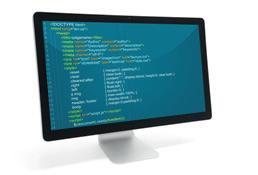
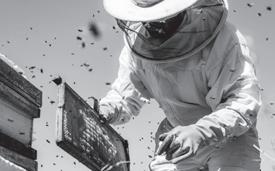
Score ex. 5 < 4
>/= 4
Well done!

6 Go to the website stopfundinghate.info.
a Tick off the purpose(s) of this website. to give information to give an opinion to entertain to persuade to activate
b Go to the tab ‘Our Videos’ and watch the video Stop Funding Hate Crowdfunder
1 According to the video what do the tabloids use to sell newspapers? They use and
2 Explain in your own words what those two words mean. You may use the internet to help.
3 Explain what they mean by ‘Hate pays.’
c What do you think ‘brand values’ means? Discuss with a classmate.
d Which three brand values do advertisers like to promote, according to the video?
1 Look online to see what these words mean if you don’t know already.
2 Write ‘H’, ‘D’ or ‘I’ before each sentence to say what they are examples of. Anyone can buy our product no matter which race, age, or gender you are. Our product is the most expensive one of its kind, but it is also the best. We do not promote animal testing, or child labour.
e Describe the goal of this campaign in one sentence.
f What does this website say that we can do to help their cause?
7 Take a look at the following sentences.
a Highlight the subject in each sentence.
b Tick off the sentences where the subject isn’t the one who did the action. The President was killed during a parade. Some tabloids printed very strange stories about aliens. Rumours were spread about every person in the royal family. Michael Jackson was named ‘Wacko Jacko’ because of his strange habits. Princess Diana died in a car accident.
c Write down the verb forms from the sentences you ticked off.
d These sentences were written in the passive voice Look at the grammar boxes below to discover the passive voice.
In active sentences the subject is the one who does the action. Journalists spread rumours about every person in the royal family. subject verb
In passive sentences someone or something other than the subject does the action. You don’t always know who or what. Rumours were spread about every person in the royal family. subject verb form
Rule: the past simple of ‘to be’ (was/were) + the past participle of the main verb
regular verbs = the past simple form of the verb
irregular verbs See list on p. 186
If you use the passive voice you don’t have to mention who or what did the action. It may be unknown, unimportant, obvious or secret.
e.g. The post office was robbed last week. (We don’t know by who.) The thief was arrested last night. (It’s obvious who arrested the thief.)
e Rewrite the sentences in the passive voice.
1 The government made alcohol illegal in the US in 1920.
2 The journalist wrote an article about fake news.
3 The teachers took the children on a field trip.
4 Paparazzi followed Britney Spears around day and night.

5 The police arrested the thief before he could run away.
8 Go to the following websites: perezhilton.com
− omg.yahoo.com www.tmz.com
a What is the purpose of these websites? to give information to entertain to persuade to activate
b Who are most of the articles about?
c Do you find these sites interesting? Why (not)?
d Why do you think people like to read articles on websites like these? Give two reasons.
e Do you think celebrities like it when articles about them appear on these websites? Explain your answer.
f Write down the headline of an article you would like to read. Explain why you would want to read it.
g Read the article.
h Write a short reaction to this article on the sheet your teacher gave you. Use the following checklist to help you.
Start your reaction with a general sentence that describes how you feel.
e.g. This man is absolutely crazy!
Say why you feel this way.
Say if the article changes the way you see this celebrity and why (not).

End with a strong quote.
e.g. That’s it for me!
i Now read the article that your classmate chose.
j Respond to your classmate’s reaction. Keep the checklist in mind.
9 Use the form ‘used to’ to write correct statements about each picture.
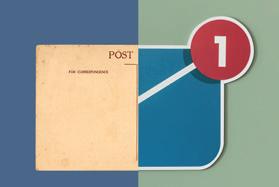
a Write one positive statement for each picture.
b Write one negative statement for each picture.
c What is different about your life now from when you were a small child?
Use ‘used to’ to write a positive and a negative statement as you did in exercise a and b.

10 Watch the clip.
a What is the purpose of this clip? to give information to entertain to persuade to activate
b Describe the main idea of the clip in one sentence.
c Why should VR be accessible for everyone?
d Order the steps. Write numbers from 1-5. You come across a WebVR experience.
Boom! You’re in VR.
You just tap the link.
You’re in a browser like Chrome.
You put on a headset.
e In which three ways do they mention using VR? 1 2 3
f What can you find on the website webVRexperiments.com?
g What can you do on the website? Name three things. 1 2 3
h Why was the website made?
1 Interview an older person about what the world was like when they were your age.
a Choose an older person that you would like to interview. This can be a grandparent, a parent, a neighbour, a teacher ...

b Prepare the questions you want to ask them.
- Use ‘used to’ in your questions.
e.g. How did you use to go to school?
- Use the topics in the box, or choose your own topics. meeting new people getting to school studying doing presentations meeting up with friends weekend activities
c Conduct the interview. Don’t forget to record the interview. Tip: it’s also wise to make notes in case something goes wrong with the recording.
d Type out the interview. Make sure to use the form ‘used to’ in your questions and answers.
ME: e.g. How did you use to go to school?
Elder: e.g. I used to walk to school.
e Pair up with a classmate and act out both interviews for the class.
2 Write a short newspaper article.
a Look at the elements that an article should have.
headline byline (Who is writing the article?)
location
lead paragraph(s) (paragraphs with the main information: who, what, when, why, where, how?)
supporting paragraph(s) (paragraphs with more details, examples or quotes)
b Go to the website newsforkids.net. Choose an article with your classmates and discuss which elements you can or cannot find.
c Follow the steps.
Step 1: Choose a topic. It has to be: something that happened recently. something that affected the world, or your own community or household.
Step 2: Gather facts about your topic. Use the internet or reach out to people.
Step 3: Make a list of the things you want to say in your article.
Tip: it can be helpful to this in Dutch before you switch over to English.
Step 4: Write a first draft.
Use the past simple
Put the facts you gathered in order of importance. What should definitely be mentioned in the article and what is optional?
Begin your article with the ‘lead paragraph(s)’. Write the ‘supporting paragraph(s)’.
Step 5: Read your draft. Strike out things you don’t really need to say, and change words to make the text better.
Step 6: Use a computer programme to type your article. Mind: use a spelling check to correct any spelling mistakes.
Step 7: Find a partner. Read each other’s articles. Help each other correct any mistakes. Mind whether or not the message of your article is clear.
Step 8: Reread your article. See if any final changes should be made. Did you use punctuation?
Did you write in paragraphs?
Were you objective in your writing?
Did you avoid words like ‘gonna’ and ‘wanna’?
d Write four possible headlines, one for each type of sentence.
1 a statement:
2 a question:
3 an imperative sentence:
4 an exclamation:
e Choose one of the four headlines for your article.
f Extra: combine all the articles in one class newspaper.
3 Go to the website webvrexperiments.com.
a Go to ‘Experiments’.
b Choose an experiment that has the option ‘Launch experiment’.
c Launch the experiment.
d When you are done discuss with your partner in detail what you saw.
- In my experiment I saw …
- What I had to do was …
- I liked it/didn’t like it, because …
- What did you have to do?
- Did you think it was interesting?
e Now go to the experiment that your partner chose.
f Discuss with your partner whether it was what you expected, and say why (not).
- You said … , so I expected …
- What surprised me was …
- I discovered something else as well: ...
g If you could do anything with virtual reality, what would you want to experience? Make notes and tell the class.
4 Say it with AI.
a What would your dream classroom or school look like if you had no limits? Write down the group findings in the space below.
b Go to an online AI art generator.
c Use the keywords to write a description of your dream classroom or school.
d Follow the steps on the website to generate the picture.
e If the picture is not yet to your liking, change the description a little to try to get the perfect image.
f Save your image.
g Explain to the class what your dream classroom or school would look like.
Checklist: your time
Ik kan in het Engels woorden rond nieuws en media gebruiken.
Ik kan in het Engels zinnen in de ‘past simple’ maken.
Ik kan in het Engels woorden rond virtuele realiteit gebruiken.
Ik kan in het Engels ‘used to’ gebruiken om te beschrijven hoe iets vroeger was.
Ik kan in het Engels een kort artikel schrijven.
Ik kan in het Engels een krantenkop bij een artikel bedenken.
Ik kan instructies op een Engelstalige website uitvoeren.
Wat kan ik al?
Wat lukt nog niet goed? Wat moet ik doen om dat onderdeel beter te kunnen?
Words Translation My notes
to blame beschuldigen
business zaken
a critic een criticus
a fact een feit
fake namaak, nep
to filter filteren
a follower een volger
the information de informatie
a natural disastereen natuurramp
news nieuws
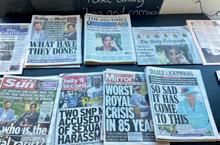

politics de politiek
to reach bereiken
responsible verantwoordelijk
a rumour een gerucht, roddel
to share delen


a story een verhaal
true waar, werkelijk
the truth de waarheid
valuable waardevol

an avatar een avatar, digitaal personage

to be able in staat zijn, kunnen
to chat chatten

to copy kopiëren
to cover bedekken
dangerous gevaarlijk
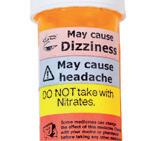
to email e-mailen
an email een e-mail



a generation een generatie
to imagine zich inbeelden
the imagination de verbeelding



to interact communiceren

a library een bibliotheek

to paste plakken
a code een code shy verlegen






WordsTranslation
a contesteen wedstrijd
to controlbeheersen, besturen control controle to createcreëren, maken
a creationeen creatie, ontwerp to designontwerpen
a design een ontwerp to fit inerbij horen
a limit een grens, limiet
onlineonline
the real world de echte wereld to save redden social skills sociale vaardigheden
the softwarede software
teleportation teleportatie (verdwijnen op de ene plek en verschijnen op de andere)
a transfer een transfer, verplaatsing
a universeeen universum
a worldeen wereld
My notes
Singular
1 The positive form of the past simple
1 I kissed Joe
2 You missed the train.
3 He played football. She worked late. It barked at her
1 We helped him.
Plural
2 You watched TV.
3 They cleaned the house
Mind!
I liked it.
He tried to win.
She slipped on the floor
= the base form + ed
You travelled to Rio. She controlled the climate. We dialled the wrong number.
= the base form ends in -e + d
= the base form ends in a consonant + y - y + ied
= the base form ends in a stressed vowel double consonant + ed + 1 consonant
= the base form ends in a consonant + -el, -ol, -al double l + ed
(!) They played online games. the base form + ed
2 The negative form of the past simple (+) Long form (–) Short form (–)
I kissed Joe.I did not kiss Joe.I didn’t kiss Joe
You missed the train. You did not miss the train. You didn’t miss the train.
Simon played football.He did not play football.He didn’t play football.
Sarah worked late.She did not work late.She didn’t work late.
The dog barked at her.It did not bark at her.It didn’t bark at her
Lou and I studied yesterday.We did not study yesterday.We didn’t study yesterday. You both watched TV. You did not watch TV. You didn’t watch TV.
Mo and Joe lived in NZ.They did not live in NZ.They didn’t live in NZ.
Question
Did I kiss Joe?
Did you miss the train?
Did he play football?
Did she work late?
Short answer
Yes, you did No, you didn’t Yes, I did No, I didn’t
Yes, he did No, he didn’t
Yes, she did No, she didn’t Yes, it did No, it didn’t
Did it bark at her?
Did we study yesterday?
Did you watch TV?
Did they live in NZ?
Rule: Did + subject + base form
4 WH-questions
1 WH-questions with ‘to be’
Yes, you did No, you didn’t Yes, we did No, we didn’t Yes, they did No, they didn’t
Yes, subject + did No, subject + didn’t
Question Answer
When were you born?
Why was he sad?
How was prom?
(I was born) on 1st November. (He was sad) because his PSP broke down. (It was) just magnificent!
Rule: WH-word + past simple of to be + subject (+ rest of the sentence) + ?
2 WH-questions with other verbs
Question Answer
Where did Thomas go to?
How did you get here?
Who did you help?
(He went) to the cinema.
(I got here) by car. (I helped) Cathy.
Rule: WH-word + did + subject + base form (+ rest of the sentence) + ?
Question
Long answer
Short answer
What happened to the Titanic?
Who played frisbee? The Titanic sank. Sam played frisbee. It sank. Sam did.
Rule: Who/What + past simple + (rest of the sentence) + ?
You use the past simple for actions that happened in the past and that are completely over.
Yesterday, I played online video games.
In 2019, my mother stopped tap dancing.
Last week, my friends and I organised a party.
Three days ago, I chatted with my friend in America.
You use ‘used to’ to say that something was true in the past, but is no longer true in the present.
When I was a child, I used to play with Lego. (But, I don’t play with them now.)
Rule: used to + base form
When my parents were young, they didn’t use to have internet. (But, they do have internet now.)
Rule: didn’t use to + base form
Did you use to play sports? No, I didn’t Yes, I did
Rule: Did + subject + use to + base form (+ rest of the sentence) + ?
Where did he use to live ? He used to live in London.
Rule: WH-word + did + subject + use to + base form (+ rest of the sentence) + ?
InfinitivePast simple Translation to be was – were zijn to become became worden to begin began beginnen to bring brought brengen to buy bought kopen to choose chose kiezen to come came komen to do did doen to drink drank drinken to drive drove rijden to eat ate eten to fall fell vallen
to feel felt voelen to find found vinden
InfinitivePast simple Translation to lose lost verliezen to make made maken to meet met ontmoeten to pay paid betalen to put put zetten to read read lezen to ride rode rijden to run ran rennen to say said zeggen to see saw zien to sell sold verkopen to send sent verzenden to sing sang zingen
to sit sat zitten
to fly flew vliegen to forget forgot vergeten
to get got krijgen, nemen to give gave geven to go went gaan to have had hebben to hear heard horen to keep kept houden to know knew weten
to leave left weggaan, verlaten
to sleep slept slapen
to speak spoke spreken
to stand stood staan
to swim swam zwemmen to take took nemen
to teach taught onderwijzen to tell told vertellen
to think thought denken
to understand understood begrijpen to wear wore dragen
to write wrote schrijven

1 What do you see in the picture?
2 Which words that are related to the picture do you already know?
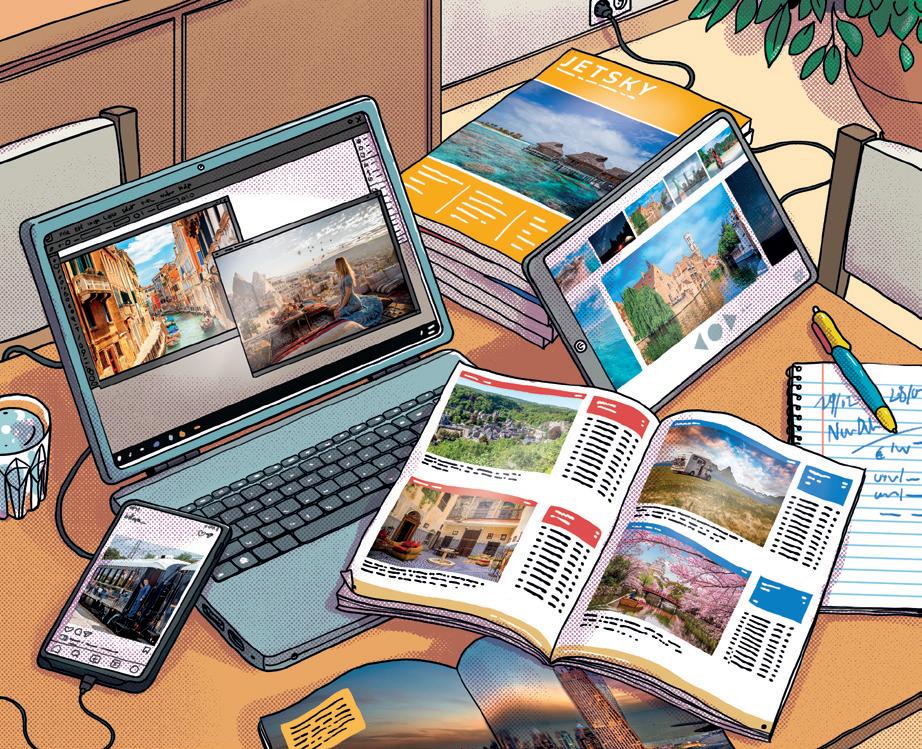
3 Watch the video. What do you want to learn about in this unit?
1 Read the text.
http://www.oneikathetraveller.com/afford-bucket-list-trips.html

Dune-bashing in Dubai. Hiking to Machu Picchu in Peru. Marvelling at the Taj Mahal in India. Going on a safari in South Africa. While it sounds like an excerpt from a brochure, these are just a handful of the experiences I’ve been able to check off my personal bucket list for travel.
Hi, my name is Oneika and in a typical year, I eat, sleep, and breathe travel. There’s something about being somewhere new, seeing something different, and learning about different customs, cultures, and traditions that just … gets me. But if you’ve followed me for any amount of time, you’ll also know that I’ve shifted my focus to bucket list trips and experiences. I mean, in my mind, if I’m getting on a plane, train, or automobile I might as well go big before I go home, amirite?!
Practically, this means that I didn’t just visit Victoria Falls, I low-key swam in it (and bungee jumped off the Victoria Falls Bridge, but that’s a story for another day).
I’ve also slept in a yurt in the Mongolian steppe, ziplined through Costa Rican rainforest, and done high tea too many times to count in London.
to marvel: to admire a priority: what is most important to allocate: to use for a particular purpose
One of the questions I’m asked the most frequently by friends, family, and strangers is how I can afford to travel so much. Here’s my big “secret”: while I’m not rich, I try to allocate the money I do have to trips and experiences. This means that instead of spending money on the latest smartphone or a designer purse, I save it for bucket list adventures abroad … like going to Egypt to see the pyramids of Giza.
I’m also able to save more money because of certain lifestyle choices I’ve made, like not having a car (petrol and insurance are expensive). Because my passion for discovery is of the utmost importance, I’m willing to make little “sacrifices” like not getting cable (I mostly stream on Netflix anyway) or skipping appetizers, and dessert when I go out to eat, so that I have more money to put towards my dream trips. This is a simple, yet effective strategy!
I can’t stress the importance of precise planning when it comes to booking my bucket list travels! Whenever possible, I try to travel to a destination during its off-peak season, so I can not only avoid the crowds, but also take advantage of discounted air fares, attractions, and accommodation. Speaking of accommodation, I often compare the cost of staying in an Airbnb/vacation rental vs. a hotel room, and go with the cheaper option. Depending on my destination, and how much time and money I have to burn, staying in one instead of the other might just make more sense (and help me save more dollars and cents, haha).
In America people use the word ‘vacation’ while in the UK they use ‘holiday’. ‘Holiday’ is also used in American English. Then it means 'feestdag'.
Another strategy that has allowed me to travel more frequently, and at a cheaper rate, has been to chase the deal and not the destination. I try to plan my travels these days based on the cheapest airfares and travel discounts at a given time, and not just based on where I want to go or what I want to experience.
While prioritizing and planning play a fundamental role in my ability to tick items off my travel bucket list, the third, and in my opinion most important, element in this equation is budgeting. I’ll be honest, I’ve always been pretty good with managing my money on my own. But since I started using You Need a Budget to consciously plan for the future, I have a more accurate picture of my finances and better control over when, how, and why I spend my money.
But just what is this magical You Need a Budget, you ask? Well, You Need a Budget (YNAB for short) is an award-winning personal finance software that will teach you how to get out of debt, stop living paycheck-to-paycheck, and save more money, so that you can spend it on the things that matter most to you (travelling, in my case).
an insurance: an arrangement with a company in which you pay them money and they pay the costs if something bad happens utmost: greatest a sacrifice: to give up something for something more important an equation: a complicated situation made up of different parts a debt: money you owe to someone an expense: money you spend on something you need
Personally, You Need a Budget has helped me to create a spending plan so I can prioritize and plan for future travel or major life events. Signing up is extremely easy! Because the interface is so straightforward and clear, within 10 minutes I was able to input all my account details and expenses in order to start a savings plan.
a What is the topic of the text?
b What type of text is this?
c Tick off the purpose(s) of this text. Write your motivation next to the purpose. to give information: to give an opinion: to give instructions: to entertain: to activate:
d Watch the video of one of the activities Oneika has done. Which activity from the text do you see here?
e Complete the grid with the different countries Oneika has been to according to the text. Look up online if necessary.
f Give at least two reasons why Oneika is capable of travelling that much.
g How does her lifestyle affect her savings? Give some examples.
h Have a look at the last paragraph of the text. What does Oneika want to achieve there? Why?
i Do you think Oneika really needs to save a lot to do all of her trips? Explain your answer.
j She advertises You Need a Budget. But what is it exactly? Explain in Dutch.
k Would you live like Oneika in order to travel that much? Discuss in class.
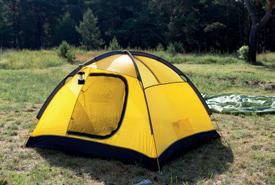
2 Look at the interactive picture and discover the words related to means of transport, and holiday activities and accommodations. Listen to the pronunciation and check the spelling.
3 Write down the name of the holiday accommodation underneath each picture.

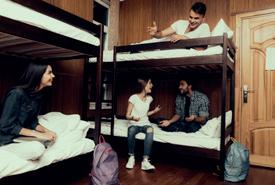
4 Which means of transport can you travel by in the following situations? Sum up as many as possible.
They can travel:
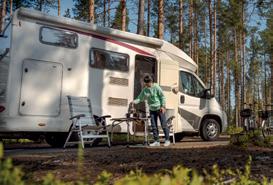
1 I live in the city of London. My work isn’t far from my apartment, but the traffic jams are horrible in the mornings.
2 In order to go from the airport to our hotel in the Maldives (a group of islands in the Indian Ocean), we need to use an unusual form of transport.

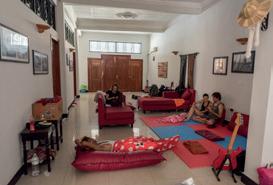
My father doesn’t like to be in traffic jams all the time. 3
I hate public transport.
5 Which activity do you see in the clip?

Do you want more practice? On diddit you can find extra practice materials.
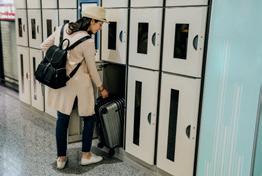

6 Go to the website booking.com. Search for the Amare Beach hotel Ibiza. a Try to match the pictures to the correct word before you read the webpage.
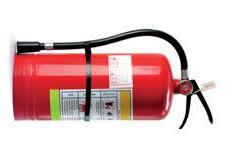



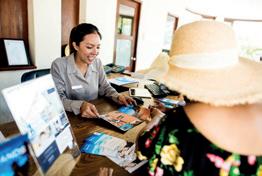



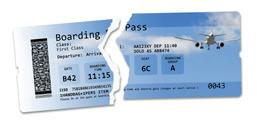
b What do you use the website booking.com for?
c Write down some alternative websites.
d How is this website organised? Put the different parts in the correct order.
room types house rules name + address pictures reviews all facilities
e Why do they use this order do you think?
f Read the webpage.
g Match the words concerning online bookings to their correct definition.
A
someone who has a handicap
something, like a place or equipment, used for a particular purpose or activity B
a plan of what to do in a particular situation C
a plastic card that allows you to enter a place or open a door
a rule that limits what people can do depending on how old they are
money that cannot be paid back to you
paying for something you have not yet received or done
extra money you have to pay for goods or services
h True or false? Explain your answer. True False
1 I can bring my kids aged 14 and 16 to the hotel.
2 If I want to work on my condition, I can do so at the hotel.
3 We need to check out at 11:30 a.m., but our plane leaves at 8 p.m. We need to take our luggage with us everywhere we go.
4 The hotel doesn’t offer full board.
5 If you eat at the hotel, it’s always a buffet format.
6 I am German speaking tourist, and I don’t speak English or Spanish, but the hotel can help me out.
7 I rented a car at the airport, so I will have to park it outside the hotel.
8 I can only eat gluten-free food. I need to bring my own food.
i What’s the difference between twin beds and a king-sized bed?
j What is the difference between the three different room types? Complete the grid.
‘I was here’ ‘Keep the secret’‘Oh la la’ (superior)
You can choose your beds.
22 m² ocean view
k Check the availability of this hotel on the same date as today, next year. Why are there different prices for the same room type?
l Would you stay at this hotel? Why (not)? Be critical. What are you basing your opinion on?
Check: reading Yes I think soNo
Ik kan bookingsinformatie terugvinden op een Engelstalige website.
Ik kan bepalen uit welke rubrieken en in welke volgorde een Engelstalige website is opgebouwd.
Ik kan de betekenis van woorden uit een Engelstalige geschreven tekst afleiden.
Ik kan in het Engels kort mijn mening schrijven over een hotel.
7 Watch the trailer of the show Come fly with me. Highlight the words that are mentioned in the trailer.
luggage
customs
a passenger
an aisle seat
an identity card
a pilot
a flight attendant
a passport
a flight
economy class
a visa
boarding time
business class
a cabin crew
a boarding pass
a departurea (conveyor) belt
a gate an arrival a check-in
first class
hand luggage
a terminal
a window seat
a seat belt
8 Look at the interactive picture and discover the words related to the airport. Listen to the pronunciation and check the spelling.
9 Complete the sentences with the correct word about the airport. Choose from the box. an aisle seat – business class – economy class – a flight attendant – luggage –a window seat
1 When we arrived at our destination we discovered our had been left behind at the airport of departure.
2 Where would you like to sit? Do you prefer an or a ?
3 I always fly , but I hope one day I can fly
4 We had the best on board our flight to Bora Bora. We had some turbulence, but he managed to land the plane safely.
10 Read the sentences. Write a definition for the underlined words. Use an online dictionary.
1 My husband and I went on honeymoon to Cuba. Before we could enter the country, we needed to have a visa.
2 You need to have a passport when travelling outside the EU.
3 I had to show my identity card to get my COVID-19 vaccine.
11 Watch the trailer from exercise 7 again and solve the questions.
a What type of show is Come fly with me?
a documentary
a mockumentary
a reality show
a chat show
b After watching the trailer, what do you think is typical for this type of show?
c Give two examples of how the makers present their characters as caricatures.
12 When at the airport you need to go through a security check. Watch the video.
a You are travelling abroad and are taking the following items with you:
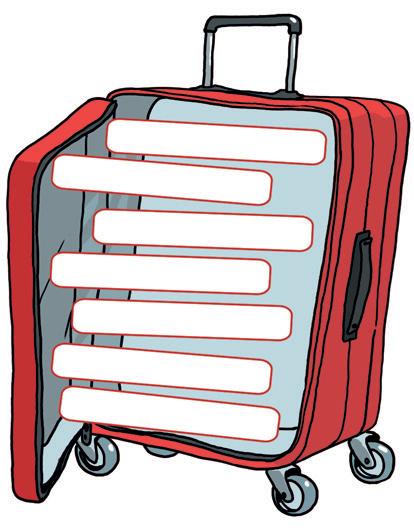
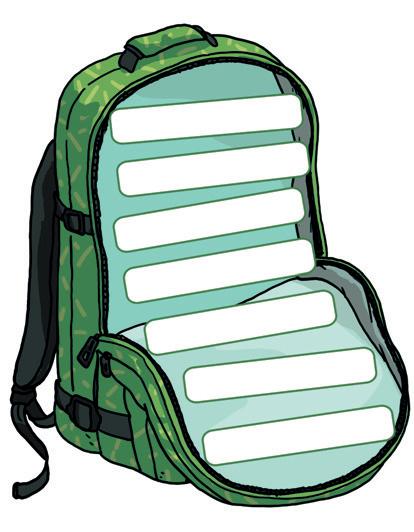
a book – syrup (150 ml) – deodorant (150 ml) – dresses – keys – medication –(a bottle of) perfume (100 ml, duty free) – shoes – shower gel (150 ml) – a sweater –a tablet – (a tube of) toothpaste (75 mg) – T-shirts
Which items should you put in your hand luggage, and which items in your checked luggage? Write them in the correct picture.
b Highlight the item(s) you have to put in a transparent plastic bag.
13 The airport can be a maze sometimes. Luckily, there are universal signs to help you find your way. Look at the signs.
Where do you need to go to if …
1 your luggage has been left behind?
2 you need dollars instead of euros?
3 you have to pick up your brother from his holiday?
4 you need to withdraw money?
5 police agents are going to search your luggage?
6 you need to collect your luggage when you’ve arrived?
7 you don’t want to rent a car, but need to get to your hotel?
8 you need to board your airplane?
9 you don’t know where your gate is?
Check: vocabulary ‘the airport’
Yes I think soNo Ik ken in het Engels woorden rond de luchthaven.
14 Have a look at the following sentences. Our Brussels Airlines flight is leaving at 9 a.m. tomorrow.
I am travelling business class when I fly to New York next week.
Where are you flying to with us today?
a Highlight the verb forms in the sentences.
b Which tense is used? present simple past simple present continuous past continuous
c Why is this tense used here? to describe what people are doing right now to describe what people were doing at a specific time to describe what people will be doing in the future
d Which tense do you use for:
1 a weather forecast (prediction)?
2 a fortune teller (prediction)?
3 plans for next weekend (intention)?
4 a doctor’s appointment (set plan)?
5 a hotel reservation (set plan)?
15 Have a look at the grid to discover when to use the present continuous as a future tense.
When to use the present continuous as a future tense?
You use the present continuous as a future tense when you talk about a set plan: a plan you made (arranged) with another person at a specific time in the future.
I am having a party tomorrow at 8 p.m. Our flight got cancelled. We aren’t flying today When is he seeing his doctor?
Possible time indicators are:
• tomorrow • any other specific date, hour or time:
• next week e.g. at 7 p.m. e.g. on 5th August
16 Complete the text with a present continuous of the verbs between brackets.
1
Oneika’s blog really inspired us! After years of planning and saving, we (to travel) to Tanzania. My boyfriend and I have already planned everything.
On the day of arrival, a van (to pick) us up from the airport and (to take) us to our resort.
There we are going to rest a little bit and then we (to have) a delicious 4-course diner. The next morning, the first day trip is planned. We (to go) on a safari. I hope I see the big five!
On day three we (to go) to Dar Es Salaam, one of the main cities of Tanzania. There we (to explore) the different cultures and flavours Tanzania has to offer us.
The remaining three days we are going to enjoy the different facilities of our resort. I (to have) a massage on day 4, my boyfriend (to scuba dive) on day 5, and on day 6 we booked a wellness treatment. I so (to look) forward to it! I cannot wait to leave.
17 Do you remember when to use the future simple and the going-to future? You can scan the QR code to refresh your memory.
18 Fill in the sentences with a correct tense from the verb between brackets. Use the present continuous, future simple or going-to future.
1 Wait, I (to carry) that heavy bag for you.
2 Tom believes 2024 (to be) his year.
REMEMBER?
3 Hurry up, the plane (to leave) in 15 minutes!
4 Oh, I completely forgot his birthday. I (to wish) him a happy birthday immediately.
5 I’m sorry, we can’t come to your party. We (to have) a wedding party tomorrow evening.
6 My New Year’s resolution is that I (to try) to exercise more.
Check: present continuous as a future tense
Ik ken de ‘present continuous’ als toekomende tijd.
Ik weet wanneer ik de ‘present continuous’, de ‘future simple’ en de ‘going-to future’ als toekomende tijd moet gebruiken.
Checklist: learning about bookings
Wat kan ik al?
Yes I think soNo
©VANIN
Wat lukt nog niet goed? Wat moet ik doen om dat onderdeel beter te kunnen?
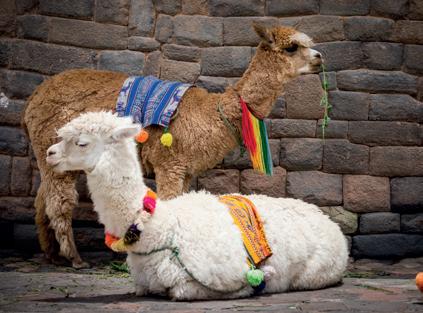
1 Read the email.
My husband and I had the bad luck of staying at your hotel from 28th May to 4th June in room number 43. During our stay, we found many of your service levels disappointing.
First, it took more than an hour to check us in even though we had a confirmed reservation. While we were waiting, no one even offered us a complimentary drink whatsoever.
Why it took so long is beyond my comprehension. When I asked the reception staff about the reason for the delay, they were too busy talking about their weekend activities. Very unprofessional for a hotel of your calibre. Eventually, they said it was because the previous guests checked out late.
Secondly, I was extremely shocked when we entered the room. The bed linen hadn’t been replaced, our mini-bar was empty and the bathrooms were still dirty. I wonder what housecleaning does exactly to prepare the room for the next guests.
Finally, we booked a junior suite but we got a standard double room. When I referred to this problem at the reception, they told me there wasn’t a junior suite available. We were extremely disappointed no one was willing or able to help us out.
I hope that you agree with me that this type of service is completely unacceptable on so many levels. It is not the kind of treatment I would have expected from a five-star hotel. This holiday should have been relaxing, but instead we returned home stressed and frustrated.
I would like to hear your thoughts about my complaint and the steps you are going to take to refund our room costs, and to prevent such incidents in the future.
Kind regards
Thomas Peterson+44 911 123 456
a What type of email is this?

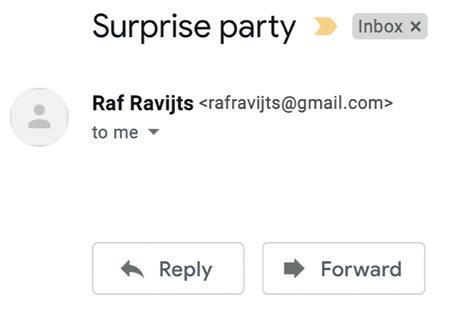


b What does Thomas Peterson want to achieve?
c How does he want to achieve that?
2 Reread this sentence from the email. While we were waiting, no one even offered us a complimentary drink whatsoever.
a Complete the statements.
1 The tense of verb number 1 is called the present continuous / past continuous.
2 The tense of verb number 2 is called the
b When do you use these tenses? Write the correct number in front of each statement. This is an action at a certain time in the past that is completely over. This is an action that was going on during a certain time in the past.
This is a longer action.
This is a shorter action.
3 Have a look at the grid to discover how to use the past continuous.
How to use the past continuous?
1 Positive form
I was waiting for the bus. a past simple form of to be (was/were)
We were waiting for the bus. + base form + ing
2 Negative form
He was not waiting for the bus. They were not waiting for the bus.
You can also use the short form: wasn’t and weren’t.
3 Questions
Were you waiting for the bus? Yes, I was. No, I wasn’t. Yes, we were. No, we weren’t. How long was he waiting for the bus? (He was waiting) for an hour. Who was waiting for the bus? My brother was.
4 Look at the interactive picture to discover when to use the past simple and the past continuous.
Now take a look at the grammar grid on the next page.
The past simple is used to express short actions in the past. The past continuous is used for the longer actions.
short action
long action
While we were waiting, no one offered us a drink. long action short action
‘When’ is often combined with the past simple ‘While’ is often combined with the past continuous
5 Past simple or past continuous? Highlight the correct form.
Yesterday, my best friend, Elly, called / was calling me, while I worked / was working Elly was completely upset. She did / was doing a road trip with her boyfriend in Australia. When I asked / was asking her what was wrong, she told me (in between tears) that her boyfriend had broken up with her. I was in shock!
Elly told / was telling me that they had met a couple on holiday. They got along pretty well and decided / were deciding to join up on their road trip. Apparently, Elly’s boyfriend and the girl from the other couple got along too well. While Elly slept / was sleeping, Elly’s boyfriend secretly hooked up / was hooking up with his new lover. Elly has never felt so betrayed in her life.

6 Read the short travel story and fill in the correct missing tense. Use the past simple or the past continuous.
http://www.jessieonajourney.com
One of my most embarrassing funny stories (to happen) while I (to backpack) in South America – specifically during a 4×4 tour from San Pedro de Atacama in Chile to Uyuni, Bolivia.
The trip takes you through the desert for three days to see dreamy sites like hot pink lagoons where flamingos search for food, an abandoned train graveyard, and, the highlight, the world-famous Uyuni Salt Flats.

During the trip, you share a car with four or five other people. At one point, I (to sit) in the front seat, and it (to get) really hot in the car. Our driver (not to speak) English, but I (to speak) decent Spanish – or at least I thought I did. 'Estoy caliente!' I (to say), while I (to look) right at the driver. To my confusion, instead of rolling down a window, he (to look) horrified … or maybe confused?
I (to decide) it was probably my New York accent confusing him. 'Estoy caliente!' I (to say) again, this time in what I thought was a more local-sounding accent. He (to look) even more horrified-slashed-confused.
Suddenly, the one native Spanish speaker in the car (to speak up) from the back: 'Umm, I’m assuming you’re not meaning to tell the driver you’re horny, right?'
Apparently, the way I (to say) 'I’m hot' literally translated to, well, another meaning of the phrase. As I (to turn) bright red, I (to decide) I didn’t really need the window open and would just sit in silence and try to disappear by melting in the car seat.
But hey, when it comes to learning a language while travelling, embarrassing mistakes can certainly be a great teacher. Plus, I can add this to my list of hilarious vacation stories to share at parties.
Adapted from: jessieonajourney.com
a Read the title. What type of text is this?
b Read the text. Fill in the missing tense of the verbs from the box. Use the past simple or the past continuous.
Review of Ikos Dassia
LuckeeeeeeyReviewed August 15, 2022
We have just returned from two amazing weeks at Ikos Dassia and have not experienced service like it – even at other Ikos resorts. A lot of that is due to one man: the incredible Thanos, who is simply outstanding and a huge asset to the company. Thanos was on hand to help with bookings, send treats to our room, help us with some special occasions and offer tips and help. Nothing was too much trouble and he was incredibly professional, personable and discreet –thank you Thanos!

We in a 2 bedroom suite with private pool and the room was perfect. The pool is larger than it appears in the photos so we most days there, but the children also the main pool and the deluxe pool was also nice and very quiet. The rooms were modern and well appointed.
The food was incredible. We at every restaurant at least once and loved them all. Anaya was probably the family favourite but we also Kerkyra as the setting is beautiful and Provence was amazing for a meal without the children! The beach dinner was also fantastic. The wine tasting was good fun as well and the bar service was great everywhere.
We were upgraded by Thanos for our final three days to the 3 bedroom villa, which has an insane amount of outside space. It is very private and was a great treat but it a bit remote, though buggy service to/from the main hotel areas was great.
We also the shuttle service into Corfu town. While the children some water sports, my wife the spa.
It’s hard to find anything to grumble about. The only thing is that there was some noise from other hotels/bars and non-hotel guests on the beach on some nights well into the early hours. That’s largely outside the control of Ikos but maybe the rooms very near the beach would benefit from better sound proofing.
All told though, a truly amazing experience and we would love to return, once we have saved up some more cash and got the waistline back down after two weeks of bliss!
Date of stay: August 2022
See all 3,090 reviews
Adapted from: tripadvisor.com
c What is the main purpose of the text? Tick off the correct answer. to give information to give an opinion to entertain to persuade
d Indicate the following parts of a review by writing the correct number next to the paragraph(s) of the review.
1 Introduction: What is the review about? (Where did you stay?) What was your overall feeling?
2 Middle: examples that support your overall feeling (rooms, food, facilities, staff ...)
3 Ending: an extra positive or negative aspect that stood out
4 Conclusion: the general verdict (Would you recommend staying at the hotel? Would you return? ...)

Check: past simple and past continuous
Ik kan de ‘past simple’ en ‘past continuous’ correct vormen.
Ik weet wanneer ik de ‘past simple’ en de ‘past continuous’ moet gebruiken.
Ik ken de verschillende onderdelen van een review.
8 Look at the other red words in the email of complaint (p. 202).
a Why do you use them in a sentence? Discuss in class.
b Circle these word types in the review above.
Yes I think soNo
9 Have a look at the grammar grid and discover how to connect sentences.
To connect two or more sentences you use linking words:
• e.g. I was late for school. I overslept.
I was late for school because I overslept.
• e.g. I didn’t understand the exercise. My father helped me. I didn’t understand the exercise so my father helped me.
and We went downstairs and (we) ate something. but The holiday was great but we were happy to go home. so The room we booked was occupied so they gave us an upgrade. or Are you travelling by plane or (are you travelling) by car? because I am flying to London because I am going to visit my brother. if I am going to go on a world trip if I win the lottery. until Don’t go into the pool until the others have arrived. while I was reading a book while my boyfriend was sleeping.
10 Fill in the linking words in the sentences.
1 Jane stayed in the jungle she loved Tarzan.
2 I was sleeping, my mother was making breakfast.
3 George forgot to set his alarm, overslept.
4 I won’t go to work it keeps on raining.
5 I will stay with my husband I die.
6 My friends cannot come to my party, I cancelled it.
7 Is he arriving leaving?
8 The spaghetti was great I prefer the one my mother makes.
9 Dad cleaned the kitchen mum was taking a bath.
10 you don't take your medicine, you won't get better.
Check: linking words Yes I think soNo Ik kan in het Engels zinnen verbinden met ‘linking words’.

11 Watch the video and solve the questions.
a What is the topic of the video?
b Describe the purpose of the video.
c True or false? Explain your answer. True False
1 There are two different prices for basic tickets.
2 A pearl is a way of paying at the festival.
3 You always need to pay with your card.
4 Mike stayed at the festival campsite.
5 Most festival goers are from Belgium.
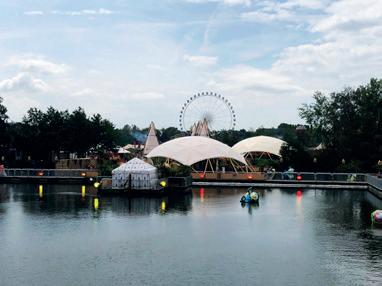
6 Mike feels very safe at the festival.
d How much is one pearl worth?
e What’s the name of the campsite?
f Where would Mike spend his morning?
g What was Mike’s first impression (before he went to the festival)?
h Sum up three reasons why the festival was worth the hype.
i What other festivals do you know of?
j Use the internet to look up information about these popular festivals. Fill in the grid.
Where?
When?
Basic ticket price?
k Which festival do you prefer and why? Discuss in class.
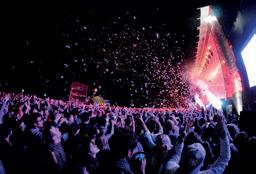


Check: watching Yes I think soNo
Ik kan relevante informatie uit een Engelstalige gesproken tekst halen.
Ik kan het doel van een Engelstalige gesproken tekst bepalen.
Checklist: learning how to give your opinion
Wat kan ik al?
Wat lukt nog niet goed? Wat moet ik doen om dat onderdeel beter te kunnen?
1 Fill in the missing words concerning holiday accommodation, activities, and means of transport. The first letter is already given.
1 The Orient Express is a long distance t on which passengers can sleep and go to a restaurant.
2 Beyoncé sometimes spends her summer holiday z over the rainforest in Costa Rica.
3 When I’m in London, Paris or New York, I always take the u I once took a t and it took me over an hour to go 3 km!
4 My teenage son loves travelling. He’s on a budget so he always stays in a h
5 I would just love to g in Tanzania to see the Big Five: an elephant, a lion, a buffalo, a rhino and a leopard.
6 When we visit France, we always stay in a B : we sleep there, and get to practise our French while having breakfast with the other guests.
ex. 1 Ik kan in het Engels woorden gebruiken rond verblijven, vakantieactiviteiten en vervoersmiddelen. Yes I think soNo
Time to catch up? ex. 1 Time to get ahead? ex. 6
2 Read the definitions. Write down the correct word concerning ‘travelling’ and ‘at the airport’ behind each definition.
1 the cases, bags etc. you carry when you are travelling
2 the place where you leave an airport building to get on a plane
3 an official card that you have to show before you go on a plane
4 a large part of a building where people get on or off airplanes, busses ...
5 the place where you sit in an airplane if you don’t like sitting at the window
6 an official mark put on your passport that gives you permission to temporarily enter or leave a foreign country
ex. 2 Ik kan in het Engels woorden gebruiken rond reizen. Yes I think soNo
Time to catch up? ex. 2 Time to get ahead? ex. 7
3 Complete the sentences with a correct tense from the verb between brackets. Use the present continuous, future simple or going-to future.
1 We (to go) to London next week.
2 My mother believes I (to get) a promotion.
3 Look at those clouds! I think it (to rain).
4 I (to see) my dentist tomorrow.
5 Wait! I (to bring) you a glass of water.
6 When he turns 18, he (to buy) a new car.
7 I (to watch) the new Margot Robbie film next weekend.
ex. 3 Ik kan de ‘future simple’, ‘going-to future’ en ‘present continuous’ als toekomende tijd gebruiken. Yes I think soNo Time to catch up? ex. 3 Time to get ahead? ex. 8
4 Complete the following sentences with a past simple or a past continuous.
1 I (to do) my homework, when he (to text) me.
2 The morning of the exam, I (to get up), (to take) a shower, (to go) downstairs, (to eat) some cereal, and (to leave) for school.
3 What (you, to do) when the accident (to happen)?
4 When I (to walk) into the office, everyone (to work).
5 At 8 p.m. yesterday evening, my parents and I (to play) a board game.
6 We (to wait) at the airport when our plane (to be) delayed.
7 It (to be) the last day of May. The birds (to sing), the sun (to shine), and our children (to play) outside in the garden.
8 Tom and his friend (to paint) the room, when Tom (to fall) off his ladder.
ex. 4 Ik kan de ‘past simple’ en ‘past continuous’ correct gebruiken. Yes I think soNo Time to catch up? ex. 4 Time to get ahead? ex. 9
5 Match the sentence parts by using the correct linking word from the box below. Write down the new formed sentences.
Sentence parts
It was a long trip
He wanted to zipline
at the last moment he was afraid of heights.
Our flight will be cancelled
Shall I go to Spain travelling.
We love eating
I need some vitamin D.
I am very tired. Greece? it keeps on snowing.
I hiked The plane caught fire because
I was breathless. it was landing.
I need some sun
but if
©VANIN
ex. 5 Ik kan in het Engels zinnen verbinden met ‘linking words’. Yes I think soNo Time to catch up? ex. 5 Time to get ahead? ex. 10
Ready? Tick off the exercises you have to do on page 214-222.
and or two hundred and thirteen
so until
Score ex. 1 < 6


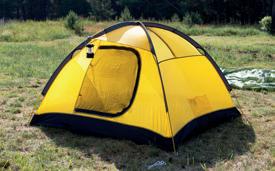

Score ex. 2 < 6
Well done!
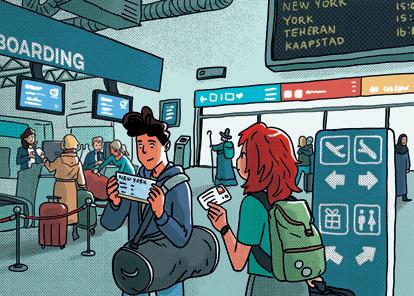




Well done!

3 Highlight the correct future tense.
1 I think I am going to watch / am watching the new Avatar film this weekend.
2 Stop! I am going to help you / will help you.
3 We are leaving / are going to leave tomorrow morning for Paris.
4 Next week, I am taking / will take my driving test. I hope I am going to / will pass!
5 Prince William will become / is becoming King one day.
Score ex. 3 < 4 >/= 4
Well done!
4 Use the past simple or past continuous to complete the sentences.
a Highlight the signal words in the sentences.
b Put the verbs between brackets in the past simple or past continuous.
1 While I (to sleep), burglars (to break) into our house.
2 When my brother (to call), I (to eat) toast.
3 While Bradd (to take) a shower, his brother (to get up) and (to come) downstairs.
4 We (to decorate) the Christmas tree, when it (to start) snowing.
See p. 234
5 Thomas (to study) and (to listen) to music when I (to enter) his room.
Score ex. 4 < 12 >/= 12
Well done!
5 Complete the sentences with the correct linking word. Choose from: and – because – but – if – or – so – until – while
1 We went back home our flight got cancelled.
2 I waited the plane had landed to turn on my mobile phone.
3 Jack loves travelling he booked a holiday to Costa Rica.
4 Jolene and Jonathan went on a holiday together came back engaged.
5 They like travelling by car, prefer travelling by train.
6 Messi is going to buy a new yacht he wins the first match of the season.
7 Do you prefer hiking ziplining?
8 Tom was sipping cocktails at the pool, I was surfing.
Score ex. 5 < 6 >/= 6
Well done!
6 Have a look at these local types of transportation. Match the pictures to the correct means of transport.
a norry: an improvised rail vehicle in Cambodia, also sometimes referred to as ‘bamboo train’
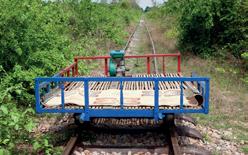
a cable car: a vehicle that hangs from and moves along a cable; often used in the mountains

a camel: an animal with a long neck and two humps that lives in the desert

a central-mid-level escalator: the world's longest outdoor covered escalator system in Hong Kong (a walkway system)
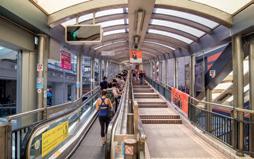
a dog sledge: a sledge pulled by dogs
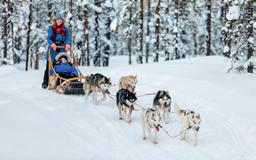
a gondola: a narrow boat used on the canals in Venice

a jeepney: a small bus colourfully decorated, created by converting a jeep 7

a junk: a type of Chinese sailing ship 8

a rickshaw: a small two-wheeled carriage pulled by a man 9
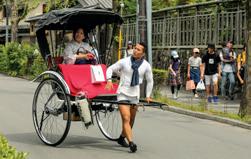
a totora boat: a traditional fishing boat from Peru, made out of totora reeds 10
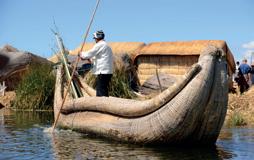
a tuktuk: a vehicle with an engine and three wheels often used as a taxi 11

7 Listen to this song by Vengaboys.
a Complete the lyrics.
I don't want to be a All my life
I'm going to pack my bags and leave this town
Grab a
Fly away on Venga
Fly me high
Ibiza sky
I look up at the And I see the
I look down at the ground
And I see the down the drain
Fly away on Venga
Fly me high
Ibiza sky
Whoa! We're going to Ibiza
Whoa! Back to the
Whoa! We're going to have a party
Whoa! In the Mediterranean
Far away from this big town And the rain
It's really very nice to be again
Fly away on Venga
Fly me high, Ibiza sky
Whoa! We're going to Ibiza


Whoa! Back to the
Whoa! We're going to have a party
Whoa! In the Mediterranean
b Where are the Vengaboys going to?
c Look online to answer these questions:
1 Where is the island located?
2 Go to booking.com and select a hotel in Ibiza. Write down the name of the hotel you chose:
3 Look up all the types of transport you need to use to get from your home to your hotel. Complete the route. Tip: you can also use Google Maps to find public transport routes.
Home:
by/on:
To: Hotel
4 What can you do at this destination? Think of activities, sports, things to see, etc.
5 Would you visit this island? Why (not)? Write down what attracts you to it, or what doesn’t appeal to you.
6 Discuss your findings with a fellow student.
8 What are your plans this summer holiday?
a Fill in the boxes. Use the correct future tense in your answer.
Things you have already planned to do
Things you expect to do
Things you intend to do
b Tell your partner about it. Your partner reports to the class.
9 Read the titles of the extract of the novel The Beach by Alex Garland.

a What do you think the book will be about, based on the title(s)?
b Do you think it will be a funny book? Why (not)?
c Read the extract. Put the verbs between brackets in the past simple or past continuous form.
The first I (to hear) of the beach (to be) in Bangkok, on the Khao San Road. Khao San Road (to be) backpacker land. Almost all the buildings had been converted into guest-houses, there (to be) long-distance-telephone booths with air-con, the cafés (to show) brand new Hollywood films on video, and you couldn’t walk ten feet without passing a bootleg-tape stall. The main function of the street (to be) a decompression chamber for those about to leave or enter Thailand, a halfway house between East and West. I’d landed at Bangkok in the late afternoon, and by the time I (to get) to Khao San it (to be) dark. My taxi driver (to wink) and (to tell) me that at one end of the street (to be) a police station, so I (to ask) him to drop me off at the other end.
I (not to plan) on crime but I (to want) to oblige his conspiratorial charm. Not that it (to make) much difference which end one (to stay) because the police obviously (not to be) active.
to convert: to change a bootleg-tape stall: a shop with illegally made (copied) tapes decompression: removing harmful pressure to wink: to close one eye for a short time to oblige: (here) to be helpful conspiratorial: showing that you share a secret
I (to catch) the smell of grass as soon as I (to get out) of the cab, and half the travellers who (to weave) past me (to be) stoned. He (to leave) me outside a guest-house with an eating area open to the street. As I (to study) it, I was (to check) the clientele to gauge what kind of place it (to be), a thin man at the table nearest me (to lean) over and (to touch) my arm. I (to glance) down. He (to be), I (to guess), one of the heroin hippies that float around India and Thailand. He’d probably come to Asia ten years ago and (to turn) an occasional dabble into an addiction. His skin (to be) old, though I’d have believed he (to be) in his thirties. The way he (to look) at me, I had the feeling I (to be) sized up as someone to rip off.
to weave: to move quickly to gauge: to judge a dabble: a short try
d What type of travellers like going to Khao San Road?

e Would you advise families with kids to travel to Khao San? Why (not)?
f At what type of accommodation does the taxi driver drop off the main character?
g Read the summary of the book online. Would you like to read it? Why (not)?
10 First, reread the blog post by Oneika from Story time 1 (p. 189). Then, visit her website.
a What’s your first impression of her website?
b Do you think she makes a living out of her blog? Why (not)?
c Besides being a blog writer, what else does she do for a living?
d Does she seem reliable? Give three arguments why she does, and one argument why she doesn’t. She seems reliable, because: She doesn’t seem reliable, because
e Go to Oneika's blog post, read it and choose one of her travel tips. Answer the questions.
1 Which tip(s) do you agree with? Why?
2 Which tip(s) do you disagree with? Why?
3 Is there a tip you would use as well? Why (not)? If so, which tip?
4 Think of an extra tip about the blog post topic that Oneika hasn’t mentioned, and write it down.
5 Compare your answers with a classmate’s. Discuss what you (dis)agree with.
1
CAMBODIA – As the world’s greatest temple to the Hindu god Vishnu, Angkor Wat might seem a bit off the grid in Buddhist Cambodia, but this magnificent monument is the greatest treasure of a Hindu kingdom that once stretched as far as Burma, Laos and southern China. Angkor is something out of the ordinary – a little bit of heaven on Earth.
International flights drop into nearby Siem Reap, so it would be hard to describe Angkor as ‘undiscovered’, yet every visitor who steps among the ruin, where tree roots tear through ancient walls and the heads of forgotten goddesses poke out from between the vines, feels like Indiana Jones.

off the grid: not connected to the main supply of electricity, gas, or water to stretch: to cover a large area of land
out of the ordinary: unusual or unexpected
a tree root: a part of a tree that grows under the ground to tear: to damage, to rip a vine: a type of plant that climbs to be reclaimed: to get back
More than anything else, Angkor is a powerful reminder of the ambitions of human creativity, the human need to leave something behind forever, and the very Buddhist realisation that nothing material is eternal, and that given time, all will be reclaimed by the jungle.

AUSTRALIA – Second place in our list goes to a natural wonder stretching for more than 3,000 km up to the north-eastern coast of Australia. The Great Barrier Reef hardly needs an introduction. But here are some facts: this is the world’s largest network of coral reefs, with 400 types of coral and 1,500 species of fish.

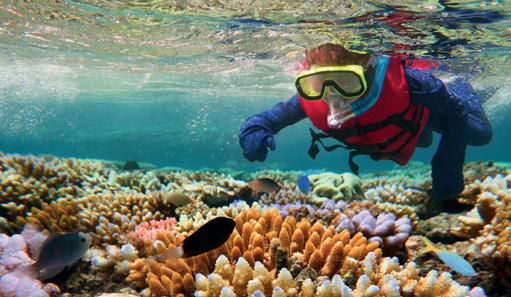

Some 30 kinds of whales, dolphins and porpoises have been spotted here, along with six species of sea turtles and 17 kinds of sea snake. If that doesn’t convince you to get on a plane to Oz, there’s this: this reef may not be around for much longer, at least in its present state. Rising sea temperatures have been bleaching and killing the coral, and the trend shows no sign of stopping. But for now, the reef is an underwater playground for divers and snorkellers. Even above the surface, and closer to the Queensland coast, this ecosystem charms all who visit, with a great number of bird life and countless tropical islands and beaches.
a species: a group of animals or plants a porpoise: a sea animal that looks like a dolphin and breathes air to bleach: to make something pale or white the surface: the top layer of an area of water or land
10

Hiram Bingham, the American amateur-archaeologist who came across the ruins in 1911 and spent years excavating them, didn’t know what he was looking at. Today, you can wander wide-eyed around the mysterious mountain metropolis, forming your own ideas.
a rite of passage: a special action that is a sign of a new stage in someone’s life to excavate: to dig carefully to find ancient objects or bones to wander: to walk slowly around an area
a Tick off what is being discussed in every text. the name of the destination how much it costs to visit the best season to go there
b Write the three destinations on the world map.
where the destination is located why you should visit what you should pack for you visit
c Which three destinations are on your bucket list? Indicate them on the map as well.
d Choose one of your top three destinations. Write a short description about it.
e Discuss with a fellow student:
1 Which destination did you choose and why?
2 Ask each other questions about the destination: show interest.
f Report to the class. Tell the teacher and the other students about the destination your neighbour has chosen and why.
2 Your teacher will give you a list of accommodations.
a Visit the website of the accommodation you chose.
b Go back to the Story time (p. 207) and check the different parts of a review again.
c Read the strategy box on how to write a review.
1 Don’t get lost in details.
2 Stick to the main point.
What did you like and what didn’t you like?
3 What was good and what wasn’t? Why?
Comment on the service and facilities: check-in, room, restaurant …
4 Share a helpful tip.
Are there restaurants nearby? Did you meet a friendly hotel staff member?
5 Avoid personal attacks.
6 Use correct grammar, and check your spelling.
d Write a review about your stay. Use: the card the teacher gave you with what you liked and disliked about the accommodation; the information on their website.
See p. 235
Date of stay:
e Read the review your neighbour wrote. Visit the website of the accommodation the review is about. Write a response as a representative of the accommodation.
Response from , Guest Services
How to respond to a review?
How to respond to a positive review?
1 Thank the customer.
e.g. Thank you for your kind words, Brenda.
2 Highlight the positive aspects in your reply.
e.g. High quality service is one of our priorities.
3 Encourage the customer to take action.
e.g. We are looking forward to see you again.
4 Keep it short and authentic.
1 Address the reviewer: Dear (name).
2 Thank the customer for their feedback.
e.g. Thank you for sharing your feedback with us.
3 Apologise for the negative experience.
e.g. We’re sorry that … / We apologise deeply for …
4 Make things right.
e.g. We have made adjustments to … , so this will not happen again. / We are looking into this issue and hope to resolve it promptly.
5 Offer extra communication options.
e.g. If you have any further questions or concerns, you can contact us by … (email, telephone number …).
6 Ask for a second chance.
e.g. We hope you’ll give us another chance to make things right.
3 Plan and present your own city trip.
a You have a budget of € 500 to spend and you are going on a city trip for three days. Do some (online) research to plan your city trip. Choose a city. Be realistic!
Look for the most efficient way to travel to your city.
Write down how much your way of transportation costs. Choose an accommodation: Why did you choose this type of accommodation? Where is it located?
How much does it cost?
What are the facilities? Does it have positive reviews?
Look up three activities to do or see during your trip.
How much do they cost?
When are you doing the activities?
Mind: don’t forget to use the present continuous as a future tense when you are talking about set plans. Pick two places where you would like to eat. Keep your budget in mind. How much is left to spend on food and extras?
b Make a presentation about your city trip. Make sure:
to present all the information from exercise a. to insert pictures.
c Present your city trip to the class.
d When you are watching a fellow student's presentation : Think of a question you want to ask. Write down three questions in total.
1 2
3
Ask your classmate your question(s) when the presentation is finished.
e When you are giving a presentation: answer your fellow students’ questions at the end of your presentation.
f Which city trip would you like to do? Why?
Checklist: your time
Ik kan in het Engels woorden rond reizen gebruiken.
Ik kan in het Engels de juiste toekomende tijd gebruiken: de ‘future simple’, ‘going-to future’ of ‘present continuous’.
Ik kan in het Engels de juiste verleden tijd gebruiken: de ‘past simple’ of ‘past continuous’.
Ik kan in het Engels een korte tekst over een reisbestemming schrijven.
Ik kan in het Engels een gesprek voeren over een reisbestemming, waarbij ik aangeef wat ik (niet) leuk vind en waarmee ik (niet) akkoord ga.
Ik kan in het Engels een korte recensie over een verblijf schrijven.
Ik kan in het Engels gepast reageren op een recensie over een verblijf.
Ik kan in het Engels een citytrip organiseren.
Wat kan ik al?
Wat lukt nog niet goed? Wat moet ik doen om dat onderdeel beter te kunnen?



a B & B (a bed & breakfast) een verblijf met ontbijt a camper van een kampeerbusje
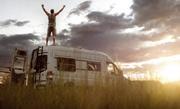

a homestay een gastgezin a hostel een jeugdherberg
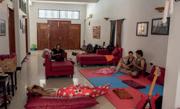
a hotel een hotel
a motor home een mobilhome, kampeerwagen

a (holiday) rental een verblijf dat je huurt a resort een resort

a tent een tent a villa een (vakantie)villa
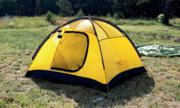
to bungee jump bungeejumpen


to go on a safari op safari gaan
to hike trekken
to travel by (air)plane met het vliegtuig gaan

to zipline afdalen langs een tokkelbaan (zipline)
to travel by bike met de fiets gaan

to travel by boat met de boot gaan
to travel by bus met de bus gaan

to travel by car met de auto gaan


to travel by cruise ship met een cruiseschip reizen

to travel by ferry met de overzetboot gaan

to travel on foot te voet gaan



to travel by helicopter met de helikopter gaan

to travel by motorcycle met de motor gaan

to travel by sailboat met de zeilboot reizen


to travel by taxi met de taxi gaan

to travel by train met de trein gaan

to travel by van met een busje reizen









abroad in het buitenland

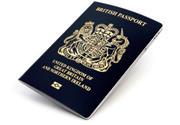

an adventureeen avontuur
an attractioneen attractie


to book boeken, een verblijf reserveren





a bucket listeen bucketlist (een verlanglijstje)
a crowd een menigte
a destinationeen bestemming

an experienceeen ervaring
an off-peak seasoneen laagseizoen

a peak-seasoneen hoogseizoen
a rainforesteen regenwoud
Future simple (will)
Decisions made at the moment
Predictions
e.g. It’s raining! I will take an umbrella.e.g. It’s so cold! I think it will snow today.
Requests Offers
e.g. Will you marry me?
Promises
e.g. I will clean up tomorrow, I promise.
e.g. I will help you, if you want.
Plans made beforehand
e.g. After I finish secondary school, I am going to work in my father’s shop.
Going to
Predictions based on what you see
e.g. Look at those clouds! It is going to rain.
Present continuous
A set plan: a plan you made (arranged) with another person at a specific time in the future
e.g. I am having a party tomorrow at 8 p.m.
e.g. Our flight got cancelled. We aren’t flying today
e.g. When is he seeing his doctor?
Possible time indicators
tomorrow next week
any other specific date, hour or time: e.g. at 7 p.m.
1 The positive form of the past continuous
1 I was waiting for the bus.
Singular
2 You were waiting for the bus.
3 He/She was waiting for the bus. It was waiting
1 We were waiting for the bus.
Plural
2 You were waiting for the bus.
3 They were waiting for the bus.
a past simple form of to be (was/were) + base form + ing
Singular
1 I was not waiting for the bus.
2 You were not waiting for the bus.
3 He/She was not waiting for the bus. It was not waiting
a past simple form of to be (was/were) + not + base form + ing
Plural
1 We were not waiting for the bus.
2 You were not waiting for the bus.
3 They were not waiting for the bus.
You can also use the short form: wasn’t and weren’t
Question
Yes-no questions
Short answer
Were you waiting for the bus? Yes, I was No, I wasn’t Yes, we were No, we weren’t
Was he waiting for the bus? Yes, he was No, he wasn’t
Rule: Was/Were + subject + base form + ing (+ rest of the sentence) + ?
WH-questions
Question Answer
How long was he waiting for the bus?(He was waiting) for an hour.
When were they waiting for the bus?(They were waiting) yesterday.
Rule: WH-word + was/were + subject + base form + ing (+ rest of the sentence) + ?
Question Answer
Who was waiting for the bus? My brother was.
What was going on? The boys were fighting.
Rule: Who/What + was + base form + ing (+ rest of the sentence) + ?
The past simple
= to express short actions in the past (often combined with ‘when’)
e.g. When I asked something, they were too busy talking.
The past continuous
= to express longer actions in the past (often combined with ‘while’)
e.g. While we were waiting, no one offered us a drink.
To connect two or more sentences you use linking words
e.g. I was late for school. I overslept. I was late for school because I overslept.
e.g. I didn’t understand the exercise. My father helped me. I didn’t understand the exercise so my father helped me.
andWe went downstairs and (we) ate something.
butThe holiday was great but we were happy to go home.
soThe room we booked was occupied so they gave us an upgrade.
orAre you travelling by plane or (are you travelling) by car?
becauseI am flying to London because I am going to visit my brother.
ifI am going to go on a world trip if I win the lottery.
untilDon’t go into the pool until the others have arrived.
whileI was reading a book while my boyfriend was sleeping.
1 Introduction
1 Don’t get lost in details.
- What is the review about? (Where did you stay?)
- What was your overall feeling?
2 Middle
Give examples that support your overall feeling (rooms, food, facilities, staff ...).
3 Ending
Mention an extra positive or negative aspect that stood out.
4 Conclusion
Write your general verdict. (Would you recommend staying at the hotel? Would you return? …)
2 Stick to the main point. What did you like and what didn’t you like?
3 What was good and what wasn’t? Why? Comment on the service and facilities: check-in, room, restaurant …
4 Share a helpful tip. Are there restaurants nearby? Did you meet a friendly hotel staff member?
5 Avoid personal attacks.
6 Use correct grammar, and check your spelling.
1 Thank the customer.
e.g. Thank you for your kind words, Brenda.
2 Highlight the positive aspects in your reply.
e.g. High quality service is one of our priorities.
3 Encourage the customer to take action.
e.g. We are looking forward to see you again.
4 Keep it short and authentic.
1 Address the reviewer: Dear (name).
2 Thank the customer for their feedback.
e.g. Thank you for sharing your feedback with us.
3 Apologise for the negative experience.
e.g. We’re sorry that …
e.g. We apologise deeply for …
4 Make things right.
e.g. We have made adjustments to … , so this will not happen again.
e.g. We are looking into this issue and hope to resolve it promptly.
5 Offer extra communication options.
e.g. If you have any further questions or concerns, you can contact us by (email, telephone number …).
6 Ask for a second chance.
e.g. We hope you’ll give us another chance to make things right.